6 Volumes
Recent Convulsions in World Finance
Few people choose to study economics; most people don't want to. But world economics have got in such a state that lots more of us had better give it some thought.
Sociology: Philadelphia and the Quaker Colonies
The early Philadelphia had many faces, its people were varied and interesting; its history turbulent and of lasting importance.
Money
New volume 2012-07-04 13:46:41 description
Philadelphia: Decline and Fall (1900-2060)
The world's richest industrial city in 1900, was defeated and dejected by 1950. Why? Digby Baltzell blamed it on the Quakers. Others blame the Erie Canal, and Andrew Jackson, or maybe Martin van Buren. Some say the city-county consolidation of 1858. Others blame the unions. We rather favor the decline of family business and the rise of the modern corporation in its place.
Second Edition, Greater Savings.
The book, Health Savings Account: Planning for Prosperity is here revised, making N-HSA a completed intermediate step. Whether to go faster to Retired Life is left undecided until it becomes clearer what reception earlier steps receive. There is a difficult transition ahead of any of these proposals. On the other hand, transition must be accomplished, so Congress may prefer more speculation about destination.
Worldwide Common Currency and Corporate Headquarters
The Death of Money
Whither, Federal Reserve? (2)After Our Crash
Whither, Federal Reserve? (2)
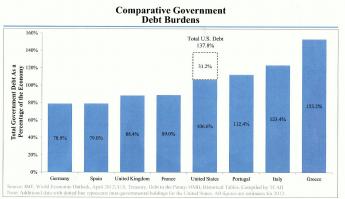 |
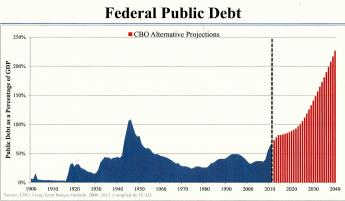 |
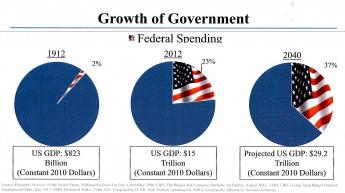 |
Foreground: Parliament Irks the Colonial Merchants

|
| Charles Townshend |
Charles Townshend, Chancellor of the Exchequer under King George III in 1766-67, had a reputation for abrasively witty behavior, in addition to which he did carry a grudge against American colonial legislatures for circumventing his directives when earlier he had been in charge of Colonial Affairs. His most despised action against the Colonies, the Stamp Act, seems to have been only a small part of a political maneuver to frustrate an opposition vote of no confidence. The vote had taken the form of lowering the homeland land tax from four to three shillings (an action understood to be a vote of no confidence because it unbalanced the budget, which he then re-balanced by raising the money in the colonies.) The novelist Tobias Smollett subsequently produced a scathing depiction of Townshend's heedless arrogance in Humphry Clinker, but at least in the case of the Stamp Act, its sting was more in its heedlessness of the colonies than vengeance against them. One can easily imagine the loathing this rich dandy would inspire in sobersides like George Washington and John Adams. After Townshend was elevated in the British cabinet, almost anything became a possibility, but it was a fair guess he might continue to satisfy old scores with the colonies. When King George's mother began urging the young monarch to act like a real king, Townshend was available to help. On the other hand, the Whig party in Parliament had significant sympathy with the colonial position, as a spill-over from their main uproar about John Wilkes which need not concern us here. Vengefulness against the colonies was not widespread in the British government at the time, but colonists could easily believe any Ministry which appointed the likes of Townshend might well abuse power in other ways before such time as the King or a more civilized Ministry could arrive on the scene to set things right. It was vexing that a man so heedless as Townshend could also carry so many grudges. Things did ease when Townshend suddenly died of an "untended fever", in 1767.
Whatever the intent of those Townshend Acts, one clear message did stand out: paper money was forbidden in the colonies. Virginia Cavaliers might be more upset by the 1763 restraints on moving into the Ohio territories, and New England shippers might be most irritated by limits on manufactures in the colonies. But prohibiting paper money seriously damaged all colonial trade. Some merchants protested vigorously, some resorted to smuggling, and others, chiefly Robert Morris, devised clever workarounds for the problems which had been created. Paper currency might be vexingly easy to counterfeit, but it was safer to ship than gold coins. In dangerous ocean voyages, the underlying gold (which the paper money represents) remains in the vaults of the issuer even if the paper representing it is lost at sea. Theft becomes more complicated when money is transported by remittances or promissory notes, so a merchant like Morris would quickly recognize debt paper (essentially, remittance contracts acknowledging the existence of debt) as a way to circumvent such inconveniences. In a few months, we would be at war with England, where adversaries blocking each other's currency would be routine. By that time, Morris had perfected other systems of coping with the money problem. In simplified form, a shipload of flour would be sent abroad and sold, the proceeds of which were then used to buy gunpowder for a return voyage; as long as the two transactions were combined, actual paper money was not needed. Another feature is more sophisticated; by keeping this trade going, short-term loans for one leg of the trip could be transformed into long-term loans for many voyages. Long-term loans pay higher rates of interest than short-term loans; it would nowadays be referred to as "riding the yield curve." This system is currently in wide use for globalized trade, and Lehman Brothers were the main banker for it in 2008. And as a final strategy, having half the round-trip voyage transport innocent cargoes, the merchant could increase personal profits legitimately, while cloaking the existence of the underlying gun running on the opposite leg of the voyage. If the ship is sunk, it can then be difficult to say whether the loss of such a ship was military or commercial, insurable or uninsurable. In the case of a tobacco cargo, the value at the time of departure might well be different from the value later. Robert Morris became known as a genius in this sort of trade manipulation, and later his enemies were never able to prove it was illegal. Ultimately, a ship captain always has the option of moving his cargo to a different port.
Other colonists surely responded to a shortage of currency in similar resourceful ways, including barter and the Quaker system of maintaining individual account books on both sides of the transaction, and "squaring up" the balances later but eliminating many transaction steps. Wooden chairs were also a common substitute as a medium of exchange. But "Old Square-toes," Thomas Willing, experienced in currency difficulties, and his bold, reckless younger partner Morris displayed the greatest readiness to respond to opportunity. Credit and short-term paper were fundamental promises to repay at a certain time, commonly with a front-end discount taking the place of interest payment. The amount of discount varied with the risk, both of disruption by the authorities, and the risk of default by the debtor. This discount system was rough and approximate, but it served. Quite accustomed to borrowing through an intermediary, who would then be directed to repay some foreign creditor, Morris, and Willing added the innovation of issuing promissory notes and selling the contract itself to the public at a profit. Thus, written contracts would effectively serve as money. A cargo of flour or tobacco represented value, but that value need only be transformed into cash when it was safe and convenient to do so.
The Morris-Willing team had already displayed its inventiveness by starting a maritime insurance company, thereby adding to their reputation for meeting extensive obligations; they established an outstanding credit rating. Although primarily in the shipping trade, the firm was also involved in trade with the Indians. There, they invented the entirely novel idea of selling their notes to the public, essentially becoming underwriters for the risk of the notes, quite like the way insurance underwriters assumed the risk of a ship sinking. Their reputation for ingenuity in working around obstacles was growing, as well as their credibility for prompt and reliable repayment. In modern parlance, they established an enviable "track record." A creditor is only interested in whether he will be repaid; satisfied with that, he doesn't care how rich or how poor you are. The profits from complex trading were regularly plowed back into the business; one observer estimated Robert Morris's cash assets at the start of the Revolution were no greater than those of a prosperous blacksmith. It didn't matter; he had credit.
In the event, this prohibition of colonial paper money did not last very long, so profits from it were not immense. But ideas had been tested which seemed to work. Today, transactions devised at Willing and Morris are variously known as commercial credit, financial underwriting, and casualty insurance. In 1776, Robert Morris would be 42 years old.
The Revolution is Over, Every Man for Himself

|
| Charles Dickens |
A DOZEN episodes from American revolutionary times might be called pivotal, but a single debate in the Pennsylvania Legislature seems to have begun our political parties in their present form. Two debaters, their topic, and its consequences all rise to dramatic, even operatic, heights. In another place, we intend to explore the clashing philosophies of the Eighteenth century, with Hegel and Hume at the apex, but two quotations from Adam Smith are more intelligible. Charles Dickens nearly ran away with the topic in his novel A Tale of Two Cities, but Charles Brockton Brown and Hugh Henry Brackenridge were local authors, Pennsylvanians present at the scene. John Adams and Thomas Jefferson debated for decades about which of them was the main protagonist. But all of that is the background for one operatic scene at Independence Hall, where the real David and Goliath were William Findlay and Robert Morris.
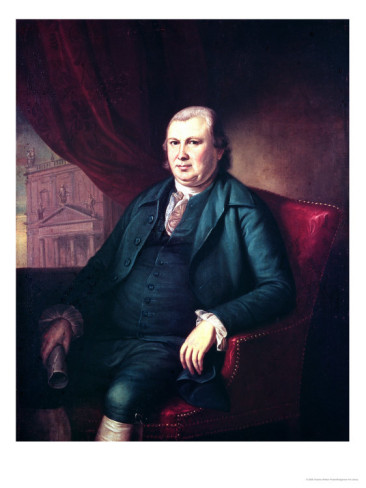
|
| Robert Morris |
Robert Morris, it must be remembered, was probably the richest man in America, a signer of the Articles of Confederation, the Declaration of Independence, and the Constitution. He was one of three men, including Ben Franklin and George Washington, about whom it could be said: the Revolution could not have been won without them. Morris essentially invented American banking, founded the first bank, the Pennsylvania Bank, invented investment banking, corporate conglomerates, American maritime insurance, and dozens of financial innovations. His merchant house probably had 150 ships sunk by the enemy. George Washington lived in his house for years. Today, he is mostly remembered for going bankrupt at the end of a busy life.
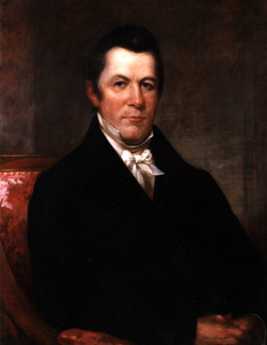
|
| William Findlay |
William Findlay, on the other hand, was a Scotch-Irish frontiersman with a flamboyant white hat, elected by others like him from the Pittsburgh area to promote inflation through state-issued debt paper, so as to finance land speculation in the West. He had no education to speak of, no accomplishments to mention. He made no secret of his self-interest in land speculation, and therefore no secret of his opposition to rechartering the Bank of North America, which Morris had founded for the purpose of restraining inflation and speculation. Findlay wanted the bank to disappear, get out of his way, and he boldly denounced Morris for his self-interest in promoting a bank where he owned stock. He utterly denied that Morris had any motive other than the profit he would make for the bank, so in his opinion, they were equal in self-interest. Let's vote.
Prior to that time, Findlay had politically defeated Hugh Brackenridge, using the two strong arguments that Brackenridge had gone to Princeton, and written poetry; how could such a person possibly represent the hard-boiled self-interest of frontier constituents?
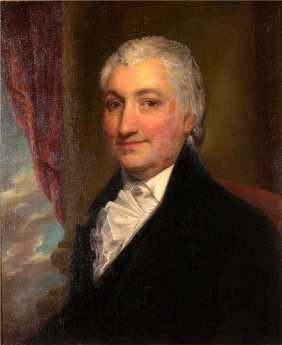
|
| Hugh Brackenridge |
Morris was positively apoplectic at this sneering at everything he stood for. As for the country's lack of trust in a man who had risked everything to save it, well, what has he done for us, lately? America had lately thrown off the King, but what it had really discarded was aristocracy. Every man was as good as every other man, and each had one vote. Under aristocratic ideals, a man was born, married and educated in a leadership class, expected to be utterly disinterested in his votes and actions, scrupulous to avoid any involvement in trade and commerce, where temptations of self-interest were abundant. Washington never accepted any salary for his years of service and even agonized for months when he was awarded stock in a canal company, wanting neither to seem ungrateful nor to make private profit. John Hancock, who came pretty close to having as much wealth as Morris, gave up his business when he was made Governor of Massachusetts. Benjamin Franklin was only accepted into public life when he retired from the printing business, to live the life of a gentleman. That's how it was, everywhere; every nation had a king and depended on rich aristocrats to supply the leadership for war and public life. But, now, America had become a republic where every man was equal. Morris and the Federalists he represented wanted to turn the clock back to an era that would never return.
Goaded too far, Morris impulsively resigned his business interests, to prove he had the nation's interest at heart in opposing inflation. It didn't help. Findlay won the vote, and the Bank of North America was closed. America was ashamed of how it behaved after the Revolution, but not ashamed enough to change.
REFERENCES
| Robert Morris: Financier of the American Revolution: Robert Morris: Charles Rappleye: ISBN-10: 1416570926 | Amazon |
Tammany: Philadelphia's Gift to New York
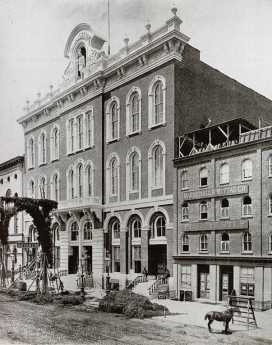
|
| Tammany Hall |
EDWARD Hicks painted a scene over and over, depicting William Penn signing a treaty of peace with the Lenape Indians at Shackamaxon ( a little Delaware waterfront park at Beach Street and E. Columbia Ave.). This scene was apparently a reference to a larger and more finished depiction by Benjamin West. The Indian chief in the painting is Tamarind, chief of the Delaware tribe. Long before Hicks got the idea for the picture from Benjamin West, Tamarind was locally famous for having the annual celebrations of the Sons of St. Tammany named after him. These outings centered on the joys of local firewater and thus may have had something to do with the evolutions of the Mummers Parade. George Washington presided over a lively Tammany party at Valley Forge, and local Tammany Hall clubs sprang up all over the country. The most famous offshoot had its headquarters on 14th Street in New York, as a club within the local Democrat party asserting Irish dominance over New York politics, allegedly using Catholic Church connections to control other immigrant groups. The identity of Tammerend seems to have got thoroughly mixed up along the way; the famous statue of "Tecumseh" at the Naval Academy in Annapolis, much revered by the cadets, is actually a depiction of Tammany.

|
| Penn's Treaty With the Indians By Benjamin West |
At earlier times, Tammany was the vehicle Aaron Burr used to assert control of the now-Democrat Party, particularly in the contested Presidential election of 1804. Shooting Alexander Hamilton in a duel, along with disgrace and impeachment as Vice President necessitated Burr's rapid conversion into a non-person, both in New York and in Philadelphia. In Philadelphia, the uproar led to the dispersion of Tammany influence, while in New York other bosses, particularly Boss Tweed, took over the organization and consolidated its role as a small club which dominated a larger political party, which in turn pretty well took over the government of New York City, which in turn dominated the governance of New York State, and even occasionally leveraged itself into national politics. Eventually, Tammany fragmented sufficiently that Mayor Fiorello La Guardia was able to dislodge it from control, which in time led to its dissolution. In a larger sense, however, the decline of New York's Tammany Hall began when in the late 19th Century it adopted the Philadelphia system of consolidating graft from local leaders into unified "donations" from local utilities. That greatly improved the efficiency of collections and disbursements but undermined the need for an effective local organization of ward leaders.

|
| Aaron Burr |
So, although Tammany was originally a Philadelphia creation perfected by New York, it continued to have connections to Aaron Burr in early days, and Philadelphia machine politics later on. But of course for seventy-five years, around here it seemed Republican.
Morris Defends Banks From the Bank-Haters
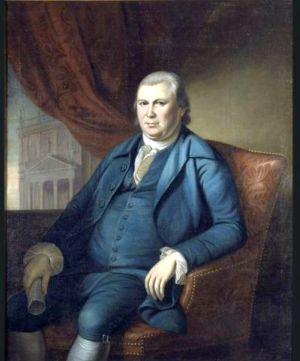
|
| Robert Morris |
IN 1783 the Revolution was over, in 1787 the Constitution was written, but the new nation would not launch its new system of government until 1790. It was a fragile time and a chaotic one. Earlier, just after the British abandoned their wartime occupation of Philadelphia in 1778, Robert Morris had been given emergency economic powers in the national government, whereas the state legislatures were struggling to create their own models of governance, often in overlapping areas. While the Pennsylvania Legislature was still occupying the Pennsylvania State House (now called Independence Hall) in 1778, it -- the state legislature -- issued the charter for America's first true bank the Bank of North America, and in 1784 the charter came up for its first post-war renewal. Morris was a member of the Pennsylvania Assembly both times. Although he was not a notable orator, it was said of him that he seldom lost an argument he seriously wanted to win. Keeping that up for several years in a small closed room will, unfortunately, make you many enemies.

|
| Tavern and Bank |
Morris was deeply invested in the bank, in many senses. He had watched with dismay as the Legislature squandered and mismanaged the meager funds of the rebellion, issuing promissory notes with abandon and no clear sense of how to repay them, or how to match revenues with expenditures. There was rioting in the streets of Philadelphia, very nearly extinguishing the lives of Morris and other leaders, just a block from City Tavern. Inflation immediately followed, resulting in high prices and shortages as the farmers refused to accept the flimsy currency under terms of price controls. Every possible rule of careful management was ignored and promptly matched with a vivid example of what results to expect next. Acting only on his gut instincts, Robert Morris stepped forward and offered to create a private currency, backed by his personal guarantee that the Morris notes would be paid. The crisis abated somewhat, giving Morris time to devise The Pennsylvania Bank, and then after some revision the first modern bank, the Bank of North America. The BNA sold stock to some wealthy backers of which Marris himself was the largest investor, to act as last-resort capital. It then started taking deposits, making loans, and acting as a modern bank. Without making much of a point of it at the time, the Bank interjected a vital change in the rules. Instead of Congress issuing the loans and setting the interest rates as it pleased, a commercial bank of this sort confines its loans to a fraction or multiple of its deposits, and its interest rates are then set by the public through the operation of supply and demand. The difference between what the Legislatures had been doing and what a commercial bank does, lies in who sets the interest rates and who limits the loans. The Legislature had been acting as if it had the divine right of Kings; the new system treated the government like any other borrower. As it turned out, the government didn't like the new system and has never liked it since then. Today, the present system has evolved a complicated apparatus at its top called the Open Market Committee of the Federal Reserve, most of whose members are politically appointed. Several members of the House Banking Committee are even now quite vocal in their C-span denunciations of the seven members of the Open Market Committee who in rotation are elected by the commercial banks of their regions. Close your eyes and the scene becomes the same; agents of the government feel they have a right to control the rules for government borrowing, while agents of the marketplace remain certain governments will always cheat if you don't stop them. This situation has not changed in two hundred years and essentially explains why some people hate banks.
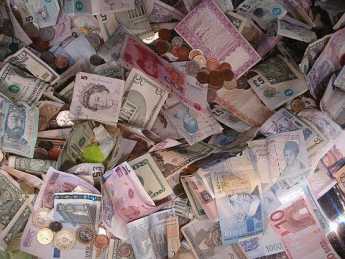
|
| Seigniorage |
That's the real essence of Morris's new idea of a bank; other advantages appeared as it operated. The law of large numbers smooths out the volatility of deposits and permits long-term loans based on short term deposits. Long-term deposits command higher loan prices than short-term ones can; higher profits result for the bank. And a highly counter-intuitive fact emerges, that making a loan effectively creates money; both the depositor and the borrower consider they own it at the same time. And finally, there is what is called seigniorage. Paper money (gold and silver "certificates") deteriorates and gets lost; the gold or silver backing it remains safe in the bank's vault, where it can be used a second time, or even many times.
For four days, Morris stood as a witness, hammering these truisms on the witless Western Pennsylvania legislators. At the end of it, scarcely one of them changed his vote, and the bank's charter was lost. But at the next election, the Federalists were swept back into the majority, defeating the opponents of the bank. Although, as we learn the way democracy works, still leaving them unconvinced of what they do not want to believe.
Funding the National Debt

|
| Alexander Hamilton |
Although Alexander Hamilton's arresting slogan that "A national debt is a national treasure" has diverted attention to the underlying idea toward him, Robert Morris had introduced and argued for the same insight in the preamble to his 1785 "Statement of Accounts". The key sentence was, "The payment of debts may indeed be expensive, but it is infinitely more expensive to withhold payment." This fatherly-sounding advice was surely a distillation of a long life as a merchant, and the gist of it may have been passed down to him as an apprentice. Failure to pay your debts promptly and cheerfully results in the world assigning a higher interest rate to your future credit; it is not long before compounded interest begins to drag you down. It doesn't exactly say that, but that's what it means.
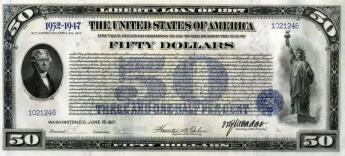
|
| Liberty Bond |
Another way of looking at this folk wisdom is that it leads to a simplified method of organizing the finances of an organization. Because higher rates of interest are demanded of long-term borrowing than short-term, it becomes efficient to segregate them. That is, to establish a cash account for every-day transactions, and a separate bond account for a long term, or capital, debt. As bills arrive, they need only be verified for accuracy and sent for payment from either a cash account or a capital account. The original responsibility for agreeing to such debts lies with top management, not the treasurer. The job of the treasurer's office is to pay legitimate bills as quickly and cheerfully as possible, ignoring any imprudence of earlier agreeing to them; rewards will come from lower interest charges and improved credit rating. An unexpected benefit of thus organizing institutions and governments is to make the accounting profession possible. Accountants perform the same function in every business, whether the business is selling battleships or parsnips. The accounting profession made itself computer-ready, two hundred years before the computer was invented.
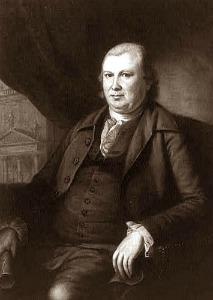
|
| Robert Morris |
In the same document, the retiring national Financier was advising the wisdom of "funding" the war debts, which were largely owed to France, with whom relations were rapidly souring. Lump them all together into a fund, issue bonds and sell them as representations of the nation's capital at the time of issue. Disregard what the money was used for, by either the debtor or the creditor. In spite of appearances, money sequestered in a fund for later payment belongs to the creditor the moment it is promised, not the moment it is transferred. Morris and Hamilton discovered that the fund itself had the property of a bank, in creating money. As long as the creditor did not cash your bonds, he could use them as money, in effect doubling the amount of money you yourself can spend. It was this discovery which so exhilarated Alexander Hamilton, causing him to over-praise the methodology to an already suspicious Congress. Tending toward the teachings of Shakespeare's Polonius, Hamilton's excitable manner caused them to remember, neither a borrower nor a lender is. But Congress was eventually persuaded. The federal government lumped the states' debts together in an "assumption of debts" , consolidated all these various little debts into a single "funded debt", and made the deal work with changing the "residency" of the nation's capital from Philadelphia to the banks of the Potomac. It was called the Great Compromise of 1790.
Morris well understood that a funded system requires some final payor of last resort. Such a payor need set aside only a small portion of the debt for dire contingencies, but his name gets first attention on the list presented to prospective creditors. In 1778 Morris had offered his own personal wealth as that last resort, which the public at the time trusted far more than the Treasury of the United States. Over the next twenty years, he came to realize that the last resort of established nations, no matter what the paper said, was the aggregate underlying wealth of the whole nation. With a vast continent stretching to the West, and countless immigrants clamoring to join from the East, the wealth supporting the debt of the United States in 1790 seemed endless. After two hundred years we have finally begun to accumulate a national debt which equals our Gross Domestic Product, and have only begun to pull back as we observe what happens to other nations who got to that point sooner. Let's hope devising an automatic check and balance does not require a second Robert Morris. Men like him can be hard to find, so limit your debts -- or your nation's debts -- to sixty percent of your assets. Financial geniuses are invited to devise a better debt limit, if they can.
Morris at the Constitutional Convention
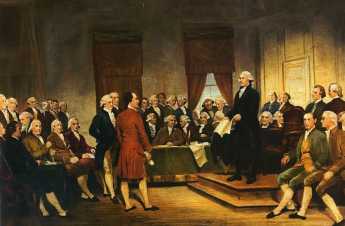
|
| Constitutional Convention 1787 |
TRUE, George Washington was the presiding officer of the Constitutional Convention. But Pennsylvania was the host delegation, so the role of presiding host should have fallen to Benjamin Franklin, the President of Pennsylvania. However, Franklin was getting elderly and turned the job over to Robert Morris, who among other things was rich enough to host some necessary parties. The rules of decorum at that time thus kept Washington and Morris out of the floor debates. The proceedings were, in any event, kept the secret, so occasional frowns or encouraging smiles are not recorded for history.
But Morris had been an active debater in the Assembly and other meetings, so he knew enough to line up a consensus in advance for the matters he thought were essential. Obviously, Morris was strongly in favor of giving the national government power to levy taxes for defense purposes, and Washington whose troops had suffered severely from the inability of the Continental Congress to pay them also regarded this taxing power as the central reason for changing the rules. By making it the central argument for holding the convention at all, Washington, Franklin, and Morris had made taxation power a foregone conclusion. And by giving them what they wanted from the outset, the rest of the convention was in a position to do almost anything else it wanted without open comment from the Titans. The sense of this trade-off was captured by Gouverneur Morris, the editor of the Constitution, in Article I, Section 8:
The Congress shall have Power To lay and collect Taxes, Duties, Imposts, and Excises, to pay the Debts and provide for the common Defence and general Welfare of the United States; but all Duties, Imposts, and Excises shall be uniform throughout the United States;This formulation had the effect of greatly empowering James Madison, the only participant who had studied the inside details intensively and cared about every comma. It also encourages the military to believe that federal taxation was mainly their entitlement, whereas those whose main goals are defined as "the general Welfare" tend to regard defense spending as an unnecessary deduction from their share.

|
| Pawn Broker Sign |
Most of the convention delegates had experience with state legislatures, and Franklin and Morris had spent decades struggling with the weaknesses of legislators. A wink or a quip in a tavern was as good as an hour's speech for reminding the delegates what they already knew about human nature. What was designed as a dual system of powers of taxation, with federal oversight of balanced state budgets combined with federal power to tax on its own in emergencies or unforeseen situations. Since the members of the first few congresses after 1789 were largely the same people as the members of the constitutional convention, many details of this balance were worked out over a few following years. State powers to tax and borrow were tightly constrained, only the federal government could tax and borrow without limit. Since government borrowing is merely the power to defer taxes until later, the borrower of last resort was the U.S. Congress, alone empowered to encumber the wealth of the whole nation in a federal pawn shop window called the funded National Debt. For almost two centuries, this pawn shop window seemed able to support any imaginable expense. Today, we monitor this as the ratio of national debt to Gross Domestic Product (GDP), and we now have a clearer idea what level of that ratio flirts with hopeless inability to pay the federal government's debt. The experts say it's close to a 60% ratio, and unfortunately, almost every nation on earth now exceeds that limit. The system continues to lack an unchallenged definition of its limit, but the system is nevertheless still Morris's system, wrapped in a mountain of descriptive detail by Alexander Hamilton. If a nation borrows more than that and clearly will never repay it, that nation is to some degree a slave to its creditors, with war its only hope if creditors are unrelenting. Perhaps another way to refine the thought is to say that if the nation wishes to mortgage everything it owns down to the last shoe button, the creditors will only accept additional debt if it is proposed by someone with the power to pawn the last shoe button. To foreigners, the proof of who has what power is much more certain if written down. Morris's protege Alexander Hamilton went even further: "credit" is established when creditors can see that somebody is in the habit of getting the nation's bills paid, and "credit" is injured whenever anyone in charge, welches.
What Is the Purpose of a National Constitution?

|
| 13th Century Magna Carta |
NATIONAL constitutions are mainly an outgrowth of the 18th Century Enlightenment, even though similar features are to be found among ancient legal codes. Those who trace the origins of the American constitution to the 13th Century Magna Carta will usually point to a central sentence of clause 39:
No free man shall be arrested, or imprisoned, or deprived of his property, or outlawed, or exiled, or in any way destroyed, nor shall we go against him or send against him, unless by legal judgement of his peers, or by the law of the land.
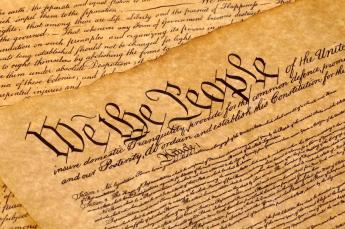
|
| American Constitution |
That's a pretty good beginning, a good example of a needed legal principle, but unrecognizable as what we would today call a Constitution. It states what a government may not do, but does not define the nature of a government which does the job best. Nor do even the many Enlightenment philosophers of government take that final step of outlining where their notions should take us until the American Constitution had been written and defended in the Federalist papers. Nowhere among the writings of Montesquieu (The Spirit of the Laws, 1748), Catherine the Great (Nakaz, Instructions to the All-Russian Legislative Commission, 1767), Diderot (Observations About Nakaz, 1774), James Madison (1787), John Dickinson(1763) or Gouverneur Morris(1787) can there be found much tightly described definition of a constitution. Certainly, there is no definition within the writings of Adam Smith if we look for rule-making among Enlightenment thinkers whose ideas were influential on the 1787 Philadelphia document. The American constitution was the product of many minds, before and after 1787. The outlines of its final form converged, and emerged, from the Constitutional Convention of the summer of 1787, with Gouverneur Morris as the penman of record. To him, we certainly owe its succinctness, which is the main source of affection for the document. That probably understates matters; in his diary of the secret meetings, James Madison records that Gouverneur Morris rose to speak about 170 times, more than any other delegate. Lots of thought and debate; ultimately, few words.
The Elizabethan Sir Francis Bacon has the greatest claim on devising a theory of law and law-making in the Anglosphere tradition. But his elegant modification of Galileo's scientific method, the English Common Law, is more a methodology for creating good laws than an outline of a nation's legal principles. Anyway, tracing the American Constitution back to an underlying British one tends to stumble when the British Constitution fails to meet a definition which would include our own. The British Constitution is said to be "unwritten" to the degree it is a consensus of revered documents. It can be amended by Parliament at will, has a variable history of defining just who is covered by it, and in order to define constitutional principles seems to rely on sentences extracted from difficult context. If the two constitutions had been written and compared at the same time, one would say the British had sacrificed coherence out of respect for tradition. In fairness, some features of the American constitution are also perhaps unnecessary for every constitution, but by surviving as the oldest constitution of the modern form, have become its model. That would be:
A set of principles governing the legitimacy of a nation's laws, and firmly standing above them. It defines its own domain, geographically and by the membership of a defined citizenry. Except as otherwise defined, it supersedes all other governance within its domain. It defines and defends its own origins. It includes a description of how to amend it, which is intentionally infrequent and difficult. It goes on to outline the structure of the laws it regulates, with subtle modifications made to channel the type of power structure which will govern.
In the American case, history and culture generated several other instabilities so central they justified heightening the difficulty to amend them to a Constitutional level, thus conferring undisputed dominance over competing principles of governance. That would be:
A separation of government powers weakened all potentially offending branches of government, and thus enhanced citizen liberty. Separation of church from state, for like purpose. A right of citizens to bear arms, to strengthen citizens' defense against internal or external attack, and perhaps also warning that revolt must be possible, even endorsed, as some final extremity of protection for citizen sovereignty.

|
| Russia's Catherine the Great |
It enhances our comprehension to contrast the outcomes of competing 18th Century implementations of the Constitution idea. Russia's Catherine the Great proposed a constitution steeped in the traditions of the Enlightenment but ultimately designed to define and strengthen the role of the monarch. Denis Diderot her French protege recoiled at this viewpoint, substituting other views resembling those of Jean Jacob Rousseau. He opened Observations About Nakaz his commentary to the Queen, with the following declaration:
There is no true sovereign except the nation; there can be no true legislator except the people. Whether looking back to the English Civil War or forward to future disputes between the Executive and Legislative branches, it makes clear the Legislative branch was dominant, with the Executive branch acting as its agent.

|
| Denis Diderot |
With this ringing warcry, the French model nevertheless ushered in the extremes of the Terror, the Guillotine, and the Napoleonic conquests. The consequences of the French constitution undermined world confidence in the benevolence of public opinion, at least deeply confounding those for whom the democratic rule was not totally discredited. Once more new life was breathed into allegiance for the monarchy, military rule, and dictatorship. Public opinion, it seemed, was not either invariably benign or comfortably far-seeing. The noble savage, mankind naked of tainted civilization, was not necessarily wise or worthy of trust. Edward Gibbons, the 1776 author of The Decline and Fall of the Roman Empire was pointing out where it all might lead if we completely believed in the collective goodness of the human condition. At the least, the failure of the French Revolution complimented the viewpoint of the Scottish philosopher, Adam Smith, who also in 1776 emphatically urged a switch in that reliance toward a sense of enlightened self-interest, as follows:
It is not from the benevolence of the butcher, the brewer, or the baker, that we can expect our dinner but from their regard to their own interest.
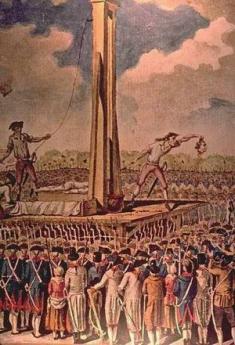
|
| Terror, the Guillotine, |
It is not surprising that Diderot rejected the Leibniz view of things that "All is for the best, in this best of all possible worlds." And, in view of his dependence on Catherine, not surprising he did not publish his rejection of it until 1823. Thomas Jefferson was in France as ambassador during the time of the American Constitutional Convention, fearing to confront George Washington; and likewise keeping his conflicting views private for several years. Eventually, they surfaced in the creation of an anti-Federalist political party along with the conflicts which kept the new nation in a turmoil for the following forty years. It is surely a testimony to the strength of the Constitution's design that the country was able to shift between such extreme governing philosophies but still hold together without changing the governing statement of purpose. Indeed, it is plausible to contend that our two political parties still continuously debate the useful tension between these two differing opinions.
Constitutionality of the Monetary System
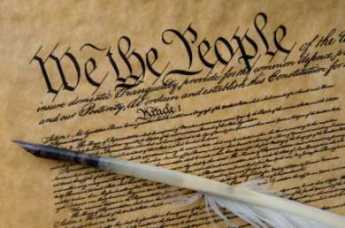
|
| The Constitution |
In noting that our Constitution has lasted for over two centuries, we assert that this simple short document has largely anticipated everything important to anticipate, including the Industrial Revolution, atomic warfare, and the Information Age, to name a few. When an occasional issue arises that is not only unmentioned in the Constitution but where no one is certain what to do, our system leaves us spiritually adrift. Such an issue is found in o0ur monetary system, where we have been wandering for two hundred years.
The founding fathers worried a great deal that popular majorities would abuse minorities, particularly in the case of the majority poor people voting themselves the property of minority rich ones, or that debtors in the majority might dishonor the rights of creditors. Although we have developed a welter of laws about debt and creditors, bankruptcy and taxation, they are if anything too specific. What is lacking is a few general words in the Constitution about the principles of credit and money. The problem now is the same as it was in 1787; we don't know what to say.
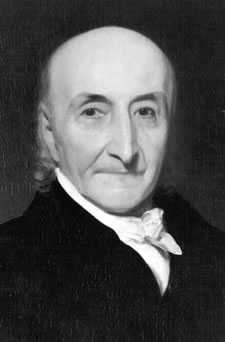
|
| Albert Gallatin |
For a very long time, some very well educated people were strongly opposed to the creation of a bank, later to mean a banking system. Alexander Hamilton's proposition that a "national debt is a national treasure" was greeted with horror by several Presidents, as well as by Albert Gallatin, one of the most sophisticated financial thinkers of the time. Underlying this perplexing reaction to the simple proposal to create a bank was surely the perception that making the Federal Government into a substantial debtor creates a powerful ally to all debtors in their eternal struggle with all creditors; the outcome of such an unequal struggle would inevitably be to the disadvantage of creditors. In common parlance, the word capitalist seems to imply a creditor. It took a very long time for it to become understandable that debtors, too, were essential beneficiaries of a capitalist system, but that idea still often meets with dissent. However, when millions of the world population belong to religions which prohibit the payment of interest, it should not be surprising to find many Americans who cannot get their heads around the idea that debtors and creditors need each other to an equal degree.
In the case of inflation, governments have always been somewhat favorable to debauching the currency. Naturally, a major debtor hopes to repay its debt with cheaper money. Since it has more or less always been necessary to use police powers to maintain a common currency, Kings and governments have long been in control of money, whether that means gold bars or beaded wampum. And for the same length of time, governments have been discovered bending the rules in favor of themselves. Bronze has been substituted for gold, the edges of coins have been shaved, the printing presses print paper money unrestrainedly, and the consumer price index has been manipulated to encourage inflation. Political parties have sought votes from debtors by promising to regulate banks, promote silver as a substitute for gold, disadvantage foreign competitors, inhibit or manipulate the value of the currency on foreign exchanges.

|
| Alan Greenspan |
For forty years we have operated without any fixed standard for money. Money for all that time has lacked any physical representation or discipline. Money has become a computer notation. At first, it was based on calculations of monetary aggregates, a bewildering concept promoted by Milton Friedman. More recently, it is entirely based on inflation targeting as promoted by Alan Greenspan. With a target of maintaining steady prices, an inflation rate of 2% is set as a specific target for the Federal Reserve. If inflation falls below that target, more money is created; if it rises above that level, less money is created. How much there is of it does not matter; it's beyond calculation. Although this simplified description fills almost any listener with doubts, it seemed vindicated by seventeen years without a notable recession. Even though events beginning in 2007 raise pretty serious doubts, it may still prove to be the best possible monetary system.
Even though this most fundamental of all commercial issues cry out for a simple principle to be stated in the Constitution so that neither populist congressmen not rapacious financiers can ruin us, it is not presently possible even to imagine what a new Constitutional amendment would, should or even could say. Meanwhile, some immense power rests in the hands of shadowy figures whom we blindly trust, for lack of a better idea about how we should select them or what we should instruct them to do.
Causes of the 2007 Crash: Political and Technological
Dealing with a topic as complicated as the causes of the 2007 financial crisis, it's quite possible for two viewpoints to be entirely in agreement, until abruptly coming to different conclusions. In this paper, we consider the relative merits of blaming government housing subsidies in various forms, relative to blaming the unanticipated effects of the computer revolution. The subsidy argument has just been succinctly and effectively argued by a lawyer, Peter J. Wallison. Agreeing with every word he writes, I nevertheless hold the perspective that the disruptive effects of the computer revolution were equally responsible, if not more so. Politics versus technology, choose your poison.

|
| Federal Reserve |
Mr. Wallison served as a lawyer in the financial loins of Washington, and thus has the perspective of a Reaganite who sees government as the main problem; with the significant distinction that his proposals for solution also lie in government corrective action, particularly "covered bonds" and step-wise privatization of the Federal Housing Authority (FHA). While agreeing with both reform proposals, my concern here is about too little general recognition in the analysis of how vulnerable the banking system has become, to revolutions made possible by even primitive computers of the 1960s. Such revolutions soon grew many times magnified by the inexpensive high-speed internet. If that analysis is correct, it predicts mere legislative action for the housing industry will prove inadequate; banking has taken a radical new direction.
Mr. Wallison's argument in the January 3, 2011 edition of the Wall Street Journal is admirably succinct. He points out the New Deal Federal Reserve deliberately suppressed interest rates to the benefit of the housing industry, but made a significant exception for the Savings and Loans. (It was forced to abandon that approach by the innovation of money market funds, in turn, made feasible by the widespread adoption of the IBM 360 computer.) When the collapsed, that segment of the market was awarded to the GSEs (Fannie and Freddy Mac, insured by FHA). In 1992, Congress imposed the goal of promoting "affordable housing" on the GSEs, which is to say the subsidization of "subprime" (i.e. high risk) mortgages. By 2007, half of all mortgages were subprime, and by September 7, 2008, Fan and Fred were insolvent, effectively replaced by the Federal Reserve (i.e. the taxpayers) as the final guarantor against national insolvency. It will take a decade to restore the economy from its present setback, but Mr. Wallison's proposals do indeed have some chance of eventually leading to a viable economy. He proposes the threshold for "jumbo" mortgages be reduced by $50,000 every six months until mortgages are effectively privatized. And he also suggests we create a pool of mortgage assets as security for a bond issue, thus privatizing existing mortgages in the way Europeans describe as a "covered bond" system. Go ahead, do it; it might work, and nothing else is on offer.

|
| IBM 360 Computer |
Meanwhile take a look at banks; we seemingly can't get along without them. But other institutions are undermining them, with cheaper products made possible by computers. For two centuries, banks transformed short-term borrowing into long-term loans; no one else could do it. It's a simple idea, and it works, that a constant or even rising pool level can be maintained by a steady inflow of short-term deposits. But it is risky; the risk is that some event will precipitate a sudden rush of withdrawals, a run on the bank. Sooner or later, the law of averages catches up. The risk is real, it happens every few years. A price in the form of interest must be imposed to maintain reserves against occasional bank runs, and collectively the whole nation must maintain a central "bank", charging interest to maintain reserves against simultaneous runs on multiple banks. No device has ever been created for a nation to protect against a universal bank panic, which is as effective as placing the risk in the hands of private bankers who can expect to be stripped and shorn if things get out of control. Robert Morris demonstrated this point in 1779, and the nation seemingly must re-learn it every few decades. The IBM 360 computer made it possible to transform short-term into long-term in greater volume and lower cost by allowing banks to get bigger; but it could also perform the short-long transformation in cheaper ways than depository banks do, and from there the bank-competitive process we know as securitization has gone on to commercial credits, auto loans, credit cards, high-velocity stock trading, and mortgage-backed securities. These approaches are often cheaper and more convenient than the trusty old banking system and Credit Default Swaps show its power isn't exhausted; any legislation to prohibit CDS is sure to to be circumvented. Insurance is also on the edge of being threatened. An industrial revolution of this magnitude takes decades of tweaks to become stabilized, but it will suffice for now, if we can establish reasonable protections against the risk shifted into the securitization or investment banking arena. As risk shifts, remuneration for accepting risk must shift as well. This new system for generating capital must not be starved because depository bankers resist the loss of their share of profitability; politics will have much to answer for if that happens.
Most likely, the main obstacles to getting this system fixed will come from overseas. Fifty years of disillusionment with the United Nations will make nations, the United States chief among them, resist loss of sovereignty in something so vital as finance. But that's for the future. For nearly a century, the past has been disrupted by idle notions of the fairness of coerced redistribution, in ways Mr. Wallison has succinctly described. But meanwhile we almost willfully ignore technological upheavals which everyone welcomed but no one fully anticipated.
Black Swans (Financial Variety)

|
| Nicolas Baudin |
The mouth of the Delaware River once teemed with white swans, but black swans were unknown until the French explorer Nicolas Baudin brought home a few from Australia, where they are now celebrated as the state animal of Western Australia. Empress Josephine Bonaparte was delighted with them, made them known as her birds, and thus made the term "Black Swan" more or less synonymous with rare chance occurrences. The implied inference that every white swan contains a remote potential for breeding a black one is doubtful biology, however. More likely, black swans are a distinct species -- Cygnus atratus-- confined to Australia and New Zealand, and just about extinct in New Zealand. In that view of things, the rarity of black swans is equivalent to the prevalence of black ones, mixed within the population of generally white ones. Nevertheless, for this article, it is convenient to continue the unlikely conjecture that most, or perhaps every, white swan contain a small potential to hatch a black one.
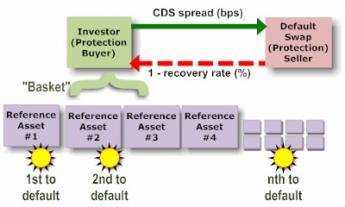
|
| Credit Default Swaps |
Many theories exist for the discovery that financial crises are commoner than chance alone would seem to predict; if they follow a Gaussian normal distribution curve, it must be somehow different from the distribution curve of smaller fluctuations. Observing this discordance is more or less how the phenomenon was discovered. The normal volatility of economic activity is calculated from the fluctuations observed in, say, twenty years. When that derived curve is extrapolated to include cataclysmic events which by a theory of the unmeasured "long tail" occur every hundred years, speculators have later discovered by actual measurement that, alas, such disasters actually occur much more frequently. Calculated risks derived from such extrapolations have upended many insurance companies and insurance-like vehicles like Credit Default Swaps, who set their premium charges to match the mathematics. Since CDS approached a hundred trillion dollars in the last crisis, it is important to understand the mechanics of this kind of Black Swan if we possibly can.

|
| Black Swan |
One way to do that is to question the conventional equivalence of risk and volatility ; that is, that the more markets bounce around, the riskier they become. Why should that be true, we might ask. And if it is somewhat true, why does that make it is converse true, those calm seas are safe ones? Those of us who sit and watch the ocean shore soon adopt the habit of speech that high waves at the shore mean a storm is approaching, not that it will ever arrive. After all, the center of the storm may be traveling parallel to the coastline, not directly toward it. And calm seas are particularly undependable predictors; no matter how calm it may be, the next storm might arrive in a few hours, or it may not come for months. Many other analogies spring up, once one puts aside the basic assumption that world economies can be depicted as a linear electrocardiogram. At the very least, they are two-dimensional, possibly three. Possibly four, if you regard time as a dimension.
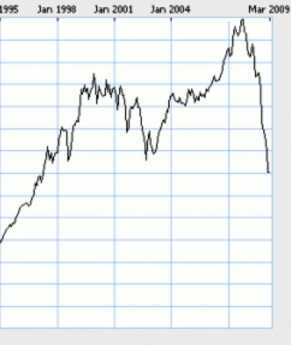
|
| Dow Jones |
It must be noticed that market volatility is universally viewed as linked to bad things, and many efforts have been made by central banks to reduce risk by constraining volatility. Alan Greenspan is famous for having controlled the economy for seventeen years without major depression. Is that necessarily a good thing? Is it equally possible that kinetic energy was constrained within the inflating balloon until the bursting of it was a far more damaging explosion than small planned deflations would have been?
Experimental testing of these ideas has itself been constrained by an inability to predict the explosion point of expanding financial balloons. Planned deflations have been particularly feared, because of lack of assured ways to get them to stop deflating. But practical warnings such as these are not the same as claiming that lack of volatility is always the ideal state.
Macroeconomics of The 2007 Collapse
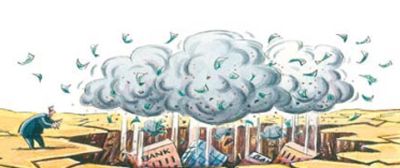
Sudden wealth creation, whether from the discovery of gold or oil, the conversion of poverty into useful cheap labor, or the sudden abundance of cheap credit, is of course a good thing. Sudden wealth creation can be compared with a stone thrown into a pond, causing a splash, and ripples, but leaving a somewhat higher water level after things calm down. The globalization of trade and finance in the past fifty years has caused 150 such disturbances, mostly confined to a primitive developing country and its neighbors. Only the 2007 disruption has been large enough to upset the biggest economies. It remains to be seen whether a disorder to the whole world will result in a revised world monetary arrangement. One hopes so, but national currencies, tightly controlled by local governments, have been successful in the past in confining the damage. This time, the challenge is to breach the dikes somewhat, without letting destructive tidal waves sweep past them. Many will resist this idea, claiming instead it would be better to have higher dikes.
It is the suddenness of new wealth creation in a particular region which upsets existing currency arrangements. Large economies "float" their currencies in response to the fluxes of trade, smaller economies can be permitted to "peg" their currencies to larger ones, with only infrequent readjustments. Even the floating nations "cheat" a little, in response to the political needs of the governing party, or, to stimulate and depress their economies as locally thought best. All politicians in all countries, therefore, fear a strictly honest floating system, and their negotiations about revising the present system will surely be guilty of finding loopholes for each other; the search for flexible floating will, therefore, claim to seek an arrangement which is "workable".
In thousands of years of governments, they have invariably sought ways to substitute inflated currency for unpopular taxes. The heart of any international payment system is to find ways to resist local inflation strategies. Aside from using gunboats, only two methods have proven successful. The most time-honored is to link currencies to gold or other precious substances, which has the main handicap of inflexibility in response to economic fluctuations. After breaking the link to gold in 1971, central banks regulated the supply of national currency in response to national inflation, so-called "inflation targeting". It worked far better than many feared, apparently allowing twenty years without a recession. It remains to be investigated whether the substitution of foreign currency defeated the system, and therefore whether the system can be repaired by improving the precision of universal floating, or tightening the obedience to targets, or both. These mildest of measures involve a certain surrender of national sovereignty; stronger methods would require even more draconian external force. The worse it gets, the more likely it could be enforced only by military threat. Even the Roman Empire required gold and precious metals to enforce a world currency. The use of the International Monetary Fund (IMF) implies attempts to dominate the politics of the IMF. So it comes to the same thing: this crisis will have to get a lot worse, maybe with some rioting and revolutions, before we can expect anything more satisfactory than a rickety negotiated international arrangement, riddled with embarrassing "earmarks". Economic recovery will be slow and gradual unless this arrangement is better, or social upheavals worse, that would presently appear likely.
Securitization: Pass the Hot Potato
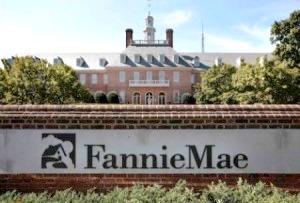
|
| Fannie Mae Corp. |
It would be pardonable to say that since securitization of home mortgages is a generally good thing, we might overlook any minor differences in approach between Fannie Mae (FNMA) and CDOs (Collateralized Debt Obligations), and let the customers decide which approach is preferred. Unfortunately, they both encompass a fatal flaw that has somehow escaped adequate notice. As mortgages pass from one holder to the next in sequence, both the buyer and seller seek to avoid the worst-risk mortgages and retain for themselves the best-risk ones. Get stuck with too many bad-risk properties, and you will go broke. When the credit markets suddenly woke up to this reality in August 2007, it was impossible to know who was holding good stuff and who was holding toxic mortgages. The markets "froze", which is to say most traders just walked away from participation until the situation clarified.

|
| Rising house prices |
Furthermore, with existing systems this seems to be something that will inevitably happen. A small-town bank tries to sell every mortgage it originates to an aggregator, but a few mortgages just aren't salable. The small town bank might well be able to sell mortgages to people who can't afford a house, but the aggregator is wise to the world, and won't buy the worst of them, so they silt up in the hands of the originating bank. Some originating banks may be deft enough to hold on to the very best risks and sell the rest, but a lot of banks will be turned away by dealers who are smarter than they are. At every step in the chain, there will be the same contest, so eventually, everybody comes under suspicion. Add to this trap the irony that an environment of rising house prices simply increases the size of the defaults when the pyramid finally topples, and it may temporarily blind everyone to the risks being run, thus making it all worse. Somehow or other, the average down payment on the mortgages you hold must be larger than the average drop of house prices in a slump, else you will be transferring the risk from the homeowner to yourself. A strong case can be made that the fault in the recent crash was not predatory lending; it was a failure to demand adequate down payments.

|
| Bear Stearns |
However you define an "adequate" down payment, it is clear that the recent rise of house prices particularly in the regions of greatest overbuilding, put a conventional 20% down payment completely out of reach of many first-home buyers. Since house prices have declined 20% and may decline 20% more, a determination of lenders not to lend more than 80% would have prevented a lot of overbuilding. If mortgage aggregators had refused to purchase mortgages that lacked an adequate down payment, the originating banks would soon have stopped issuing them. Consequently, the necessary fortitude should have been applied at the last step before securitization. It's possible to believe the people at Bear Stearns now wish they had done so.
If we then turn to the GSEs, the significant extra risk of Fannie Mae is political. Holding $5 trillion of debt more or less guaranteed by the U.S. Government, the Secretary of the Treasury repeatedly told congressional hearings that assuming its default would double the national debt. Double the national debt is what is meant by being "too big to be allowed to fail." Since this appalling situation willy-nilly relieves Fannie Mae of any worry about collapsing, the only way to force Fannie Mae to insist on adequate down payments is by Congress passing a law that they must. Congress seems to lack the political will to pass such rules in an election year, or probably any other year. The mandate for fifty years has been for Fannie Mae to make housing "affordable" and keep homeowners from losing their homes. It would be an unimaginable tragedy if Congress ran away from this dilemma, and accepted the hyper-inflation which would result from suddenly doubling the national debt. Unimaginable, but likely.
HowTo Create A Subprime Derivative
What's a Repo?
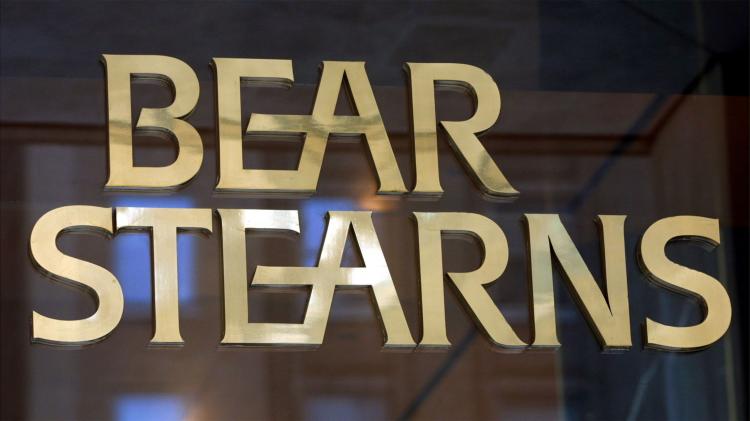
|
| Bear Stearns |
On St. Patrick's Day, 2008, Bear Stearns became insolvent and was given to J P Morgan. The Federal Reserve assumed all risks. Effectively, the fifth largest investment bank in America was nationalized for $2 a share, because no private bank would buy it at any price. A year earlier it was worth $170 a share, even one trading day earlier it sold for $26.
At the heart of this catastrophe were "repo's", or repurchase agreements. (They should not be confused with repossessions of cars and other hard goods bought on time, which are also called repo's.) Although most people had never heard of the high-finance version of repo's, the volume of these instruments had grown to $5 trillion by January 2005, presumably even several times larger than that when they caused the nationalization of Bear Stearns. Newsmedia accounts offered the guess that 16% of the resources of the whole financial sector were caught in open repo's when the music stopped. Repo's must be awfully good, or awfully bad.
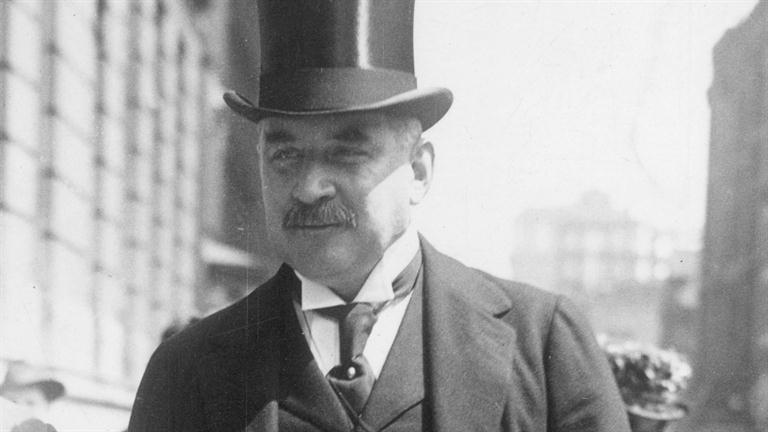
|
| J.P. Morgan |
They were both of these things at once. Like so many innovations in the post-computer era, they offered a major cost saving to an inefficient transaction system but were so successful they overwhelmed the institutions which flocked to their reduced cost. The unanticipated difficulties might have been imagined, but they were not adequately guarded against. Essentially, these loans limited exposure to a few days, a feature that made them appear quite safe. Unfortunately, tons of these loans could expire simultaneously if a rumor got started and everyone held off using them for a week. With a run on a bank, at least people have to take action to withdraw their money; but with these things, simple inaction quickly led to massive cash shortages at the bank. Speeding up the loan process had made it cheaper, but made it vulnerable.
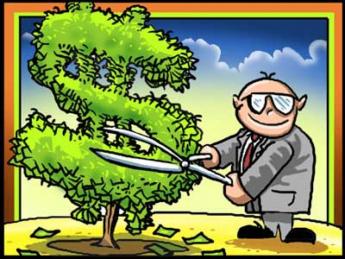
|
| Hedge Fund |
Consider the inefficient complexities of a bank loan. The bank wants collateral, perhaps 80% of the value of the loan. The ability of the borrower must be investigated, a clear title assured, and papers arranged for transfer in case of defaulted collateral. Lawyers must organize the agreements, and it all takes time, costs money. To go through all this for a one-week loan for anything less than huge transactions is simply not practical. So the idea was devised to sell the collateral to the lender at a discount, together with a repurchase agreement to buy it back at full price. For safety sake, the discount could be greater than the interest cost, and part of it returned if all went well. The collateral could be held by a third party, who essentially guaranteed the details while the collateral itself never moved. Bear Stearns had perfected these variations at such favorable prices they dominated the market for them with hedge funds; the margin for error narrowed when interest rates dropped, cash got scarce when investors got uncomfortable, the whole hedge fund industry was suddenly paralyzed, and everything connected to hedge funds was frozen secondarily. Much of this was handled automatically by computers, so huge volume made it impossible for anyone to know who might be insolvent. It seemed comparatively harmless to decline to play this game for a few days, but it was not harmless if most people decided to do so at the same time. The daily variations of interest rates and/or duration generate a ("Gaussian") normal distribution curve for the risk, predicting serious deviations will occur once every two centuries. But when events --even false rumors -- suddenly get everyone's attention at once, small daily fluctuations no longer bear much relationship to the frequency of violent fluctuations. Once-in-a-century events start to happen every few years. At those times, the public stops speaking with a million voices and shouts in unison. Quite often, there is no cataclysmic event to trigger it. Like the conversational babel of a dinner party, it can all stop at once for no particular reason.

|
| Black Swan |
The mathematics of this matter could be taught to a tenth-grade math class. It starts to get beyond everybody's anticipation however when two such Black Swan events happen at the same time. In this case, an unanticipated pause for a few days bumped into the rule that non-bank institutions must mark their portfolios to the market every day. But for days at a time in this crisis, there could be no trading in certain issues; there was no market to mark to. How then can you demonstrate your solvency -- what might your competitors be hiding during these unannounced market holidays? And, since banks are in the same pickle but aren't required to mark to market, how can you trust them to pay bills? When you see European banks, who must obey new rules called Basel II, go bankrupt and get nationalized, how can you be sure American banks, who needn't obey Basel II until 2009, are any safer bet?
Progress is progress, but how much of it can we cope with?
The 'repo' market from Marketplace on Vimeo.
Novation
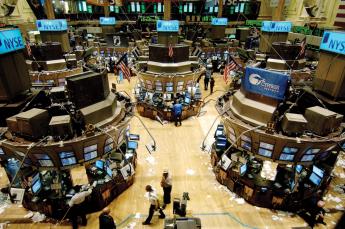
|
| American Stock Market |
Novation is a term that perhaps nobody but a specialist expert can now define, but is nevertheless destined to be politicized in the coming election campaign to the point where almost everybody could be shouting it like a war cry. That is unless the hired political consultants decide some other feature of credit derivatives serves warcry purposes better. We're talking sixty trillion dollars here, about five times the size of the domestic American stock market.
Someone owned or thought he owned pieces of paper worth this staggering sum, which can be regarded as side bets on the bond market. Just as in a horse race, where you don't usually own the horse when you bet on the winner, you needn't own the bonds to bet on whether they will default. The side bet is often between two outsiders who acquired their bets through, well, novation. The process begins as a credit derivative, in which someone gets paid an annual sum in return for agreeing to pay off -- if the bond defaults. That could be regarded as a useful insurance policy, making more credit available by making it safer to buy bonds. The bondholder gives up a little interest in return for assurance the bond is now completely safe. Sucker.

|
| Sun Belt Mortgage |
Like the Sun Belt mortgage originator, the originators of these derivatives often wasted little time clipping off a fee and passing the carcass to someone else. And that process got repeated until the accumulating fees in the chain slowed the process to a point where the weakest or most reckless holder got into danger. The game might have slowed to the point where it became self-correcting, but what actually seems to have happened is that much of the long-term debt involved was financed by short-term borrowing, and the start of some rumors triggered a run on the bank. Not exactly, of course, but when institutions which had made one-week or one-month loans stopped lending, it only took a few days for the money to run out and Bear Stearns was quickly unable to pay its bills even though it started the week with $18 billion in reserves.
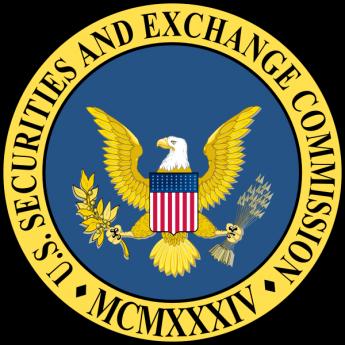
|
| Securities and Exchange Commission |
That short description is about the best that can be made out of an opaque situation, based on what the Securities and Exchange Commission is willing to tell reporters about its investigation. More will be forthcoming, and no doubt some villains and fools will emerge with a lot of blame. For example, the price of credit derivatives concerning Bear Stearns debt had been creeping up steadily during the month before the explosion; whether somebody knew something bad, or whether there really was something bad is presently unclear. It's disconcerting to learn that Goldman Sachs was dumping this paper, and JP Morgan Chase was mostly buying it, but it's early days for unfounded suspicions. More will come.
Now to return to novation. We legal novices learn that novation transfer is the same as assignment transfer, except all parties have to agree to novation before it can take place. That's going to make it harder for a lot of people to deny they knew what was happening. The astonishingly large sums involved are apparently not entirely real, because in some way the old debt is not extinguished, and the new debt is merely added to the sum total outstanding. That surely means the same debt is counted several times, and the apparent sum is to some unknowable extent much larger than the underlying reality. This also accounts for the amazing speed of growth. In January 2007 the total was said to be about $25 trillion, in January 2008 it was reported to be $42 trillion, and in May 2008 it was said to be $60 trillion. Things which move that fast can quickly spin out of control, especially when short term creditors need to do nothing much for a couple of weeks as their money emerges from the pool. Some people did sell short, of course, but whether that was panic or malicious must probably be left to politicians to declaim.
Surely the most terrifying part of this simple story is that so much money could be moved around without public awareness. When the $25 trillion figure emerged, a number of people asked what in the world was going on, and kept asking that question for eighteen months. Nobody knew nothing.
Steep Yield Curve: A Useful Subsidy?
The steepness of the federal interest rate curve -- ten-year treasury bonds pay more interest than three-month treasury bills, and the rate for intermediate time intervals slopes gradually from one to the other -- is a function of the Federal Reserve; the slope of this curve concisely describes current Fed policy. The Federal Reserve controls the money supply by raising or lowering short-term rates, which "affects the slope at the short end", and mainly in this way restrains or encourages inflation, or alters the exchange value of American currency. For the most part, long term rates are set by the public bond market. Once in a while, the Federal Reserve does buy or sell long-term treasury bonds to modify long-term rates in the economy. By affecting rates at either end, the result is some kind of change in the slope of the curve.
Because banks make interest payments to depositors near the short-term federal rate, while the same banks charge borrowers at near the public long-term rate, the current slope is the main determinant of bank profits. Banks borrow short and lend long. If Federal Reserve tinkering steepens the curve more than it would be without interference, then bank profits are subsidized. Of course, it works the other way as well; in a banking crisis, yield curves can be steepened to rescue banks from failure, thus potentially sacrificing ideal monetary levels temporarily. For the most part, what is good for the banks is good for the economy; but it remains that bank profits are subsidized much of the time. Artificially widened yield curves either punish savers by lowering interest rates on their savings accounts or else punish borrowers by increasing interest rates on mortgages and other credit. For political reasons, the pain is usually shared among voting blocs. It can be argued this invisible subsidy of banks by the public creates a compensating benefit of economic stability despite occasional bubbles and recessions like the present one. However, the Federal Reserve system has been in operation for almost a century, revealing a long-term bias in favor of inflation, which is a subsidy of debtors by creditors. Present policy deliberately targets a steady rate of 2-3% inflation; the gold market responded to a century of this by raising the price of gold from $17 to $900 an ounce. A 1913 penny has become a dollar (before taxes) you might say. You might also say it took the Federal Reserve less than a century to make the present dollar worth a penny.
If gradual inflation is a consequence, a fair question must arise whether the Federal Reserve is worth its cost. Compared with an inflexible, relentlessly deflationary Gold Standard, yes, it is. Even accepting the monetary crisis as partly created by central banking, the international dominance of the American economy and recent smoothing of banking instability testify to the durable use of the Fed. But another criticism must be faced: In subsidizing depository banks with an artificial yield curve, is the Fed backing the wrong horse for the future? To answer that question, examine two components: With computer technology rapidly advancing, can the Federal Reserve accommodate non-banking competitors to banks? And secondly, international central banking appropriately accommodate globalization? There are, after all, aspects within the 2007-20?? a crisis which suggests -- maybe it can't.
Steady inflation of 1000% per century may well be preferable to 19th Century volatility of 1000% every ten or so years. But a gradual rise of, say, 500% or less each century might be even better. Relentless political pressure on the Federal Reserve has typically been used to explain its slow retreat from truly stable prices, and this defense takes the form of mentioning its dual mission of minimizing unemployment while holding prices as steady as possible. In recent years, European political rhetoric goes further, aspiring to add the right to employment to their fifty-page Bill of Rights; similar utopianism has crept into our own news media. Governments for thousands of years have cheapened their currencies. But while the drift is clear, our own pace is set by the amount of subsidy required to maintain a steep yield curve. As retail banks have struggled to compete with the wholesale investment banks, their increasingly uncompetitive costs require a greater subsidy from the yield curve. It is always going to be more expensive to aggregate deposits for lending purposes than to raise large sums by floating a bond issue. Securitization is here to stay because retail banks have consolidated and savings banks have gone out of business by the thousands; the mortgage industry can no longer survive without substantial amounts of mortgage-backed securities. Nor should it; securitization is a sensible route for importing capital from nations with a trade surplus. Depository banks long ago lost the borrowing business of corporations large enough to float their own bonds; securitization provides a means for smaller borrowers to share the same efficiency. After it has tried everything else, Congress will eventually devise a reasonable regulatory system for derivatives. Except for smoothing the transition to whatever proportion of market share the investment banks can justify, perhaps all of it, the subsidized yield curve impairs efficiency. It would be a mistake to allow some foreign nation to exploit such an opening before we do. The technical problem for all central banks is to devise a suitable alternative method of controlling the currency, other than by targeting inflation with adjustments in interbank lending rates.
Observers led by Martin Wolfe the economist for the Financial Times feel the 2007-20?? financial crisis can be adequately explained by Chinese pegging their currency too low, and could be rectified by persuading the Chinese to float their currency. Regardless of this extreme view, globalization is clearly both a good thing and an inevitable one. Thus some form of discipline must be devised to prevent central banks from destabilizing it for their own advantage. Wolfe proposes the use of a strengthened International Monetary Fund, which is unfortunately apt to project international politics into a process which could be harmed by it. An alternative to be examined might be to pool sovereign wealth funds as a pooled currency reserve, although this system probably could not withstand present extremes between surplus and debtor nations, so getting world acceptance could be protracted. Ultimately, everyone realizes that the real backing for an international finance system is the net worth of the whole world. But the example of Lloyd's of London is a haunting one; no one relishes putting absolutely everything at risk, down to the last shoe button. In the event of a disaster, everyone wishes to hold back some nest egg to use for recovery. Because of the same line of thinking, almost no one would trust foreigners to control more than a limited share of their future.
The future of international monetary relations is thus quite murky, but current pressures would seem to be driving something fundamental to change. When it does, regulating artificially manipulated yield curves had better be kept in mind.
The Cause of the Subprime Crisis
How Should We Reform Real Estate Finance?(1)

As any surgeon knows, first you must stop the bleeding. After that, the surgeon needs a medical consultant to quote Hippocrates to him: don't make matters worse. But political crises differ from medical ones in one important feature. A crisis presents an almost heaven-sent opportunity to make political changes which have long been held back by interest groups at loggerheads, each side chanting, "If it ain't broke, don't fix it." Something is quite evidently broken in the present American system of financing home real estate. The majority of the population who could care less about mortgages, now see that something wrong with mortgages could ruin our country.
As a first generalization, we need to stop worshiping houses. In the old Quaker maxim, the worship of buildings is idolatry. Just because some overpaid celebrity owns five houses does not translate into a rule that every single American ought to own his own home, or that every single home ought to contain every gadget to be found in Hollywood. Depending on the distribution of age groups, probably no more than half the population ought to own a house. The rest would be better off renting, so they can readily move to another state for a better job. Or move from the city to the suburbs where the schools are better. Or reduce useless commuting time by moving closer to work. Or move to be closer to grown children, or into a retirement village. A new economy involves creative destruction of old economies; those workers who won't move, will be marooned. Therefore, a tenacious resistance to moving from an old neighborhood, state or region is a costly luxury. A culture which encourages nostalgic immobility, or a sociology concept that permanent home ownership is "a right", both impair the nation's competitiveness in what is going to be one whale of a competitive world. At the least, we can stop repeating the falsehood that it is cheaper to own than to rent. It isn't and it probably hasn't been true for a century.
On the size of housing, there must be some ambivalence. Beyond doubt, computers have encouraged more people to work at home, and working mothers are desperate to find a way to work and care for children at the same time. Big-screen televisions and ubiquitous portable computers have massively moved entertainment from the movie houses downtown and in the shopping malls, back into the living room. The scene of everyone in the family wordlessly communicating with some invisible friend has given a new slant to David Reisman's Lonely Crowd. So, perhaps there is some utility in enlarging the house, which is no longer just a place to sleep and eat. Nevertheless, a gigantic second home in Florida has "tax dodge" written all over it.
Finally, America has wastefully invested far too much in housing. Housing is like gold; it may well be costly, but it has no intrinsic utility, no ability to produce national growth, as is true of starting a business, investing in a stock portfolio, or just depositing in a savings account. In the early stages of inflation a house may be a hedge like copper futures, but in times of economic stress -- up or down -- its constant maintenance costs are a millstone around the neck of all but the wealthy. At the beginning of the Twenty-first century, we find ourselves with far too many houses, most of which are too big for the needs of the owner. Our culture needs to stop worshiping that idea. And, yes, the Secretary of the Treasury and the Chairman of the Federal Reserve must temporarily ignore these fundamental truths, and stop the bleeding. Once they do, we will find houses are considerably cheaper.
How Should We Reform Real Estate Finance?(2)
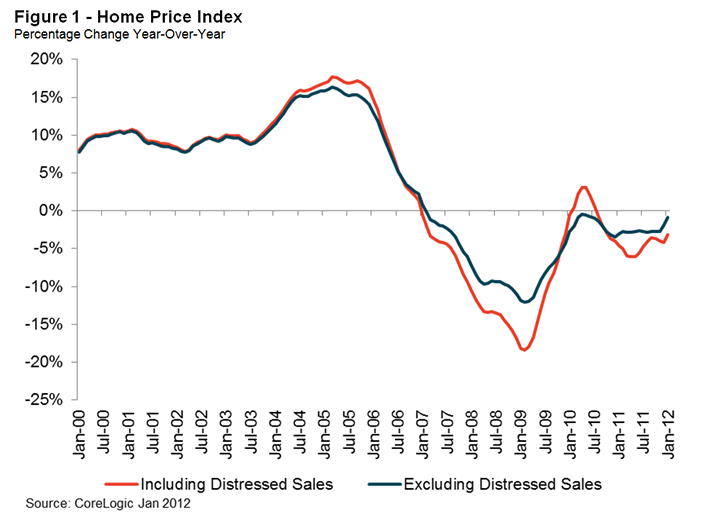
|
| NATION-WIDE PRICE DECLINES |
NATION-WIDE PRICE DECLINES. One much-mocked slogan from the real estate boom days was: real estate prices never go down. More precise words which justify ever saying such a thing are: national home price averages have not declined significantly in 75 years when corrected for inflation. But regional prices bounce around plenty. Deception lies in hinting overstretched homebuyers can't lose their shirts, which they definitely can and definitely will. However, the underlying steadiness of real estate values resurfaces if bursts of irrational exuberance average against sudden bouts of panic. When reversion to the mean is recognized, it might be fairly cheap for the real estate market to re-insure itself, one region (or time period) balancing another. Distressed housing is generally found in regions of an industrial slump; such regions need stimulus. Inflated house prices are found in gold-rush regions; they need restraint. We have said in other places that a universal 20% down payment would be required to protect individual mortgages against the risk of a major national decline in house prices; in earlier epochs, such down payments were regularly demanded. However, if one region's downs balance against another region' sups, the remaining risk would be the simultaneous national decline, which must be rebalanced over longer time periods. By definition alone, that's less common, hence cheaper to insure against. It can still occur, but there would be more tranquil time to build up loss reserves. We might as well say right here that sad experience with political raids on entitlement "lock boxes" (like Social Security) emphasize the need to protect reserves from politics by sharing control with independent entities.
The suggestion made here is: to divert the capital gains tax liability of real estate sales away from the U.S. Treasury, toward a fund for purchasing bank equity in depressed regions. This is regionally counter-cyclic and can be made nationally counter-cyclic because although more equity expands the ability of banks to loan, investors suspect a bank is in trouble whenever it announces a public stock issue. (Of course, selling stock might also mean the bank has more business than it can handle). Sales of bank stock by the proposed fund, however, would always be regarded as a sign the bank really doesn't need assistance. Periodic rebalancing of the fund should amount to buying low in one region or time period and selling high in another, generating more long-term reserves for really severe national dips. The one voiced concern with this scheme is that the present $250,000 capital gains exemption on home sales might unduly starve the fund; one more example perhaps of political meddling stimulating unwise real estate ownership but nevertheless suggesting a possible adjustment lever for implementing the counter-cyclic intent of the scheme.
The point of using capital gains liability as a funding source is a general perception that the government isn't exactly entitled to tax capital gains created by inflation. Using a pro-cyclic revenue source for a counter-cyclic program should force the fund to respond to market forces for raising cash, propelling it toward hard-nosed investment choices when pressure builds to spend it for political purposes. But, if additional revenue exactions from homeowners ever prove to be needed, they should be voluntary, matched with participation rights. Involuntary taxation would be much resented; people threatened with a foreclosure cannot contribute, while anyone with 20% equity in his home is secure and does not need additional insurance. So, holding adequate equity in the house should excuse a homeowner from the reinsurance scheme, thus creating an inducement to save up to reach that threshold. It should be noted in passing that holding an 80% mortgage, whether by down payment or paying it off, considerably reduces client temptation to "give back the keys" when sales values decline below the size of a mortgage, because of it's less likely with a buffer zone. Surrendering the house has even acquired a wry description based on two keys in an envelope: "Jingle equity."
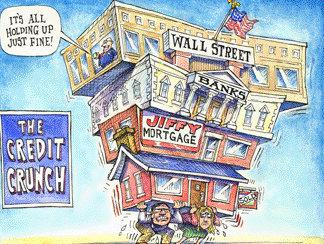
|
| MORAL HAZARD2 |
MORAL HAZARD. Much has been made of the risk that an originating bank will exercise less care about loans to risky clients when the plan is to sell the mortgage immediately to an aggregator. Some salesmen are "predatory", some clients are "dodgy". Loans which do not even require verification of the borrower's income or assets are "liars loans", ranked in the "mezzanine class of Alt-A" to obscure the real meaning. Almost immediately the cry has gone up to make the originating banks "have some skin in the game", which is to say they should retain a portion of each loan in their own portfolio. To do so would reduce the bank's working capital and hence its ability to loan so much, evidently a good thing at the moment. Just how much of each loan to require would have to vary with the economy, raising the question of who is to say.
Computers, which did so much to bedazzle these matters, ought to be able to clarify them as well. It seems possible that to label the tranches with their varying proportions of originator retention might be adequate because the market would penalize risky behavior at a higher cost. It might not be necessary to go even this far; maintaining a rating system for different originating banks, based on their default rate at two years, or delinquency rate at six months, might serve the purpose. Some sort of informal arrangement already seems to be operating among "vulture" investors. Mortgagees report that if they miss a mortgage payment, their credit card interest rates mysteriously go up within two weeks. With similar reporting system in place, it should not be difficult to evaluate the differences between banks which had originated mortgages, and in turn label for investors, the risk history of various tranches of various mortgage-backed securities. The great attractiveness of securitized loans is their efficiency and reduced cost. When hazardous behavior leads to higher costs for the perpetrator, the market will take care of the discipline. If clever computers make it harder for crooks to conceal responsibility, matters may quickly respond.
EXCESS LIQUIDITY. It's quite plausible to contend the housing crash had its origin elsewhere, in tidal waves of money from abroad. In that case, fortifying the mortgage market will only lead to bubbles somewhere else. Oil is a likely example, and commodities, in general, seem a likely place to look for the next bubble. After that, some other bubble. Eventually, "nominal" inflation will resemble a giant swiss cheese, with only wages standing as "core" inflation. Since cheap labor abroad started this whole spiral, eventually American labor will find its wage level effectively depressed to match the foreign one by the inflation of every other cost in the economy. Somewhere along the line, foreign labor will lose its price advantage, and foreign consumption will rise to equal our own. The attractiveness of immigrating to America will decline, as will the attractiveness of buying American stocks. Buying American goods will increase, however, and somewhere an equilibrium will be achieved. Only efficiency enhancement seems like a nearby frontier we can conquer, and the securitization of debt is one of the great efficiencies of the century. The most important thing we can do about the real estate credit crunch of 2007-2010 is to recognize that it grew out of comparatively minor fumbles with a magnificent idea. Let the financiers pick up the ball, and run with it.
Securitized Debt: Fumbled, But Magnificent

|
| Merrill Lynch |
Merrill Lynch admitted it lost a hundred billion dollars in 2008, maybe more. To read the news accounts, one would suppose the only news was it overpaid its executives. To put the matter in some sort of perspective, the really astonishing thing was they lost $100 billion -- and didn't go bankrupt. Just imagine how profitable business must be to take losses like that, with maybe more to come, and remain standing. Securitization of debt may be hard to understand, but it's gold mine. Mortgages are currently the biggest part of it, but securitization -- changing debts into bonds--can apply to any debt, so we are discussing a fundamental change in the definition of debt which generates enormous efficiencies. The government-subsidized variety held by Fannie Mae and Freddie Mac represents half of the mortgages in the country, some $5 trillion dollars worth, equal to the national debt. The other half was fast on its way to becoming involved in the private-sector variant, Collateralized Debt Obligations (CDO), when the markets nearly collapsed under the strain. Let's do some rough math.
The fundamental insight was that risk was overpriced in the market. Since sovereign governments can print money, their debts will always be paid; they are risk-free if you ignore inflation. Thirty-year government bonds pay 4.5% interest, so thirty-year private debts must pay more because they contain some risk of default. The extra interest, which normally varies from one to thirteen percent, is called a risk premium. During inflationary times, the risk premium can be considerably more, but then it's an inflation-risk premium. Loan sharks often charge fifty percent on top of normal interest; call that the Mafia premium. Whatever. The central point which has only recently been recognized is that computers allow you to calculate the actual rate of default on risky mortgages. The going rate of the risk premium had long been priced considerably higher than the actual experience of default. The risk premium was bigger than the risk. Once you know that, you see that only one problem remains: how do you capture that extra interest rate, and pocket most of it yourself?
That's really all there is to this supposedly complicated business. The incentives are huge. If you could extract one percent from $10 trillion of American mortgages, you would extract what Merrill Lynch just lost, a hundred billion dollars. A conservative guess might be that the "un-earned" risk premium of American mortgages would come close to a quarter of a trillion dollars, every year. That's just home mortgages; there are plenty of debts with other kinds of collateral. So the gold rush was on. The influx of Far Eastern and Middle Eastern money drove down interest rates, so it became comparatively easy to borrow huge amounts of money to lend out at a premium that still looked pretty good to the home purchaser, but left plenty for the packager. The ingenuity of this packaging and the monumental task of organizing an international distribution network are not to be scoffed at. But it is not described here, because it distracts attention from the main points. This was a gold rush, it was quite complicated, and there were loose ends that nearly toppled it.
But the fact nevertheless remains that all economies for all time will be stimulated by a permanent reduction of interest rates in the debts of every nook and corner of life. More people everywhere will be able to afford things they couldn't afford, and it will be a legitimate part of commercial life, not a government hand-out.
Nevertheless, there are losers. Over a period of eighty years, Fannie and Freddie had gradually accumulated half of the mortgages in America, by enjoying an informal guarantee by the Federal Government with its printing presses. Their rates were lower than commercial rates, so why wouldn't a homeowner take advantage of the fact? However, these new Wall Street arrangements which nobody seemed to explain, might be cheaper still. Since the securities were effectively bundles of thousands of mortgages, everything depended on what proportion were held by sound honest people, and how many were held by, let us delicately say, subprime borrowers. In the hurry to get into the Gold Rush, inadequate information was collected, and some of it was just plain inaccurate. It would have been a straight forward administrative task to devise a safe system, but there was no time. The first to move into a new field sweeps the field.
So now there remain only the Government Sponsored Entities, Fannie and Freddie, to re-insure home mortgages, because in the panic the market for CDOs pretty well dried up, and why not. The immediate problem is that years of political influence peddling has undermined the quality of these giant organizations, currently enjoying panicked protection by allied Congressmen up for election. The government has teams of accountants combing through their books to see if they are salvageable. The Secretary of the Treasury said ten times if he said it once, that by guaranteeing the debts of these agencies, he has doubled the national debt. It doesn't inspire confidence to hear that.
But even if Fannie Mae can be patched together for the short term, there is a long term concern. Eventually, Wall Street will get its shop in order, too. At that point, it will be possible to know if the efficiencies of securitizing debt result in lower rates to the customer -- than mortgages subsidized by the government. If it's anywhere near close, our government made a bad bet, worth $5 trillion dollars.
After a Year of Crisis, Fannie and Freddy Finally Get the Spotlight
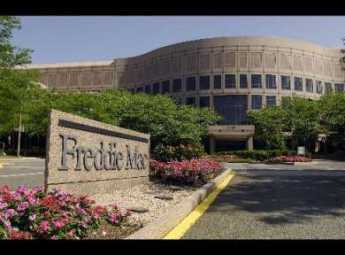
|
| Freddie Mac Corp. |
A year after potential financial collapse burst on the scene, the public (and Congress) are beginning to understand what collateralized debt obligations (CDO) are, and how Fannie Mae and Freddie Mac work. It begins to seem they are much the same thing in different clothes, that securitization of mortgages began with Fannie Mae if not Farm Credit in 1916, and that these bewildering new Wall Street CDO creations are just new variations of an old idea. The devil, as always, is in the details.

|
| Freddie Mac Corp. |
Originally, Government Sponsored Enterprises (GSE) began in 1916 with the Farm Credit System and entered the home mortgage secondary market in 1938 with the creation of FNMA (Fannie Mae). Populist in the first case and Depression-fighting in the other, the idea was that third-party reinsurance would make mortgages safer, and thus lower interest rates for a favored population segment (farmers and homeowners). Although no promises were made to bail out failing loans, GSEs eventually grew large enough to seem able to force the government to rescue them in the event of failure. They were claimed to be "too big to be allowed to fail". In addition to this implicit government backing, there was a twist created by making debt interchangeable with equity. "Securitization" was a process of bundling many mortgages into a package sold to the public as a stock issue. Since FNMA was a creditor, rising interest rates created profits for the shareholders, while falling interest rates depressed share prices. Steady predictable mortgage prices could be offered to homeowners, while the risk was transferred to the shareholders. To a certain but much lesser degree, some of the risks of falling real estate prices were transferred to the shareholders as well. Finally, the reduced risk in this arrangement led to lower prices for mortgages, regardless of the state of the economic cycle.

|
| Michael Milken |
To some unknowable degree, enthusiasm for mortgage-backed securities in the private sector was enhanced by fear or even loathing of government involvement in the financial system style of banana republics or the Weimar Republic in 1922. To compete with the lower interest rates of government-backed security, the efficiency of the private sector could be combined with innovations made possible by the computer. Mathematical models were devised to calculate mortgage interest rates by working backward from the default rate in a huge universe of mortgages. During the savings and loan crisis two decades earlier, Michael Milken had promoted the idea that prevailing interest rates on mortgages were higher than were justified by the prevailing rate of default in a large pool. If the uncertainty of risk for a single mortgage could be submerged within the fairly certain risk of a large pool, it should be possible to offer generally lower prices than even those of the government-backed GSE system. In spite of the recent panic, the reasoning behind both systems, government and private, seemed to suggest that securitization of debt continues to be a sound idea.
What appears to have been unanticipated was that house prices would rise in a bubble stimulated by a flood of money from the Far East and the Middle East. When that bubble inevitably burst, the resulting drastic decline in house prices would trap everyone who had borrowed a fixed amount as a mortgage at the top of the real estate market. Those who bought and held their houses before 1980 could ride out the gyrations of the real estate market, but everyone who bought an overpriced house after that was at risk that prices would eventually return to normal -- and bankrupts them with that high fixed debt. If these people outnumber the rest of the country, they can use their voting power to force the rest of the country to bail them out, but that's the way civil wars get started. It remains to be seen whether some political compromise can be arranged between those who bought houses at foolish prices, those who felt enriched by owning more valuable houses, and those few who watched with dismay.
Meanwhile, there is another important decision to be made, as to whether to permit either form of securitization to be used as an American scapegoat for a mess caused by Chinese prosperity. There is indeed much to be criticized in retrospect about the conduct of Main Street, Wall Street -- and K Street.
Second Mortgages Want to Be First

|
| Chrysler Logo |
In a bankruptcy proceeding, there has long been a traditional conflict between the holders of first mortgages and the holders of second mortgages. It goes like this: since the holder of a first mortgage gets paid first, his incentive is to hurry up the process and get the money. The holder of a second mortgage, however, only gets paid what is left, so this party will normally wish to stall proceedings in the hope the market will improve and give the second mortgage a better payout. Normally, this sort of predictable dispute is covered by contracts, and in any event, most banks hold both kinds of mortgages and are neutral about what is just and fair. In the current banking crisis, however, the major banks have developed an incentive to favor the second mortgage, so they have a new view of what is just and fair. Four of the largest banks hold a total of $440 billion of second mortgages but have very few first mortgages because they were sold off in the securitization process. The banks mostly retained the function of servicing first mortgages, however, so they now have quite a conflict of interest.
Something like this seems to be going on with the resolution of the Detroit auto makers, with the difference that politicians tend to favor the interest of the auto workers in the bankruptcies because there are more voters to be influenced. And in the case of the auto companies, there are stockholders who will be wiped out by a bankruptcy unless the liquidation of the company assets produces enough cash to satisfy the creditors, secured and unsecured. After all, stockholders aren't creditors at all; they are owners of the company. No matter how things turn out, however, the secured creditors would normally have the first call on whatever is salvaged. So, it's one class of secured creditor against another, or else it is the secured creditors against the "stakeholders", employees or any other unsecured creditor. If the government intervenes, there is the additional issue of the Fifth Amendment of the Constitution, which prohibits the government from the "taking" of private property without just compensation. Representative Conyers of Michigan, whose political allegiance is not in doubt, has introduced legislation to prohibit lawsuits in these matters. So now, the prospect grows of a constitutional clash between Congress and the Supreme Court, over the Constitutionality of such a law which denies due process. So that gets us into the fourteenth amendment, too. If we look beyond the technicalities, the looming clash is between President Obama and Chief Justice Roberts. One of them wants to take money from secured creditors and make it available to someone with more political clout; and the other surely wants to preserve the sanctity of contracts, the rights of property holders, due process, and the right of the Supreme Court to declare contrary laws to be unconstitutional.
Unless someone backs off, the situation would seem to be as monumental as Franklin Roosevelt's Supreme Court-packing proposal. Because -- there is every reason to anticipate a 5-4 vote by the Supreme Court, a 5-3 vote if Justice Souter is not replaced by that time, and strenuous efforts to alter the balance.
Commercial Credit Sinks Globalization
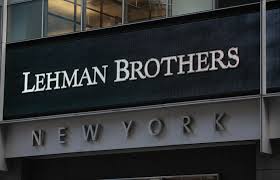
|
| Lehman Brothers |
In August, 2007, the world sort of woke up to the housing bubble in California and Florida, along with the ingenuity of securitized mortgages. About $100 billion was involved, and credit markets froze up as the risk premium of low quality loans (relative to U.S. Treasury bonds) gyrated furiously, almost always in the direction of down. There was a staggering amount of credit default swapping, some $60 trillion, but it did not seem to be unraveling. Why in the world did a problem of that magnitude, while admittedly large, lead to continuing panic which was widely believed to require $4 trillion in rescue funds eighteen months later? There were obviously some big missing pieces of this puzzle. Worse than a money panic itself, was the realization that we only understood about 5% of the problem after a year of investigation.
The case in point is that in the fall of 2008, world trade almost came to a total stop. How does $100 billion of dud mortgages in California, discovered a year earlier, do that? It would appear that Lehman Brothers was one of four or five large banks who were so overstretched in securitized mortgage debt that it looked as though they would collapse without huge infusions of government money. The government rescue team knew they could not rescue every bank that looked shaky, and they knew that rescuing anybody carried the risk that this kind of episode would be repeated in the future, as a result of knowing that any sort of risky behavior would be protected by the government treating big banks as "too big to fail". To bring the collapsing markets to their senses, some relatively big bank had to be allowed to fail, and it turned out to be Lehman. The CEO of Lehman afterwards expressed public bitterness that Lehman suffered while others were saved, but it was clear that there were too many people in the lifeboat, so someone had to go overboard or they would all sink. Lehman went bankrupt.
What had not been considered in the choice of Lehman, was its heavy involvement in commercial credit, short-term loans, sometimes only overnight, with inventories as collateral. Because of the huge volume of commercial credit, with extremely fast turnover, the conventional payment mechanism was a repurchase agreement. In a repo, the loan takes the form of a sale with a guaranteed agreement to repurchase in a short time. The mechanics of lending are greatly simplified by actually selling the inventory of, say computer chips, for enough more to pay the interest cost, associated with an agreement that the lender owns the security outright if there is a default by a date certain. The arrangement is very clever and efficient, but it has one flaw: the bank really has no use for a boatload of computer chips. Commercial credit repos had grown to immense size. When the banks encountered a credit freeze, the collateral simply could not be transformed into anything useful to the banks, even though industries throughout the world were on the edge of collapse for lack of components to assemble. It was a dangerous mess, all right.
Underlying all of these moving parts was globalization of the industrial process. It was not very long ago when automobile manufacturers like Ford would own the majority of the steps in the process, down to growing trees to provide wood for the floor-boards. Or IBM would make substantially all of the parts of a computer and assemble them as a a final product. But, in order to take advantage of cheap labor or available resources of other types, pieces of components of cars and computers started being fashioned together in several foreign countries and shipped to another foreign country for assembly. In the most extreme case, only the design and marketing of a product might take place in America, while everything else was assembled in many places. Almost every step of a complex manufacture involved paying the subcontractor for his piece, using the pieces as collateral for a loan to pay for itself. Because a tangible price was being charged for delays in the process, "Just in time" assembly was absolutely essential.Everything had to work like gigantic clockwork, but if it did, it considerably reduced the price and increased the sales of the final product.
The collapse of Lehman Brothers (ultimately triggered by real estate mortgage securities), caused the whole world's manufacturing to come to a halt in just a few days. When the nature of the problem became apparent, it was comparatively easy to patch up, at least by a government savior who had unlimited amounts of money available, and was willing to spend "whatever it takes".
What's left to do, now, is to figure out a system that will prevent international trade paralysis without slowing down or eating up the profitability of globalization. A great deal is at stake in repairing a problem we didn't even recognize as a possibility. And probably similar things remain to be discovered.
After Six months
Phase One: An early recession, with ominous signs of inflation. (Six months of blind man's buff. Stocks down 8-10%, signs of inflation, moderate foreclosures, house prices decline around 10%, increased unemployment, consumer confidence down, oil and gold up, dollar down.)
Phase Two: Government attempts to put out fires. Priorities are set by emergencies as they arise. So far, lowered interest rates, $600 per person stimulus package, offers to substitute government bonds for securitized debt, expand Fannie Mae. The critical need is to abandon these approaches quickly unless they somehow correct the underlying problem and assist in long-term reforms.
Phase three: Long term reform. Task forces, gathering ideas from all sources, seek to identify the critical issues that caused this problem and keep it from happening again. Dangers: politics (D v R), conflict between East (mainly concerned with fuel prices) and West (mainly concerned with housing surplus), foreign meddling or hostility, collapse of China or other developing economies. We may assign too high a priority to those who are suffering, and neglect to do what will work. Some short-term emergency may get out of hand and disrupt more basic solutions. All problems begin as solutions.
==============================================================================
What are the possible underlying problems?
1. We have too much debt and leverage, and far too much is concentrated in home real estate mortgages. Did the slanted tax exemptions do this? Did the innovative mortgage methods do it? Did we develop an excess inventory of houses just by too rapid a pace of good things?
2. The cost of buying a house is greatly in excess of the cost of renting a comparable house, overturning a century of the previous history. Meanwhile, owner equity is less than half of national home prices. If prices decline, owner equity will be even less.
3. Banks and insurance companies are becoming obsolete. Should we rescue them, or put them out of their misery?
4. Wall Street got rich by doing obscure things. Should we punish them, or are they the only people able to save the situation?
5. What will we do if China collapses, the cheap dollar ruins Europe, or international trade is paralyzed by protectionism?
6. Should we revise the entire world monetary system, either by going back to a commodity-based currency, or switching to an equity-based currency? If that is too radical, how do we control a completely debt-based currency now that its flaws are appearing?
Bank Accounting Off the Books

|
| Banking |
Banks have long operated in a dual system of regulation, state and federal, which permits some shifting back and forth between regulators. Mergers sometimes confuse matters further, and a system of one-bank holding companies adds to the stew. Local banks, waving the red shirt of domination by Wall Street at their state legislatures, have resisted interstate banking in a wide variety of ways. Sometimes a customer finds that funds transfer between two branches of the same bank must be treated as out-of-state action, and so on. Inevitably there is a certain amount of dealing by subsidiaries which are not recorded on the books of the home bank of a bank conglomerate in ways prescribed by the subsidiary's regulator, or not recorded at all. Equally inevitable is the accusation of off-the-books illegality by competitors, politicians, or the merely captious. Fine points of these legal and accounting arguments must be left to experts, peer review, and courts. Muttering Enron at every opportunity, accusers may be right that some of these arrangements have stepped over the line; partisans in Congress and the legislatures, on the other hand, may be correct that existing law is bad law. This is not a good place to debate either point.

|
| Credit Crunch |
It does seem appropriate to notice that banking has long been massively inefficient and that much of this inefficiency has been imposed by regulators. Regulators represent the public, more or less, and the public is rightly nervous about stewardship of its assets. Dual regulation offers refuge from the ancient fear of confiscation by the sovereign and is worth a certain amount of inefficiency if it works. But it does create loopholes, and it does impair transparency. In the case of the credit crunch of 2007, it sequestered bad debt in off-the-books ways, perhaps creating tax avoidance, but mainly creating distrust among counterparties. In those days of awful turmoil, no one knew what was going on, multi-billion dollar losses were being confessed by premier institutions, so transactions were delayed, avoided, or rejected. Transactions with anybody. When the time comes to reconsider regulations, it should be emphasized that by far the most damaging component of the whole mess was lack of transparency. Once more, a massive computer programming effort is entirely capable of restoring transparency to the existing regulatory structure, highly pigglety though it may be. After we achieve transparency we might consider achieving efficient transparency, and after that perhaps ponder fairness in transparency. When a trader calls another and asks to buy a zillion shares, the happy recipient of the call likes to glance up at his screen to see what the other fellow is worth, before he shouts, "You got it!"
What the Federal Reserve might well call the highest priority calls for respect, as well. Ever since we began the century-long transition from a gold standard for money, there has been a concern that the Fed might not be able to determine how much money, or credit, or liquidity -- is actually in existence. We have reached a point in this process where the Fed has largely stopped trying to measure monetary aggregates, and merely adjusts its tools to keep the money supply sailing between the rocks of inflation and recession; if neither rock is in sight, the amount of money is about right. That system has served us for eighteen years, long enough to spark hope that it can be permanent. But when a rocky shore does make an appearance, the Captain of the ship must know how much slack he has, and how reliable his sonar. For huge sums to be obscured within bank subsidiaries or delayed marking to market, is to increase the chance we will run up on the rocks when it might have been avoided. He too needs transparency, but he also needs prompt obedience to his orders. The rest of us passengers are rightly concerned when he appears before Congress and admits he is not sure what the situation is. As long as that is the case, fairness -- and dogma -- be damned.
Taking a step backward, the whole credit crunch has brought to the world's attention that real estate transactions are both immense, and immensely inefficient; a great deal of money is to be made if any step in the chain can be streamlined. Therefore, real estate agents, real estate lawyers, title insurance, surveyors, advertisers, inspectors and everyone else who makes a living from real estate sales -- can expect to be drawn into an annoying process of inspecting the premises, promises, kickbacks, referral fees and marketing costs of a whole expensive process, first blasted open to inspection by implementation defects while computerizing the mortgage step. It appears to be high time for it.
High Oil Prices and The Federal Reserve: Chicken or Egg?

|
| Chicken or Egg? |
Although there is little public gloating from the green environmentalists, the price of oil has finally and decisively soared, with Americans actually taking public transportation to work. Although it would seem that more conservation would result from paying attention to household heating than to automobile mileage, it is summer and vacation driving is more on the public mind than buying sweaters for a lower thermostat setting. The rise of oil prices by 40% in a year has started conspiracy theories and drags the Iraq war into the presidential election chatter. It's quite true oil consumption could not have risen 40% in the developing world of China and India, and nothing drastic has happened to world oil reserves or extraction. A glance at the accompanying charts shows that oil prices have risen much like commodities in general; it
Fixing the Financial Mess
Two years after August 2007, it remains uncertain whether we know enough about how the great financial disaster came about. There may be other shoes to fall on the floor, announcing unexpected dimensions of our problem. In particular, the recovery may be brief, followed by a resumption of downward trends we had hoped were finally behind us. That seems to have happened in 1937. If it happens again in 2010, what seemed like a three-year recession may prove to have been a twelve-year one, with early successes exposed as mere flashes in the pan.
Nevertheless, politicians are searching for answers to give the public; no one wants to delay solutions if they exist. Analyses can be revised if new information appears. Presently attractive approaches can be divided into three categories: International, Regulatory, and Goal-focused.

|
| Martin Wolfe |
International monetary diplomacy. There is a fairly uniform agreement that a major source of instability came from the unprecedented transformation of third-world countries into economic powerhouses. As many as a hundred million people were raised up from poverty in less than a generation; there was an inevitable commotion in the world's economy as a result of a fundamentally very good thing. The British economist Martin Wolfe is the chief spokesman for the view that there was almost nothing the Americans could do about the upheaval, although the Chinese government made it much worse by pegging its currency too low. This line of analysis leads to the proposal of world monetary diplomacy, offering the Chinese greater influence in the International Monetary Fund in return for floating their currency, and negotiating a greater role for the IMF in world finance.
Regulatory restructuring. With or without the creation of a new international monetary order, others feel that individual nations must create internal regulatory barriers to prevent the ebbs and flows of international currency from circumventing local laws, upsetting local stability. The problems daunting this approach are two: many nations will fail to respond adequately, with consequences which could overwhelm those nations who institute responsible reforms. And second, the recent pace of financial innovation has been so rapid that regulation is easily circumvented. Draconian controls would surely lead to a loss of local competitiveness, and disadvantaged local captives would soon rebel. Urgently needed regulation and effective regulation often prove to be two different things.
Goal-focused adjustment. In recent decades, considerable success resulted from forcing the system to produce a certain desired outcome, essentially ignoring the myriad intermediate adjustments. Inflation targeting has come to be a description of stable prices forcibly maintained by one technical method (also called inflation targeting in a narrow sense). It lets the economy produce its own responses, and if necessary lets academics produce their own explanations. Unfortunately, this approach in time translates into Congress announcing there shall be no inflation, and the Federal Reserve responds, lo, there is no inflation. Since Congress has very little idea what is involved in this process of waving Merlin's wand, transparency, financial innovation, and reduced transaction costs can suffer unduly before the underlying dynamics reach the surface of public awareness. In short, there are too many hidden steps between public awareness and the feedbacks which modulate the policy. One of those steps is apt to be a blatant denial that policy had a given adverse effect.
Federal Reserve Rolls the Dice

|
| Lehman Brothers |
For the year preceding, it was general opinion that the financial crisis was caused by $100 billion or so of mortgage-backed securities, mostly California and Florida home mortgages. But around Labor Day 2008 Lehman Brothers collapsed, and the problem became twenty times as large. What that was about is unclear, but seemingly had to do with money market funds being treated as "funds in transit" in consequence of the international monetary agreement known as Basel I, and thus not requiring bank reserves to be maintained for them. It will take time to unravel the intricacies of, and assign the blame for, this mess. However, the markets responded by refusing to trade at now uncertain prices, thus "freezing up". The response of the Federal Reserve was to double the money supply through international markets, mostly using "Central Bank liquidity swaps". The participation of various countries in this action has not been made public.
The doubling of the money supply required borrowing between one and two trillion dollars. After five months, or just after the inauguration of the new Presidential Administration, the markets had seemingly started to function more normally, and the stock market had rallied somewhat. The obviously bewildered leadership of both political parties agreed to the proposal to purchase $1.75 trillion of the troublesome assets, taking them off the market and presumably hoping the markets would function as if they did not exist. By July 2009 this operation was only about half completed. Not only was there disagreement about what these securities were really worth, but the banks which held them were reluctant to allow prices of what they continued to hold to be driven down by comparison with these forced transactions.

|
| Federal Reserve Bank of Philadelphia |
In any event, the second stage of this huge government bailout of the banking system is projected as follows: The portfolio of assets would be worn down, either by allowing debts to mature, or by selling them at what is hoped will be advantageous prices. Who will buy them is to some extent dependent on the state of the economy, and to some extent on the perception of the fairness of the pricing. The Federal Reserve Bank of St. Louis has been assigned the task of designing a public formula for how much to buy or sell, depending on selected indicators of the economy. A public formula is felt to be necessary in order to reassure the markets that purchases and sales are not being made in response to secret information or unsuspected problems.
The reasoning would be that if these assets are sold to speculators at fire-sale prices, the money supply will shrink inappropriately, and the recession will be prolonged by the need to borrow replacement reserves for the monetary system. Unduly profitable sales would probably lead to inflation, since the present level of monetary reserves is twice as large as was thought appropriate, as recently as a year or two ago. But this maneuver by a central bank has never been tried before, and the results may well differ from present predictions. The Federal Reserve is prepared to take as long as ten years to accomplish the complete maneuver, but that plan presumes ten years of recession and five congressional elections. It also implies that the economy could swing between 7% annual inflation, and 7% annual deflation, in the two worst cases, and assuming nothing extraneous happens to the economy.

|
| President Barack Obama |
In the meantime, two other ominous notes. Although the nationalities of the lenders have not been made public, one can safely assume the Chinese are a major component. Since they are refusing to lend us money beyond two, and at the most five, years, we would be indefinitely in the position of borrowing short and lending long. In other situations, that imposes a risk of depositors starting a run on the bank. And secondly, it is hard to imagine that Mr. Obama's presently ambitious programs in healthcare, environmental protection, two wars and several election cycles, will be allowed to proceed without enormous public resistance to even further fiscal deficits.
U.S. and E.U. Exchange Experiences (1)
THE Global Interdependence Center (GIC), founded by Nobelist Lawrence Klein in 1976, brings noted foreign financiers to address Philadelphians interested in finance, and takes those Philadelphians abroad to return the visits. It's a gracious, entertaining, and highly stimulating travel club of very nice folks. Its 25th Annual Monetary and Trade Conference (in 2001) was especially exhilarating. Christian Noyer, President of the Banque de France, gave a description of the rationale and direction of the European common currency. Since he was the Euro's driving force right from the beginning, the experience of hearing him was pretty much like hearing Alexander Hamilton tell the story of the founding of the American banking system. Such a notable event needs to be reported.
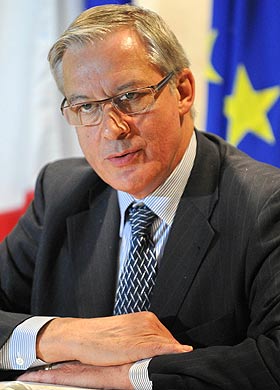
|
| Christian Noyer |
Christian Noyer urged that the central concept of the European Union is deliberate, voluntary surrender of national sovereignty -- for a mutually beneficial purpose. The declared purpose of the limited surrender of national control of the currency is economic; price stability, lower interest rates, the stimulation of international trade by lowering transaction costs. But the unstated, grander, purpose is the elimination of war. Because the limited technical purpose has been achieved in almost all areas, the grander purpose of eliminating war has not been an accident. With this simple, even humble, declaration it immediately becomes possible for a mildly irritated American audience to understand that European reluctance to become our active military ally grows out of a highly commendable set of motives, and widely differing historical experiences.
<As things worked out, the new nations who have recently joined the Union ("The U") are anxious to modernize, because the people of those nations demand modernization and their leaders must agree to achieve it. Inflation, that hitherto inevitable fund-raiser for national governments, must be eliminated in order to join and stays eliminated because the other members of The U will not tolerate it in a partner. In his curious way, "price stability" has placed the Union on the side of the people against the locally powerful, although it would be untactful to emphasize it. From the elimination of inflation comes lower interest rates, and from that, a stable currency. From that comes economic growth, for which the political lingo seems to be "modernity". As a consequence of this undeniable success, all nations in the area want to join the Union, and none wants to leave it. If that prevailing attitude doesn't lead to the elimination of what might then be a civil war, it's hard to know what will eliminate it. The marvel of all this skillful analysis is how natural, soft and modest it sounded, feeling like an old soft shoe. Eventual political unification is clearly an old dream in Noyer's head, but for now, he seems content with the vindication that it is possible to have a currency without having a country control it. It seems to be a steamroller of economic logic, flattening out the pretenses of merely political power.
No less an economist than Martin Feldstein has written that stable unified currency is doomed in the European context of widely diverse labor markets; Noyer seems pleasantly serene in the face of this argument. He wouldn't say so, of course, but some in the audience got the idea that Noyer probably believes the power of this cooperative idea will eventually discipline the unions the way it disciplined the politicians. One certainly hopes so, for the sake of this smooth, likable French aristocrat.
Compromise Outside the Borders of a Debate

|
| Cardinal Mazarin |
For example, the north European states, Germans, in particular, must resign themselves to subsidizing the Mediterranean nations for years to come, working a hard work ethic while they watch their wards live an easier one. But it can be accomplished; New England has been subsidizing Mississippi for more than a century, and Appalachia has been fighting the rest of the country's wars for them since 1860. The South was always more feudal, had a more distinct class system, had a culture of upper-class military schools, whereas the North had a background of largely religious reasons for emigrating to the New World. Lincoln, for example, was an ardent Whig, which in those days meant an advocate of helping commerce by the intervention of government. That is essentially a 17th Century French idea, said to originate with Cardinal Mazarin and Jean-Baptiste Colbert. Whether it is useful to continue the same idea for four later centuries is an emotional issue in a class with our own reluctance to change a word of the Constitution. There is even a shadow of present concern that Americans will have so forgotten the lessons of free interstate commerce that they might somehow surrender it for some other blandishment. Certainly, free international trade has its enemies. The abolition of slavery was, of course, an overdue achievement, too, but perhaps our long slog toward equal rights has allowed this second crusade to overshadow the history of what really was the main one. In case anyone feels impelled to start a quarrel about this viewpoint, let me remind him that Quakers started the abolition movement, right here in Philadelphia, and have nothing to apologize about, for maintaining the Union was a more important justification for Civil War that was the abolition of slavery.

|
| Jean-Baptiste Colbert |
With the American Civil War repeatedly reminding us how dangerous it can be for even unified nations to disagree about vital regional issues, it is useful to review such American inter-state friction even closer to the time of unification, namely the repayment of Revolutionary War debts. Here, the American post-unification memories were still about the same as pre-unification. Essentially, only the legal documents had changed very much. Secretary of the Treasury Alexander Hamilton was trying to arrange equitable federal assumption of all thirteen state war debts after Virginia had already paid off its bonds and obviously had thus given up the leverage of refusing to pay them. Virginia at that time was the largest of the component states, and because George Washington was President, Virginia was politically very powerful. But submerged within the now more powerful national government and subject to its rules, Virginians were now in quite a new position. Because Hamilton was trying to establish a good international credit reputation for the new national government, and because he wanted to acquire a creditor's power over all the states, he was anxious for the federal government to assume all state debts. Naturally, Virginians believed they would not have paid off the bonds if they had known this was coming. That's different in this case from knowing the rules before they acted. Imaginative alternatives were limited because the recent war had left no money in any treasury, or even likelihood that foreigners would extend credit. Because the Europeans chose to create monetary union as a step toward political union, the problem confronted European negotiators who were still positioned on behalf of independent sovereign states. The Greek government was skirting close to default on its bonds, whereas in the other case the
The solution reached was to mollify Virginia with a political plum, the location of the Nation's capital named Washington across the Potomac from George Washington's home, potentially directing the flow of Atlantic trade to the Potomac and to Virginia. Philadelphia was intensely displeased, and there are remarkably few statues and mementos to Virginia patriots to be found in that city, even today. However, the political maneuver remains as a classic; when negotiations reach an impasse on some central issue, try to balance the political debt with arrangements which have little to do with the issues at hand. In the case of the European Union, the Greeks have no money and probably can never repay the present bailouts, let alone any extra future indebtedness. Because of the recent international recession, other sources of funds from unrelated nations may well be unavailable. Argentina has recently nationalized a huge Spanish oil developer operating on the Argentine property, so there is a question whether the Spanish banking system is affected in some way that will further strain the Greek default, and thus further drying up sources of European credit. China is beginning to show signs of the Liquidity Trap, where ample funds are available in its banks but no one wishes to borrow money to build facilities, to produce goods, which the Chinese may not be able to sell. So, there are signs available to even the casual observer that it may simply not be possible to find the money to finance another Greek bailout, except to go back to the Germans. Since Adolph Hitler within recent memory had come close to conquering all of Europe militarily, there is understandable reluctance to appeal to Germany to become the rescuer of Europe, financially. The situation thus comes close to crying out for a solution that benefits some rescuer other than Germany, or which benefits Germany in some way that is not monetary. Like it or not, Germany has already rescued East Germany once, Greece at least twice, and can expect several more decades of subsidizing its less provident fellow Europeans. It is getting to be time for the rest of Europe to express its gratitude in some tangible, visible way.
Lowering the Taxes on Corporations
In the early years of the 21st Century, Ireland lowered taxes on corporate profits to a 12.5% rate, far lower than neighboring countries. Whatever else it did, it promptly encouraged corporations in Germany, Denmark, the United Kingdom, and other neighbors -- to move headquarters to Ireland where taxes were so low. Ireland is primarily rural, and a housing shortage developed in the cities as workers migrated to take advantage of the new jobs. Home prices went through the roof, mortgage applications overwhelmed local banks, who promptly re-sold mortgages to foreign banks. Sound familiar? It caused a housing bubble and then a horrendous international financial crisis. The European Union is financially and politically strained by the consequences and threatened to break apart over it.

|
| Irish Jig |
That sounds pretty bad and should be a lesson to others. What Canada and a number of the individual United States got out of it was mainly this: if you lower corporation taxes, it causes prosperity. And so it might if politicians would do it gradually and moderately. Gradually and moderately are unfamiliar words in politics. Furthermore, there has long been a fundamental unfairness in taxing corporate profits twice -- once when the profits are made, and a second time when dividends are paid to shareholders. But it is obviously dangerous business, particularly when the governments involved are inexperienced. Canadians started talking about lowering their taxes to 16.5%, and no one could say whether that is a safe level or not. Within weeks, twenty-nine states with Republican governors were sending up trial balloons about joining this movement, and Governor Mitch Daniels of Indiana was much in demand as a consultant, and maybe a Presidential candidate, because Indiana had lowered corporate taxation some time ago, with favorable results.
This was exactly the sort of behavior James Madison had in mind when he designed the United States Constitution; it gave the people a way of disciplining overbearing state governments. Raise our taxes, and we will move. So there are strong arguments that these governors are approaching the right thing, and equally strong indications that everybody had better be plenty careful how this is approached.
The basic idea is good; double taxation should stop, and there is nothing in Madison's Constitution to prevent the Governors from doing what they say they would like to do. So how's this for a suggestion: if this movement gets started, let's take the opportunity to reduce all corporate income tax to zero. If everybody has the same zero rate, the incentive to migrate will disappear, and that's a good thing.
But if a major revenue source for the states disappears, what will take its place? At that moment of what would look like a crisis, it would be time for a national reconsideration and revision of the tax codes. And that would be an even more desirable outcome, provided it is done in an orderly and sensible way.
Breaking the Buck

|
| Walt Bettinger |
WHEN mysteriously crashing financial markets caused transactions to freeze in terror in 2008, no one was brave enough to explain what had happened, because no one was sure. It had happened before and in many nations, but no comprehensive theory was acknowledged to exist for all such crises, and certainly no coherent explanation existed for this one. That is an assessment some people might dispute, of course. But during the worst of the crisis, chairmen of major financial houses, professors of economics, and assorted other notables were asked by the news media to explain the situation, and most of them confessed they really didn't know. As the crisis continued, tentative partial explanations were offered, and eventually, political partisans or competitors were emboldened to assign blame to indignant participants in various financial trades, apparently using the logic that if no one really knew the answer, then everybody was permitted to offer one. Gradually, however, some serious theories have been announced, along with reasonably credible evidence, but no more than that. After the dust had settled somewhat in November 2012, Walt Bettinger published an article in the Opinion pages of the Wall Street Journal which plausibly helps explain a piece of it.
Mr. Bettinger is the CEO of Charles Schwab Corp., which owns several large money market funds, and he credibly offers a theory about the money market part of it. Briefly, it is that large institutions with both sizeable investments in money market funds, as well as strong computer and mathematical resources, were in a position to withdraw their investments during the days of chaos, whereas smaller public investors have to wait until the end of the trading day to learn that a fund had abruptly developed too few assets to justify paying out a dollar for every dollar's worth of obligation. That is, in a "mark to market" situation there weren't enough reserves to cover the liabilities. If the public became aware of this situation, it might suddenly withdraw its deposits and throw the fund into bankruptcy; that is, it might start a run on the bank. In the past, this sort of thing has happened to money market funds from time to time, and the institution which owns or sponsors the money market fund has -- so far -- supplied its own money to prevent potential disaster from a bank run. However, in a serious crash with uncertain causes, someday that might not be their choice or their assets might not be sufficient to stop the run. The consequences are uncertain, but the dangerous potential is clear.
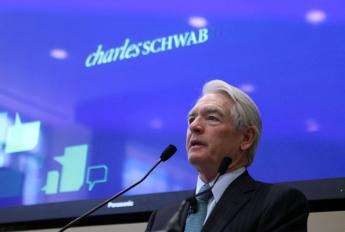
|
| Chuck Schwab |
The remedies for this situation might well be numerous, but the simplest one would be to isolate large investors from small ones by setting a top limit for large accounts, perhaps even automatically transferring large accounts to a large-account fund at the instant the account exceeds some limit. Apparently, similar proposals have been made privately, and there is opposition whose validity must be addressed. However, in the confines of an Op-ed article, a fully exhaustive discussion of a technical proposal is not possible. Ideally, this sort of proposal could be adopted privately, using the advance consent of the two involved parties, the bank, and the big customer. No doubt there is some legitimate concern that widespread publicity might trigger unfortunate legislative over-reaction. After all, most members of the public are unaware that "breaking the buck" is even a possibility. If the possibility of a run can be eliminated by skipping the alarming discussion of whether it potentially exists, or how serious it might or might not become, it would be a mercy. It only seems to be required that the parties agree it is a risk worth avoiding.
Bernanke's QE3: A New Titanic, or A New Bretton Woods?
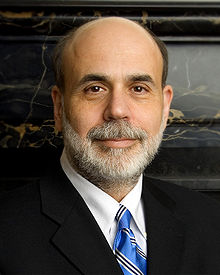
|
| Ben Bernanke |
Nobody likes to execute a guilty prisoner, but in finance, it is surely true that allowing bad debts to remain unresolved harms the whole economy. It makes little difference whether a bank fails to mark its debts to market, whether debts are "extended", or insolvent institutions are subsidized. Andrew Mellon once advised Herbert Hoover that he should "wring the rottenness out of the system", but that is such poor politics that even Hoover rejected it. In time, the process of "good bank, bad bank" was devised to isolate bad debts into a single institution so the rest of the economy could begin to recover. QE3 is a version of a good bank, bad bank. Unfortunately, the public is easily misled in these matters, so although all three Q's involve the Federal Reserve buying long bonds, QE1 unfroze a frozen financial marketplace (successfully), QE2 meant to stimulate the economy (unsuccessfully), but QE3 seems to have much grander ambitions. So it is unfortunate that three different activities share the same name, and still more unfortunate that name is made so mysterious. Let's forget about the first two, and concentrate on QE3.
The Federal Reserve is well along in a program of buying huge quantities of questionable long bonds and has announced it is going to keep buying huge quantities until either inflation exceeds 2.5% or unemployment falls below 6.5%. That's not exactly the same as buying every bad bond in existence, but it could come to that. Instead of letting the holders of those bonds go bankrupt, the Fed is buying the bonds out of circulation, which could rescue a great many investors. Small businesses do not ordinarily issue bonds, so there is some bias in favor of large businesses and banks, but surely not an intentional bias. The effect is to make the Federal Reserve both a good bank and a bad bank at the same time. The main difference between this and wringing the rottenness out is that bankrupt institutions cannot come back to haunt you, while in the more benign purchase of bonds, you have assumed an obligation to pay them back. When you sell them back you drive the price down and the money disappears. Furthermore, when the price of bonds declines, interest rates will rise and the national debt will increase more rapidly. If the economy cannot withstand higher interest rates, a recession will deepen. You have to get the timing right, and the world is in such a delicate state that it is impossible to get the timing entirely right for everybody. Because interest rates are now essentially zero, they cannot go lower, so investment advisors are increasingly advising clients to sell some bonds while they still can. If that gets out of hand, it could start a panic.
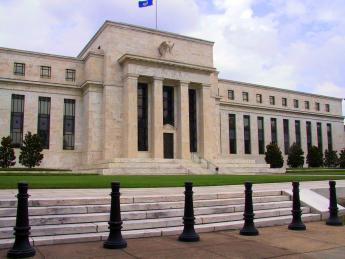
|
| United States Federal Reserve |
However, the United States Federal Reserve is not an investor, it controls the currency and can print unlimited amounts of it. There is nothing which can force it to sell its bond holdings, ever. Without going into the details of the Bretton Woods Treaty, the tie to gold was eliminated nearly fifty years ago. Meanwhile, its bonds are paying interest, which at the moment it is returning to the U.S. Treasury to reduce the national debt. It can reduce this outflow more or less at will, and it can increase it by raising interest rates (ie by selling bonds, as described). With a few extra steps, this enormous pot of debt could become the basis for an international currency reserve. At the least, it could bring a halt to an international currency war. If it chooses, it can decide to wait as long as fifteen or twenty years for economic demand to recover from a century of overleveraging, and then pay it back by letting the bonds reach maturity. But there is at least one big flaw in this dream.
At some point, the bond market may decide to take the bull by the horns and raise rates before the Federal Reserve wishes to. Political appointees come and go, and the bond market could easily decide that a misjudgment has been made by somebody. It could easily happen that public apprehension could grow that something doesn't smell right. In that climate, a few heavy sales could trigger a panic. And then everyone will try to get out the door at the same time.
Why Jefferson Hated Banks and Hamilton Loved Them
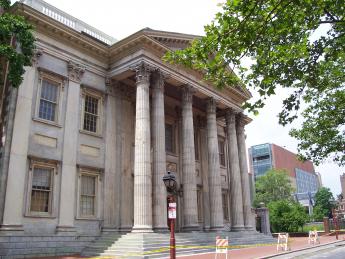
|
| First Bank of Philadelphia |
Some things are easier to understand when they start before they get complicated. That's true of banking, where it can now be puzzling to hear there was a strong inclination to forbid banks by law. While we were still a colony, the British discouraged bank formation, fearing strong concentrations of wealth at a great distance could lead to ideas of independence. Anti-bank sentiment was thus a Tory characteristic, although as the Industrial Revolution progressed, Karl Marx and Fredrick Engels stamped it permanently with a proletarian flavor. Large owners of farmland were displeased to see their power weakened by urban concentrations of wealth, while poor recent settlers of America wanted to buy and sell land cheaply, so they favored a currency that steadily declined in value. People with wealth have an incentive to keep money stable, but people with debts have an incentive to pay them off with cheap money. After these battle lines clarified and hardened, the debate has transformed from an original dispute about banks, into catfights about a strong currency. As Rogoff and Reinhart have pointed out, inflation is a way for governments to cheat their citizens, devaluation is a way of cheating foreigners. Naturally, politicians prefer to cheat foreigners, but national tradition curiously seems to favor one style more than another. Essentially, they are the same thing with the same motive, although outcomes may be different. One is restrained by fear of revolution, the other by fear of an international currency war.
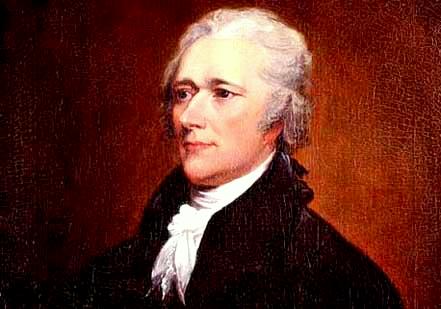
|
| Alexander Hamilton |
While George Washington was America's first president, Alexander Hamilton was Secretary of the Treasury and Thomas Jefferson was Vice President; the cabinet contained only four members. Although Hamilton was born poor, the bastard brat of a Scottish peddler in the view of John Adams, he had learned about practical finance in a counting-house, and later gained Washington's confidence on the headquarters staff; Washington eventually made him a general. Jefferson was part of the slaveholding Virginia planter elite, elegant in writing style and knowledge of art and architecture, sympathetic to the French Revolution; eventually, he died bankrupt. Early in the Washington presidency, Hamilton produced three long and sophisticated white papers, advocating banks and manufacture. Jefferson was opposed to both, one facilitating the other, which we would today describe as taking a green, or leftish position. Banks were described as instruments for accepting deposits in hard currency, or specie, and lending it out as paper money. The effect of this was a degrading of gold into paper money, or if not, an inflationary doubling of currency. Banks would be able to create money at will, a capriciousness Jefferson felt should be confined to the sovereign government. Just keep this up, and one day some former banker from Goldman Sachs would be able to tell the President of the United States, "The bond market won't let you do that." In this sense, the bank argument became a dispute about public and private power.

|
| Thomas Jefferson |
Hamilton, a former clerk of a maritime counting house, could observe that sending paper money on a leaky wooden boat kept the real gold in the counting-house even after the boat was lost at sea. To him, prudent banking transactions enhanced the safety of wealth, reducing risk rather than enlarging it. Later on, he learned from Robert Morris that a bank floating currency values on the private market disciplined the seemingly inevitable tendency of governments to water the currency. Once more, banks should enhance overall safety in spite of being vilified for creating risk. To both Hamilton and Jefferson, all arguments in an opposing direction seemed specious, designed to conceal ulterior motives.
Banks came and went for a century. By the time they almost were a feature of every street corner, banks were taking paper money (instead of gold and silver) as deposits and issuing loans as paper money, too; the gold was kept somewhere else, ultimately in Fort Knox, Kentucky. With experience, deposits could stay with the bank long enough that only a rare run on the bank would require more than 20% of the loans to be supported by physical ownership of gold. By establishing pooling and insurance of various sorts, banks persuaded authorities it was safe enough for them to hold no more than 20% of their loan portfolio in reserves. By this magic, loans at 6% to the customer could now return 30% to the bank. A few loans will default, a reserve for defaults was prudent, so the bank with a 2% default rate could settle for a 20% return rate. A bank which was deemed "too big to permit it to default" was invisibly and costlessly able to trim its reserves, and thus receive a 25% return by relying on the government to bail it out of an occasional bank crisis. With this sort of simple arithmetic, it is easy to see why multi-billion dollar banks were soon arguing that 5:1 leveraging was too small, a reserve of gold and silver was unnecessary, and the efficiencies of large banks were needed to compete with big foreign banks. By the time of the 2007 crash, many banks were leveraged fifty-to-one, which even the man on the street could see was over-reaching. The ideal ratio was uncertain, but 50:1 was certain to collapse, probably starting with the weakest link in the chain.

|
| Alan Greenspan |
This brings banking arguments more or less up to date. Except in 1913, an "independent" Federal Reserve Bank was created. It was a private reserve pool balanced by a public partner, the government. In time, the need for gold and silver was eliminated entirely, by the wartime Breton Woods Agreement, and the Nixon termination of it. The predictable inflation which could be expected to result from a world currency without physical backing was prevented by allowing the Federal Reserve to issue, or fail to issue as necessary, the currency in circulation. This substitution was deemed possible by having the Fed monitor inflation, and adjust the flow of currency to maintain a 2% inflation rate. Although 100% paper money was an historic change, it has endured; it has withstood efforts by the politicians to re-define inflation, undermine the indices of its measurement, and brow-beat the vestal virgins appointed to defend the value of the dollar. The old definition of money has changed: it is no longer a store of value, it is only a medium of exchange. The store of value is a nation's total assets. Jubilant politicians have added an additional burden of preventing unemployment, to the original one of defending price stability. In practical terms, the goal is defined as maintaining a 2% inflation rate, while achieving a 6.5% unemployment rate. It remains to be seen whether the two goals can exist at the same time, particularly if the definitions of inflation and unemployment become unrecognizably undermined.
And it even remains to be seen whether the black-box system can be undermined from within. The Federal Reserve is so poorly understood by the public that his enemies now accuse Alan Greenspan of causing the present recession. It is argued that the eighteen years of banking quiet which his chairmanship enjoyed, was only gradual inflation, deeply concealed. It is contended that the unprecedented steady rise of the stock market during those eighteen years was financed by a small but steady loosening of credit by the Federal Reserve. Perhaps what this means is: the definition of inflation must be tightened so its target can be made and adjusted, not to 2%, but to some number slightly less than that, measured to three decimal places. Or that the 6.5% unemployment target must be jettisoned in order to preserve the dollar. With that prospect including international currency wars as its corollary, it will be an interesting debate, and immigration policy is related to it. Because one alternative could become the abandonment of the fight against inflation, in order to sustain the new objective of reducing unemployment, Jefferson would have won the argument.
REFERENCES
| The History of the United States: Course 8500, 15 Hamilton's Republic: ISBN: 156585763-1 | The Great Courses |
| This Time Is Different: Eight Centuries of Financial Folly: Kenneth Rogoff, Carmen M. Reinhart: ISBN-13: 978-0691152646 | Amazon |
Restoring the Gold Standard by Levering Judges' Salaries

|
| Gold Inflation |
Generally speaking, creditors hate inflation and favor a gold standard because they fear debtors -- who outnumber them at the polls -- will dishonor their debts by inflating the currency. And debtors generally are rather serene about the risk of inflation, for the same reason in reverse. Since governments are almost invariably debtors, the combination of government and debtors on the side of promoting inflation represents a dishearteningly strong force for creditors to combat. It is plain for everyone to see that inflation has been steadily moving ahead. But it is something for everyone to ponder that leaving creditors with only one recourse is almost certain to translate that particular recourse into action. Creditors will raise interest rates in anticipation of inflation, and the economy will suffer for debtors as well as everyone else.
So, hard-money advocates like the Paul family of Texas have been rather nonplussed to discover that Federal Judges have handed them in 2010 a very effective weapon they had long overlooked. It should be no surprise that it came from that direction; judges are long accustomed to looking backward to the historical origins of the laws they are charged with interpreting. In this case, the defining statement is found in the Declaration of Independence.
Parenthetically, conservatives are reluctant to include the Declaration in an explanation of the Constitution, since it is plainly true the Constitution was written to correct the weaknesses of the Articles of Confederation, which was much more closely defined by the circumstances of the Declaration. The almost immediate response to any such logical jump over the Constitution, particularly those of Abraham Lincoln, is to thump the maxim that The Declaration of Independence is not Law. And it isn't; it's just in this case it makes a concise statement of a major reason we were offended by the King of England:
"He has made judges dependent on his will alone, for the tenure of their offices, and the amount and payment of their salaries."
Note the operative phrase dependent on his will alone , which takes us back to the Magna Carta, where even the King must obey the Law. If judges are the umpires, it isn't in accord with deeply felt British culture that the King could force the umpires to favor his wishes in their official decisions, by threatening punishment on their persons. No, thousand times no. Anyone can see that.
Furthermore, the determination of underlying intent is so difficult to prove, and so easy to deny, that it is scarcely mentioned in the debate. If two motives seem possible, the other party will assert the high-sounding one and deny the ulterior one. The offended party will instinctively suspect the reverse and will brush aside any protestations to the contrary. Since that is bound to happen, please skip the preliminaries and get on with the evidence. So it is in this case; any reduction in the judge's salary is treated as an attempt to influence official decisions. The Administration maintains a reduction of Federal judge salaries is necessary for budgetary reasons. Please don't insult my intelligence that way. You aren't allowed to reduce the salaries of judges for any reason.
From this rather easy position to take, it is only a short step to say that refusing to raise judge salaries during inflation is a reduction of salary in real terms, after adjusting for inflation. Your paper money is phony; I want to preserve my purchasing power. Your refusal to adjust for inflation is even more clearly a salary reduction since the link to gold was severed during the Nixon and Johnson administrations. We are not on anything remotely resembling a gold standard; we are on a monetary standard which is by law adjusted to inflation, and just about nothing else. Hubert Humphrey may have thought he was creating a loophole by mandating concern with unemployment, but just try to convince the judges of the Supreme Court of that one.
And so, it seems predictable that Judge Beer of the Eastern District of Louisiana, and his fellow judges, will achieve an effective gold standard for Federal Judges if they have the fortitude to tough it out. After that, it gets harder, Congressman Paul. You have to push the concept that what is fair for Federal Judges is fair for everyone else. You should assume that judges will vote in their own favor, and therefore reasonably assume that the public will vote in its own favor, too. If that be treason, said Patrick Henry, make the most of it.
Thieves of Baghdad

|
| Col. Matthew Bogdanos |
Col. Matthew Bogdanos, of the U.S. Marines, gave an interesting insight into what the Baghdad Museum really was, how it was captured, and how the treasures were recovered, at the University of Pennsylvania Museum the other night. Our own museum is said to be the second largest archeology museum in the world, after the British Museum. After discovering what was really in the Baghdad museum, that ranking may have to be revised; but the chief Philadelphia interest traces back to the discovery of the ancient city of Ur by Philadelphia archeologists during the last century, an event which essentially created the University Museum. This was where civilization began, and we discovered it.
The reserve Colonel happens to be a prosecutor for the New York District Attorney, was trained extensively in classical antiquities; and so was the perfect point man to lead the capture of the Museum during the Iraq war, very well suited to follow the looted treasures into the international antiques market -- and recover substantially all of it. Something like 62,000 pieces were recovered, and all of Nimrud's Treasure, the prize possession of the museum.

|
| The Baghdad Museum |
There has been criticism of our troops -- some of it right out of this evening's Philadelphia audience -- for allowing the place to be looted in the first place. But that sort of assumes the place was lying vacant and undefended while our troops were out shooting innocent civilians. That's a misapprehension quickly dispelled by videotaped scenes of real live shooting and rockets coming out of the place at the time, which the Colonel was happy to display. Questioners were invited to claim they would have been willing to go into that hornet's nest in order to save alabaster statues, but others in the audience inclined to giving the Marines some benefit of doubt.

|
| Hussein Millions |
That place was vandalized when the troops got into it; to say it was thoroughly vandalized is only true in a sense. There was indeed a lot of looting, but the bigger surprise was to find there were hidden storage rooms behind steel bank doors, filled with the really best antiques, as well as vast boxes of American hundred-dollar bills. By weighing the hundred dollar bills (22 pounds for every million dollars) it was estimated that Saddam Hussein had about $800 million in U.S. currency stored in that one place. Gold as a raw commodity has since gone up considerably in value, but many of the best antique gold pieces on display in the museum were only copies, the originals were kept in the secret vaults. The international market appraises quite a few of these pieces at over $10 million apiece. Apparently, the thieves knew exactly which pieces were valuable, and went straight to them without even pausing to notice other rooms full of objects of lesser value. The museum had been closed to the public for the previous twenty years; it seems rather obvious that Saddam was storing these objects in order to buy weapons for continuing guerilla activities underground, or in exile. The museum itself consisted of nearly twenty separate buildings in the center of Baghdad, and the custodians obviously must have known where things of serious value were kept, in order to get to them so precisely.

|
| Nimrud's Treasure, |
Offering an amnesty, no questions asked, brought in thousands of recoveries from the local public. Getting other pieces back from art galleries in London, Geneva and Berlin required methods that were not described in detail. Some of us who remember the German and Japanese mementos which were "liberated" during World War II have an immediate appreciation of the improved American troop discipline which must have been imposed in the Iraq War. That's something to think about, too. Our troops had been given extensive training to respect the cultural heritage of the enemy, and they evidently did so to a remarkable degree. One certainly has to doubt that Saddam was locking that material in vaults for twenty years in order to preserve the culture of any sort. If it had any other purpose than to serve as a way of transforming oil wealth into munitions, it's a little hard to imagine what it was.
Cyprus Tests the Limits of Paper Money

|
| Cyprus Map |
Tourists like to banter about their favorite place in the whole world; until recently, mine was Cyprus. It's an eastern Mediterranean island, where it was possible to swim from beaches in the morning, ski in the afternoon, and luxuriate in an inexpensive but posh hotel in the evening. The locals had their ethnic rivalries, but what would tourist care. Since I was last there, apparently Russian and other billionaires discovered the place, and now three local banks are bigger than the GNP of the nation. Like Ireland, Hungary, Iceland, and several other small European nations, this dystrophic growth made it impossible for the government to guarantee the assets of the banks, as the familiar "lender of last resort" because the banks were bigger than the government. Accordingly, the local government was forced to declare a protracted bank holiday, to forestall what was certainly going to turn into a run on the banks as depositors all tried to get out the door at the same time. International stock markets immediately dropped a noticeable number of points, as the whole world suddenly discovered Cyprus wasn't such a nice place to put your money after all. The Russians might possibly be nasty people, but in this matter of bank deposits, people all link arms internationally like brothers.
There have been lots of other bank panics in small nations without much agitation, so what seems to have bothered the markets was the decision of the Central European Bank to tax the depositors 10% to support the system. Christine Lagarde, the head of the International Monetary Fund, said she thought it was a good idea to tax depositors, and that really upset a lot more people. Ms. Lagarde is French, but the IMF which she heads is located a few blocks from the U.S. White House, so the suspicion grew that Mr. Obama might approve of placing a tax on bank deposits, too. As things started to get out of hand, everyone hastily dropped the whole idea, and even the Cypriote Parliament voted against it. There was no time for even the large organizations devoted to managing the news to manage this one. World opinion was instantaneously mobilized, and thunderous in voicing its low opinion of taxing bank deposits, by anyone, anywhere. What was accidentally aroused was the realization that since the World went off the gold standard in 1971, the world's money is backed by nothing at all except a computer notation? Irrevocably taxing it in bank accounts could be done in an hour.
In 1944 the international conference held at Bretton Woods, New Hampshire, agreed that other nations could exchange their currency for American dollars, but only the U.S. dollar could be converted into gold. As long as the U.S. ran a trade surplus, the gold remained undisturbed in Fort Knox. But when other nations began to export their goods in the 1960s, their dollars began to be changed into gold. Gresham's Law took over quickly since when two currencies of unequal value circulate together, the more valuable one will quickly disappear; the shifting balance of trade had made gold more valuable than dollar bills. When President Nixon began to see that Fort Knox was soon going to be emptied, he put a stop to the exchange. He "closed the gold window". At that point, we were all off the gold standard, but nothing much happened. It remained possible to continue to speak of gold as a "barbarous relic", and by implication, any standard like silver or oil or land was also a barbarous relic. But the experience of Cyprus taught the world that everyone did want the value of a currency to be independent of the whims of government, and like the Emperor's suit of clothes, was just waiting for someone to point it out. A system of monetary exchanges, or exchanges of goods and services, really can be run without backing by anything except the word of government. But inflation targeting does need a government to run it, and thus governments have acquired a power over currencies which centuries of experience had taught people not to trust for a moment. North and South American hemispheric trade had been comfortably run without governments for centuries, as long as there were Spanish pieces of eight in actual circulation. But the modern Cyprus government could not run for a week without the trust of depositors, and neither can any other government. Conversely, it is impossible to run an economy without a government to guarantee the international value of money. People don't like that situation, and the threat of chaos in the streets is not much different in any place in the world which does not run a brutal military system. When you reach a point where even the soldiers refuse to be paid with paper money, you are about at the point General George Washington found himself after the Revolution. Robert Morris convinced him it would be possible to base a currency on the credit of the nation, and General Alexander Hamilton had been taught how to run such a thing. The rest of the country didn't understand what that meant, but they did understand that it seemed to work. But it would only work if the people trusted their Constitution, and the government is designed. But then, our government never tried to put a tax on bank deposits. In fact, it took another hundred years before the American public was completely certain you could trust banks even to exist. The good ol' mattress, that's where to keep your money. If it's in gold coins, that is. Paper money might just as well be in a bank because its value is only symbolic of a government promise.
REFERENCES
| The Battle of Bretton Woods: John Maynard Keynes, Harry Dexter White, and the Making of a New World Order: Benn Steil: ISBN-13: 978-0691149097 | Amazon |
| Robert Morris: Financier of the American Revolution: Charles Rappleye: ISBN-10: 1416570926 | Amazon |
| Bitter Lemons: Lawrence Durrell: ISBN-13: 978-1604190045 | Amazon |
Gold Standard Substitutes
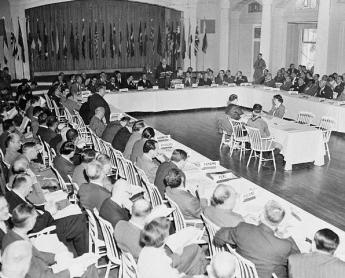
|
| Bretton Woods conference in 1944 |
Make-shift proposals to address international monetary crises after 2007, particularly confiscation of bank deposits suggested briefly in 2013 for the Mediterranean island of Cyprus, stimulated a search for a better monetary system. A gold standard sufficed for thousands of years, but the Industrial Revolution increased world economies faster than gold metal was discovered, constantly driving prices downward. It became increasingly difficult to manage the rapid growth of debt, as happens in wartime. The crisis which led to the 1944 Bretton Woods Conference was the inability to accommodate the massive national debt rearrangements of the Second World War. With the United States owning two-thirds of the world gold supply, international trade was seriously impaired.
Bretton Woods created the International Monetary Fund and the World Bank, which can be ignored for present purposes. It established the United States dollar as a "reserve currency", alone able to be exchanged for gold. Other nations were allowed to exchange their money for United States dollars. Supplemented at the Bretton Woods conference in 1944 by this gold-standard-once-removed (the U.S. dollar as a "reserve currency"), this expedient only prospered as long as the United States could maintain a positive trade balance. After 1960, the outflow of gold from Fort Knox was relentless, and in 1971 the United States was forced to abandon its buffering between gold and the world's banking systems. After 1971 the world's currencies would supposedly trust their central banks to be "lenders of last resort", but in the financial crises after 2007 many could not sustain that obligation. What they could do was devalue their currency, and even that expedient was blocked by the rules of the eurozone. Put to the test, the European Central Bank became uncertain it wanted the role of lender of last resort. At one time, the gold standard had provided the one backing for a currency which was independent of all governments' temptation to inflate away their debts. The U.S. reserve-currency buffer extended the system for several more decades, but after President Nixon cut the link to gold, the post-1971 system only provided a promise of a government rescue, without the universal ability of governments to live up to the promise. In a sense, governments backed their currency with a mortgage on the nation, and many mortgages were already overextended. For those nations, variants of the gold standard had been replaced by no standard at all. Since governments which had historically been the cause of inflation were now expected to be the source of its restraint, the private sector urgently needed to devise a new system to force the public sector to accept a new and unwelcome role.
Money on a gold standard was formerly both a storehouse of value and a means of exchange. The world supply of gold was unable to keep pace with the world's increasing wealth for more than a century, so prices were driven down, disrupting long term debts. Rising prices were just as bad; what commerce needed was price stability. What was devised for the 1971 disruption was inflation targeting. The Federal Reserve and to some extent the other major central banks, issued or withdrew currency to achieve a 2% inflation rate, thus hoping to maintain stable prices with a 2% growth rate. Skipping over the details of central banking, the Federal Reserve could safely count on the government to promote inflation at almost all times; the need was to restrain it to 2%. Unfortunately, contraction at 2% takes about as long as expansion at 2%, frustrating the hope of the public to have booms last as long as possible and depressions to be over as soon as possible. Periodic episodes of deflation are a problem. From time to time the economy expands its production capacity faster than consumption can grow, and the inevitable resulting panic not only impairs the ability of banks to lend but frightens the public away from borrowing. Without a gold standard, prices then fall even farther and faster than with gold support because money no longer has any intrinsic value. Our problem thus reduces itself to two requirements.
Without a gold or other monetary standard, and seeking to preserve the inflation-targeting system, how can we induce prices not to fall in a depression? And, how can we induce a booming economy not to increase its production capacity beyond what it can consume or sell, so that every boom period stops being followed by an uncontrollable crash? That is, much of the problem of keeping production from falling, is to prevent it from going so high it has to fall. That's not so easy in a democracy; if you stand in the way of making money when making money is easy, you will very likely be voted out of office. Price controls, by the way, have been tried many times; they always fail. The practical problem is thus pressed into the mode of forcing savings into some sort of escrow fund, during boom times. Meanwhile, the practical politician must persuade a suffering public that, once you overbuild capacity, it will probably only wear out at the same 2% rate that it took to grow so big. These are not new sentiments; the public must learn self-restraint during booms, something it has repeatedly resisted.
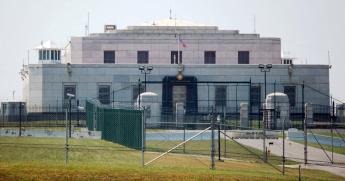
|
| Fort Knox, KY |
Features particularly irritating to the private sector about the Cyprus proposal had several sources, all of them heightened by annoyance that the bureaucracy would immediately try to force the private sector to pay for administrative design blunders. A gold standard permits international trade in defiance of government wishes; a currency without a physical store of value cannot exist without workable rules for international trade. If satisfactory rules cannot be made, voices will demand a return to the gold standard. No one said the Greeks and the Turks should love each other; no one said the Russians must respect private property. What is stated is if workable rules are not forthcoming, private alternatives will arise.
Ben Bernanke is not only the chairman of the U.S. Federal Reserve, but he is also one of the recognized academic experts on managing depression. He has spent his life studying this particular problem and occupies the most powerful position among the group charged with doing something about it. His innovation in the management of a financial crash is QE, quantitative easing. Essentially, this amounts to the creation of a fund managed by the Federal Reserve, generated by purchasing bonds with money created by the Fed. The content, size, and purpose of the fund have varied in the past few years, to the point where it amounts to a gigantic fund at his disposal, as needed, Initially, it injected funds into markets frozen with fear, and successfully unfroze them, making a profit for the Treasury along the way. He next used the fund to manage a gigantic Keynesian effort to stimulate the private economy with a federal fund. While it is possible this stimulus averted some worse disasters, the net effect was not outstanding and is generally regarded as a failure. His current effort, titled QE3, amounts to an enormous effort at what is termed "good bank, bad bank" in financial jargon. Because so many good bonds are undervalued in a recession, it is believed they will return to true market value if the truly bad bonds are removed from the market place. In Victorian days, this was accomplished by bankruptcy, but it is thought to be more humane to buy up and remove them temporarily from the marketplace. The humane approach, of course, has the disadvantage that the bad bonds may reappear later, and some critics say it is only a variant of "kicking the can down the road." It seems to have worked well for the Scandinavians however, and the final verdict cannot yet be issued. For the purposes of the present discussion, the essential point is that a three-trillion dollar discretionary fund has been put in the hands of the most powerful and most knowledgable person involved in international finance. At the moment, the fund contains most of the dubious bonds in circulation, but there are signs that Bernanke plans to replace them with U.S. Treasury bonds, thought to be the safest investment available. He can essentially do anything he pleases with this fund, subject only to the approval of the rest of the Board.
It must have occurred to Bernanke, that this multi-trillion dollar fund of the safest investments on earth would make a highly suitable substitute for gold, if it ever becomes clear that the world needs to return to some tangible commodity to back its currency, or become the new lender of last resort, if we choose to put it that way. Mr. Bernanke essentially needs no one's permission to create this fund, but to use it in some novel way would require the permission of politicians, acting in some way identifiable as the will of the American public. If it should come to that, a few suggested limitations immediately come to mind.
In the first place, one of the main purposes of imposing a gold standard on spendthrift Kings was to keep the King from spending it and substituting his own worthless paper money. Three variants of this threat, inflation, devaluation and confiscation, all amount to the same thing, which would get us back to our present predicament quite quickly, indeed. Mr. Bernanke must realize that our Constitution was written by Founding Fathers who were intensely fearful of entrusting as much power to one person as Mr. Bernanke would likely possess if this idea moved to implementation. To put it bluntly, the first action after it is done should be to surrender the ability to do it. To take another lesson from Constitutional history, it might be remembered that the functions of the Legislative Branch were established in six months, those of the Presidency evolved in the first five years of George Washington's office, and those of the Supreme Court required forty years to evolve. During all of that time, the ability to destroy the Constitution's main purposes had to be shielded from unbelievers, and an apparently unnecessary Bill of Rights had to be appended to reassure the remaining doubters. The main risk to this technical monetary reconfiguration is not monetary, but political.
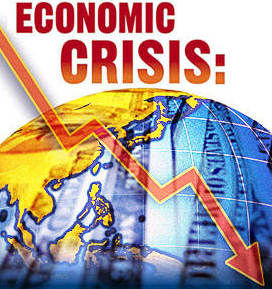
|
| Financial Crisis |
But there are technical issues, as well. Because they are technical, it is more difficult to depend on wise public opinion, and thus it enhances feasibility when technical issues can be translated into political speech. Because events have demonstrated it is much more difficult to reverse a depression than a bubble, thought should be given to devising ways to use this new vehicle to reverse depression. Obviously, it should be used to unfreeze a frozen market; that's an important lesson from the success of 2009. Furthermore, the revenue from three trillion dollars of bonds is appreciable and should be used to finance tax reductions in a recession. More importantly, it should be withheld from government treasuries to restrain a developing bubble, more or less forcing governments to raise taxes during a bubble. Perhaps standards are necessary for expansion and contraction of the fund itself to supplement the use of the fund's income in those extreme situations. Indeed, to forbid the use of principal for those end-purposes might leverage the effectiveness of changing the fund balance, because it would force larger swings of principal to be adjusted. Most of these considerations come into play when a bubble is being restrained because it is easier to restrain a growing bubble than to repair the damage once it bursts. Restraining a growing bubble is not easy, and picking the right time is still less easy. Better to make most of it automatic, and related to defined market benchmarks. Benchmarks may be inaccurately chosen, but at least something is learned for the next time.
Mr. Bernanke's QE fund is not the only one which could take the place of gold in a new monetary standard. Commodities of various sorts would not be much different from gold and might soften the volatility of the mining supply. Land could be used, or fresh water, or petroleum; perhaps we could divide up the ocean in some way. Among the more attractive candidates would be world index funds of stocks or bonds; bonds seem perhaps more suitable, perhaps not. But at the moment, no one seems to be exploring any substitute monetary standard other than gold or the QE fund. Perhaps the disadvantages of each would cancel out in a basket of all the suggested standards. Perhaps inflation targeting can be improved, and no other benchmark is needed; perhaps international branch banking could cover the requirements. And perhaps it is all an academic exercise, but it would still seem helpful if academia would explore a little further, just in case we need them.
Rescuing International Finance?
Let's begin this discussion of international finance by relating the story of how the United States solved the same problem in 1913. This wasn't a ho-hum bit of history, it set the pattern the world is now about to adopt or reject. Remember, our current lame duck President comes from Texas.
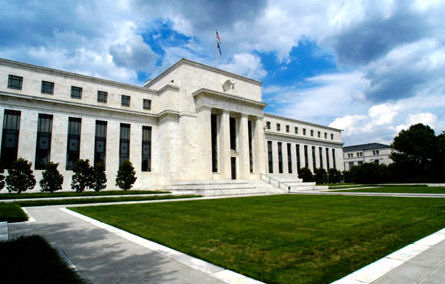
|
| Federal Reserve Building |
In 1913, the Federal Reserve system was created. It had various purposes, but it essentially stripped the state governments of the ability to adjust interest rates and placed that power in Washington DC. The appointment process to the Fed board was tinkered with to achieve as much independence from politics as possible, although it was unrealistic to think politics would be totally excluded. Politicians never give up power voluntarily, but in this case, they also escaped blame for the unpleasant things a central bank is occasionally called on to do, so it was a deal. The remaining uncertainty thus became the question of whether the states would yield to federal authority on interest rates, something they had consistently resisted ever since the Constitution was ratified. The first resister was Texas.
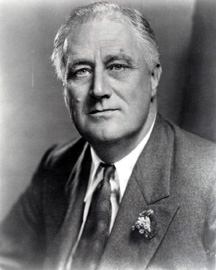
|
| Franklin D. Roosevelt |
It suited the Texas economy to have lower interest rates than other states, but the fledgling Federal Reserve decreed that the nation as a whole needed higher rates. In a fairly typical Texas style, Texas just lowered rates anyway. Almost immediately, nobody would deposit money in Texas banks, who were flooded with requests for loans from the rest of the country. That situation couldn't last more than a few days, so Texas capitulated, and no state has defied the Federal Reserve since then. In this little story lies the hope that a similar international banking arrangement can be devised, and announced shortly after November 15. That would probably put George W. Bush in a class with George Washington and Abraham Lincoln in the history books, his current low popularity not withstanding. For that reason alone, there is cause for concern about the newly elected incoming President. The worrisome historical model at this level lies in the refusal of newly elected Franklin D. Roosevelt to cooperate with the lame duck Herbert Hoover during a similar economic crisis of 1933. On the level of "practical" politics, Roosevelt got away with this deplorable behavior, by enacting many of Hoover's proposals six months later and taking full credit. The country was much worse off as a result, but Roosevelt nevertheless seems to have achieved enduring historical praise for his imaginative ideas. This time, one would hope that fear of the blogosphere, the London Economist and the Wall Street Journal would make such behavior politically unprofitable for either Obama or the maverick McCain. But you never know.
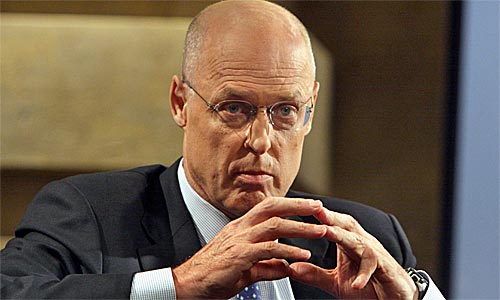
|
| Henry Paulson |
Now, to return to the present crisis. In a sense, every type of financial institution from banks to hedge funds, every nation from America to Zimbabwe, and every expert from Hank Paulson to Barney Frank -- has been tested, and occasionally failed quite visibly. People are scared, have every reason to be. But on the other hand, sound reasoning will never defeat politics and financial greed, except in a rare crisis containing obvious general danger. So, this mess represents an opportunity for the think tanks to be given a chance at leadership, just as John Maynard Keynes was listened to respectfully at Breton Woods in 1944. It was just about the last time a guru got his way without the use of financial power or an overwhelming voter mandate. As Franklin Roosevelt is reported to have said, "I don't understand a word the man says, but we must do something."

|
| Barney Frank |
Let's use a few examples out of a great many available. Ireland issued a guarantee for all the deposits in its banks. Immediately, money poured into Irish banks from British depositors, unsettling the British banking system. So the United Kingdom had to issue the same guarantee, and then other nations followed. America rescued Bear Stearns, Fannie Mae, and AIG, and finally called a halt at Lehman Brothers. Other nations copied this approach of rescuing institutions in trouble until the Bank of England copied the Swedish approach of 1991 of reversing this approach. If you are in a sinking lifeboat, you want to rescue the best rowers, not the weakest. But there are some small countries with big banks, like Switzerland and Iceland, where it would be impossible for a small government to rescue a huge international bank within its borders. Conversely, the Eastern European countries have essentially no local banks. In the case of Hungary, most home mortgages were held in Austrian and Swiss banks. When the flow of funds forced a devaluation of the local currency, the cost of almost every mortgage in Hungary doubled, and the national government could do nothing about it.
Let's mention what may well be the largest such factor in this international banking game, the so-called Japanese carry trade. When the overheated Japanese stock market collapsed fifteen years ago, the Ministry of Finance responded by lowering interest rates to one or two percent. Taking into account the inflation rate, Japanese banks were paying the borrower to take their money. So, the international banking community promptly responded by borrowing money in Japan at 2% and lending it out in Germany at 8%. Amounts of money in the trillions churned through this money machine. An unknowable but large amount of this money originated in China, which was trying to prevent its surpluses from provoking a revolution with inflation. The Japanese carry trade is at an end except in reverse, as money is flowing back to the now seemingly safe Japanese economy. Perhaps even a casual reader can look up from the World Series and the presidential election, to realize that absolutely everybody is scared, and possibly scared enough to do something cooperatively. It means loss of national power and sovereignty for everybody, a reconsideration of the European Common Market, and setting aside any disruptive schemes to discipline Premier Putin's behavior as a hidden by-product. As Frank Roosevelt said, we don't understand a word of it, but we must do something.
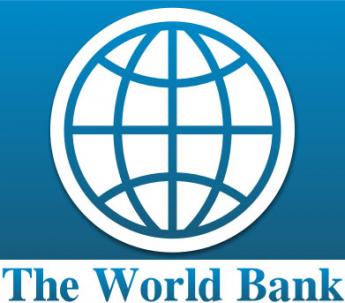
|
| The World Bank Logo |
Among the small practical ideas advanced, one of the most promising is to persuade the Chinese government to float its currency. We have historically tolerated small primitive countries when they try to struggle out of poverty by artificially cheapening their currency. In China's case, and before that in Japan's, cheapening the currency in order to stimulate exports has been politely referred to as "pegging the currency to the dollar". Pegging it low, that is. But Japan and China are no longer barefoot and aspire to become important figures in international finance. China is said to resist this proposal on the grounds that it needs 7% annual growth to prevent social unrest leading to a revolution. To some extent, this is probably just bargaining talks, and the counter-proposal offered is to strengthen Oriental power within the International Monetary Fund, as part of the process of increasing the power of the now-indolent IMF. We will have to wait for November 15 to see if clever little schemes like this one will suffice for the purpose. Much depends on China's willingness to cooperate, but even more, depends on the validity of blaming present messes on currency manipulation for the purpose of mercantilism. Beggar thy neighbor behavior has certainly been common; the question is whether it was the main cause.
If all those think tanks led by the Bank of England, have found the stone whose removal will start a benevolent avalanche, a second Breton Woods conference might just get us out of the soup; within two years we should be pleased with the way our cleverness restored the world to prosperity. If not, more grandiose ideas must be desperately considered. Europe must abandon all those silly five-hundred-page constitutions and form a national union. In our own case, that worked for eighty years and then we had a civil war, but even a repetition of all that sounds better than what we now face. If Europe simply cannot seize the moment, it is very likely to retreat into insignificance. Under those changed circumstances, the world economy will amount to three nations: China, India and the USA. We have yet to learn whether the Chinese and particularly the Indian governments can summon up enough domestic leadership to deserve a place in international leadership. And that presently is far from certain.
Proposal: A Second Federal Reserve

|
| The Global Interdependence Center (GIC) |
The Global Interdependence Center (GIC) holds an annual monetary conference of considerable eminence, and this year it was held on the grounds of Drexel University. A featured speaker was Henry Kaufman, who has long been the voice of Salomon Brothers, a New York investment bank. Since one of the main activities of that firm has long been bond trading, what Mr. Kaufman has to say about the current credit situation is of considerable interest. Wasting no time with preliminaries, he dove right into the topic, which is characteristic of speakers with too little time to say what's on their mind.
Securitization has, in his opinion, been excessive. Computers have provided increased interconnectivity, increased speed, and consequently lack of transparency in the credit markets. Consequently, senior managers and directors lost track of events and therefore failed to restrain risk-taking. Especially, SIVs (hidden subsidiary corporations) increased risk without restraint. Excessive management compensation has had the effect of relaxing management control, and there has been too much credit floating around. The capital was chasing investment instead of the other way around. But in addition, the architecture of the system is at fault, and the problems just happened to hit subprime mortgages first. Short term money was supporting long-term obligations, which can be described as a conflict between the amount of risk and the duration it was at risk. No one who actually needs a bail-out should be allowed to have one.
 No one who actually needs a bailout should be allowed to have one. 
|
| Henry Kaufman |
That's all pretty succinct, and likely contains a lot of wisdom. But it was a quick preamble, after which the highly practiced speaker slowed down for the real point. The Federal Reserve, charged with maintaining stability, was timid and sluggish in recognizing the magnitude of the situation. There was the main focus on restraining inflation and increasing Fed transparency while neglecting regulation. He didn't say so directly, but one gathers he approves of regulation, disapproves of transparency, and is somewhat dovish about inflation. In other words, he is joining if he did not initiate, a gathering political chorus demanding more government regulation and less reliance on the market place to structure the economy.
So it comes down to this. Since the Federal Reserve is too preoccupied regulating small banks, it has been outmaneuvered by the big ones. What's needed is to form a new regulatory agency in charge of big banks and investment banks, with big-picture management of the institutions that really matter. He didn't make any suggestions about who should be the first chairman.

|
| Henry Kaufman |
The rest of the audience will probably be long dead after Henry Kaufman's image continues to shine, but nevertheless, there are some awkward features to this analysis and proposal. It fails to put enough emphasis on the blistering speed with which new schemes have been devised which really do benefit mankind even though the driving motive behind them may have been the purest sort of greed. The efficiency of the financial industry has been enhanced in a thousand ways, causing the cost of transactions to drop appreciably. The increased velocity, while it may have been motivated by a desire to cash in before others compete for it, is well known to increase the effective amount of money in circulation. The market finds itself with the tuna problem: to slow down is to die. One can even suspect that the excessive management compensation does not identify the buccaneer, it often represents the bribes engineered by young geniuses and intended to be offered to the older has-beens to get out of the road. Surely, the managers who have come up through the ranks are in a better position to ask questions and impose prudent restraints, than a new cadre of Washington bureaucrats who only hear of a gimmick after it has been run off the road.
It's easier to see what's the matter with this proposal than to identify what is better. The young cowboys at the computer screens of Wall Street are already better paid than the highest level of Washington, and their future aspirations are to become zillionaires in just a few more months. Someone fresh from these combat zones indeed knows what's going on, but he isn't going to give it up to become a regulator. So, Washington will instead recruit their brightest most idealistic classmates from the same Ivy League colleges, and train them in the most esoteric economic theory, They will be brilliant and attractive, idealistic and energetic, But they won't learn what's going on until that thing no longer matters and a new unsuspected one has taken its place. The only people who have a chance of controlling this zoo have been bribed to keep out of the way by astonishing compensation packages. If it's reform and regulation we need, here is the place to begin. Let's wait a bit to see what this thumping crash will do to get their attention.
Financial Institutions of the Future
Things which normally dominate newspaper front pages, like presidential elections and World Series baseball, are now found back among the brassiere ads -- displaced by the stock market, credit market, banking and investment crisis of 2008. However, like the wake of a ship at sea, the past could be pointing to the future. Contemplate all the mighty financial institutions which have simply vanished.
It may even be trivial to say that Lehman Brothers and Bear, Stearns have disappeared. The fact is every investment bank has disappeared.
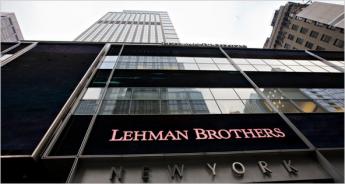
|
| Lehman Brothers |
And that's not all by a long shot. Savings and Loans have disappeared. Small commercial banks, and even most of the pretty big ones have disappeared. We may soon be left with half a dozen major banks and no lesser ones. Commission-based stock brokerage is now a rarity. Insurance? Well, the longevity increase of thirty years over the past century gave life insurance an enormous unearned windfall; when that flattens out, will such institutions still prosper? Individual corporate stocks are quickly vanishing into the homogenized soup of index funds, just as the securitized debt was digesting home mortgages before the current uproar. The ranks of stock analysts are thinning out; it no longer matters as much if they have a conflict of interest with nonexistent investment banks and stock brokers. All of this disappearance of institutions is in the recent past, and it mostly isn't coming back. Perhaps hedge funds and private equity companies will take over, but it is really too soon to say if they will survive, either.

|
| Credit Cards |
Credit cards have been overused and abused; that can be corrected. But the credit card system is supported by exorbitant fees charged to participating merchants; the card industry could easily disappear if the merchants devise a way to escape this private taxation; merchants universally wish to do so. The currency version of money is trying to disappear as fast as practical ways can be devised to measure value and transactions electronically. The remorseless pressure behind reducing all transactions to electronic form is created by the greatly reduced cost of it. And that pressure is magnified by electronically speeding up transactions; the faster money turns over, the more its virtual size increases. The converse, of course, is that a slow-down reduces its size. Like a giant tuna, the money supply dies of lack of oxygen if it slows down.
It can be seen in retrospect that banks are dying because everybody else stole their products by providing cheaper alternatives, mostly with computers. In the process, the national economy gets more uniform, less dependent on local agencies. Something of value has been lost, of course, particularly the local assessment of the capabilities and requirements of local customers; somehow, that seems to be expendable. But one thing, perhaps two, cannot be dispensed with.
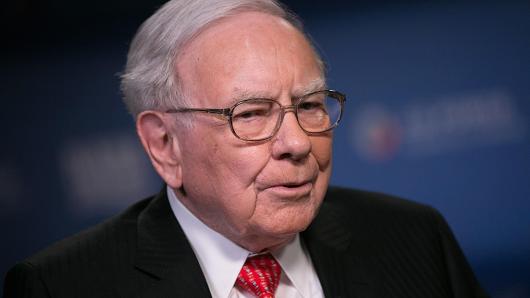
|
| Warren Buffett |
For fifty years, we have grown accustomed to the idea that the electronic records of our institutions are accurate. That's definitely not so. Even a reliable firm makes a myriad of errors in its many transactions, catches them with redundancy and cross-checks, and presents the cleaned-up product once a month or maybe even once a day. But even though the illusion of flawlessness is maintained for the customer as much as humanly possible, it is not inherently flawless. Systemic breakdowns will always expose uncorrected flaws caught in the process, while disincentives are created by this one-sided system to spend money perfecting and refining its quality control. It's better than the old manual systems, of course, but its flaws are constantly exposed by the remorseless external pressure to do things faster, in bigger volume, in greater complexity. We approach the point where every individual needs to maintain a duplicate computer system to verify his accounts. Individual telephone bills, for example, require the aid of a computer to explain what another computer produced, brokerage transactions need computerized counterparty challenge to expose hidden fees and costs. We all know how lack of transparency brought securitized mortgages to their knees. We will soon learn that the meaning of credit default swaps defies even expert comprehension. The mysteries of university tuition discounts, hospital insurance, and even supermarket discounts cry out for safeguards to generate transparency. It may be true that even billionaires like Warren Buffett do not bother to check the accuracy of all accounts presented to them, trusting the fairness of the counterparty. But that does not contradict the need for balance. Institutions of independent public accounting are surely going to make an appearance in the future, telling people what they have and what they are paying for.
The other component which seems to be missing in our transaction system is a well-developed and widely available profession of financial advisors, equipped with electronic tools to provide their badly needed services affordably and accurately. Not only do agents and advisers need some tools, but they also need the political power to force high-handed vendor systems to permit universal customer verifications; the hooks and portals to their private systems need to be developed to make this system workable, and that will not be willingly forthcoming. But they must be provided because any independent advisor/auditors need to be subject to constant reverse-confirmation if we are to escape creating a gigantic imperfect-agency problem. But it always remains that a vendor is not an agent of the customer; his ultimate duty is only to provide an arms-length transaction with transparency. It is the customer's duty to secure his own verification system. When that occurs, it will become part of the third party duty to consent to safeguards against his own imperfect agency. But that's for later. At the moment, independent auditors of the sort needed, scarcely exist.
Much can be gained by searching to correct the flaws of the past whose significance is suddenly apparent. With a stroke of genius, the 2008 reforms of the Bush administration offered a government guarantee of safety for bank accounts which pay no interest. The light finally dawned that businesses use banks for settling up accounts and are more or less indifferent to the interest paid on deposits. When there is a bank panic or a run on a bank, deposits are shifted from bank accounts to Treasury bills in order to find safety; that's now unnecessary. If a bank account pays no less interest than a Treasury bill and is just as safe, why move it? Under the traditional system, deposits seeking safety depleted the load capacity of the bank and erected a barrier to recovery from the slump that often caused the problem. Why didn't we think of this before?
One of the sources of panic in 2008 was the enormous size of credit default swaps, several times larger than the entire American stock market, many times larger than the national debt. How could we allow such a vast over-insurance to occur? But as some appreciation of a large amount of credit swapping with foreign nations began to grow, things calmed down. If that should unravel the mystery, it is certainly far easier to determine the proportion of international swapping than to set up detailed accounting reports for $60 trillion of default insurance, particularly when the record-keeping intermediaries suddenly go bankrupt.

|
| Alan Greenspan |
As soon as the calamity of mortgage-backed securities made its appearance, hands were wrung that originating banks were not required to retain a piece of the mortgage. It seems sensible to impose this requirement on the only party in the chain with the opportunity to evaluate and screen the risks, face to face. So, we can probably expect legislation with the effect of requiring originating institutions to retain "a piece of the action". The principle may need to be extended into other areas, as well. Investment banks until fairly recently were partnerships, not corporations. The capital of an investment bank was supplied from the personal resources of the partners, who usually retired at quite an early age rather than retain big risks without actively coping with the constant pressures of hands-on oversight. Investment banks found they could not raise enough capital from rich partners who were constantly tempted to cash out, so they incorporated and sold stock to the general public. The consequence was the managers were placed in the position of taking big risks with other people's money, and able to pay themselves huge salaries without the constant snooping of rich partners at the next desk. For the time being, investment banking has been totally absorbed into other institutions, but the culture shock of mixing risk takers with risk avoiders will surely lead to something else. Like originating banks with mortgages, the originators of IPOs need to acquire some personal risk of their own, because their essential innovations will always race ahead of the imagination of underpaid plodding regulators. Instead of making a game of outwitting the regulators, investment banking must place much more reliance on the examples within their midst, of rich young kids turning themselves into paupers by assuming the wrong risks.
While we are wallowing in the idea of reconfiguring world finance to avoid the mistakes of the past, some thought should be given to goals. Alan Greenspan was able to win every argument with his reputation of guiding the economy through eighteen years without a major recession. Now that we have resigned ourselves to a return of the business cycle, maybe we should ask whether it is wise to go eighteen years, or even five years, without a correction. Some of this has to do with election cycles, so it isn't easy. But perhaps we have learned that perpetual prosperity is a mirage, small frequent readjustments are better.
Banks: Fragile and Dangerous

|
| Counterparty Risk |
A bank can't function without deposits, and it can't function unless it can sell shares. So a bank will collapse if there is a run, or if the price of its stock declines severely; public opinion has a lot to do with the success of a bank. What's more, banks have a lot of dealings with each other, so a panic can quickly spread from one bank to another. That's known as counterparty risk. The laws require a bank to maintain a certain ratio of equity to assets, which is to say a ratio of the collective worth of its stock compared with the collective worth of its outstanding loans. The intent of this rule is to make sure the stockholders lose every dime of their investment in the bank before the depositors lose anything. Facing the total loss of their investment in almost every serious difficulty, bank stockholders are very twitchy.
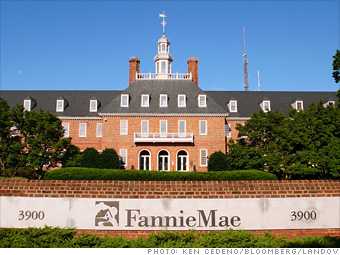
|
| Fannie Mae |
If the bank is doing poorly for some reason, the stockholders get wind of it, and the price of the stock declines as stockholders sell out. The effect of this is to bring the "capital ratio" below the required level, and the authorities will require the bank to sell more stock. That will, in turn, dilute the value of the stock of the existing shareholders, decreasing the stock value. So the effect of a sharp drop in share prices will have almost the same risk to the bank as a run on the cash by the depositors because now the shareholders will sell more stock in the hope of getting out before it declines further in value. This happened in 2008 with the stock of Fannie Mae, which dropped from about $70 a share to $10 in a few weeks, prompting the Federal Reserve to offer to loan cash reserves, and if necessary to buy the stock. After that, it sent investigators to measure the solvency of Fannie Mae.

|
| Indy Mac |
This historic episode illustrates the valuable role of the stock market in sensing trouble before regulators are aware of it, and helps explain to Congressmen who want to pass abusive legislation that "The stock market won't let you do that." A week or so earlier, Senator Charles Schumer (D, New York) had made public a letter expressing his concern about IndyMac, another large bank, with the immediate result that there was a run on that bank which made it collapse. So, not only are there banking situations which Congress does not dare meddle with -- there are even situations which the Senate Banking Committee does not dare talk about openly. Naturally, this sort of situation wounds the egos of Congressmen, but a number of left-leaning and high-handed foreign countries have in the past nationalized their banks, with disastrous results. When a bank gets to a certain size, it is as fragile as a land mine. And just as dangerous to tamper with.
Deficits Don't Matter When Your Party Is In Power
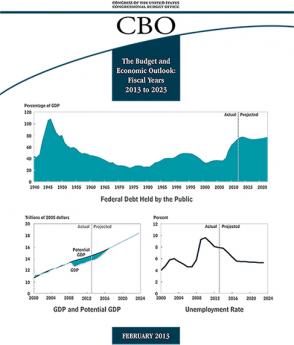
|
| CBO February 2013 cover |
The cacophony that is the economic debate: Paul Krugman reports today (March 11, 2013 in the New York Times Op Ed) that the February 2013 CBO report shows that America's deficits don't matter.
One of his points is that automatic stabilizers did their job: people lost their jobs -> unemployment payments went up -> the pain of the recession was lessened ... and as things improve, government expenditures will go down (are currently going down, in fact).
This is the basic macroeconomics one learns in college, but looking at the CBO's summary I have a hard time thinking our deficit situation is not a continuing problem. The bottom two graphs are hopeful, but the top graph does not inspire confidence. I didn't read the entire report and maybe Krugman did, but the graphs presumably are what the CBO thought summarized their findings.
Funny that Krugman and Cheney have both told us that deficits don't matter. I think maybe deficits don't matter when your party is in power.
Franklin's Admirers on TV

|
| Brian Lamb |
There are now three channels of C-span, continuous cable television programs about the influence of history on current problems. Sessions of Congress and its committees, the speeches of the President, political campaigns, are shown as they happen. But interviews and book reviews are shown in parallel, with an opportunity to go into the archives and organize originally unrelated programs into seminars on a current topic. The editor, Brian Lamb, has a light hand and considerable impartiality. But he's there, all right, organizing blogs into topics just as Philadelphia Reflections tries to do.

|
| Friends Select School |
This similarity of design had been floating around for some time, but it suddenly came into focus when I recognized myself in the front row of an audience on C-span, listening to Edmond S. Morgan talking at the Friends Select School about his new book on Benjamin Franklin, a few months earlier. Thank goodness I bought a book and had it autographed because the filming had been so unobtrusive I hadn't noticed it at the time. I clearly need to have haircuts more frequently. Professor Morgan's parting words that evening had stayed with me, "Franklin doesn't tell you everything about himself, but what he tells you -- is straight." That's quite a compliment from the editor of 47 volumes of Franklin's work.

|
| Walter Isaacson |
Grouped with this tv portrayal of me as a groupie were interviews with Walter Isaacson and some other Franklin biographers, taken at other times and placing focus on other aspects. Here again, more insights emerged from quickly considered replies to audience questions than from the prepared speeches. Replies to questions from the audience are more in a class with blogs, anyway. Whenever you get all of the adjectives and qualifications polished, you sometimes don't say what you mean. Perhaps that last comment can be rearranged to say that answering audience questions occasionally leads to blurting out precisely what you mean.
And so, two unrelated audience answers need to be linked. A question about Franklin's love life caused Isaacson to refer to Franklin as a lifelong seducer. From the unknown mother of his illegitimate son William, to the simultaneous flirtations with two famous French ladies that took place when he was an octogenarian, and not overlooking several other affairs with Cathy Green and Polly Stevenson and allusions to others, Franklin was obviously an accomplished seducer in the full meaning of the term. It is thus legitimate to suspect the techniques of seduction at work in many of his public projects, from starting the Library Company to persuading the French to help the Revolution. He discovered late in life what many have discovered about the life of a diplomat, and quickly recognized that he was already pretty good at what that seemed to entail. Let's slide to a slightly different application of that idea.

|
| Benjamin Franklin and French Women |
By the accident of hostess seating arrangement, I found myself seated next to two historians from Harvard, and somehow it came out that one of them felt that Franklin loved the French. Simply loved them. Somehow that didn't sound quite right when compared with Franklin's early years of mobilizing Pennsylvania to fight the French, starting the first National Guard militia unit to defend Philadelphia against French raiders, supporting General Braddock's expedition with his own money, urging the British government to sweep the French from Canada, and working most of his life to assemble the colonies and Great Britain into one world-dominating entity. It's true that 18th Century France was at the peak of scientific achievement, and Franklin the inventor of electricity was quickly taken in by the European scientific community, but that's scarcely the same thing as loving France. Louis XVI was in fact quite annoyed by all the attention Franklin was receiving. And so the scholar on TV went on to say that correspondence had been discovered in which Franklin quite casually remarked that during the Continental Congress he had strongly argued that America should stand alone and have no European allies. Congress it seems overruled him, so he dutifully set sail for France to seduce them.
We come to another chance social encounter. On a recent trip to Paris, the GIC had taken along as a speaker, no less than a member of the Open Market Committee of the Federal Reserve, a Governor of a Federal Reserve District, to speak about the threat of inflation and currency crisis. In time, our French hosts invited us to look at some documents of interest, like the Louisiana Purchase. Lying on the table was the original treaty between America and France, signed by B. Franklin. The Federal Reserve governor, making small talk, observed that Franklin sweet-talked the French into loaning America too much money, eventually leading to their bankruptcy. As I recall, my rejoinder was, "Well, just print some more paper money, right?" It was intended to be a jocular remark, but it somehow didn't seem to be taken as such.
GIC in Paris
|
||
| GIC logo |
Delegation Agenda
Sunday, May 11th:
6:30pm -7:00pm: Arrival and cocktails
Location: Aux Anysetiers du Roy, 61, rue St. Louis en L'Isle Metro: Sully Morland or Pont Marie
7:00pm: Dinner will be served; Registration and pre-payment was required for this event.
Monday, May 12th:
9:00am - 9:15am: Arrival and registration. A light breakfast will be provided.
Location: Bistro de la Muette, 10, Chaussee de la Muette 75016 Paris Metro: Muette
9:15 am - 10:00 am: Presentation by Michael Kennedy, Head of the General Economic Assessment Division, Department of Economics, OECD, on Outlook by the OECD.
10:15am - 11:30am: Round-table discussion directed by John Silvia, Chief Economist, Wachovia Bank, including Paul Thomas, Chief Economist, Intel, Tom O'Connell, Assistant Director-General of Central Bank of Ireland, Sandra Pianalto, President of Cleveland Federal Reserve Bank, Mario Baldassarri, Senator, The Republic of Italy, and David Kotok, CIO, Cumberland Advisors. Each participant will introduce a topic of concern to the group with GIC delegates acting as discussants. Chatham House Rule will apply.
12:15pm - 1:30pm: Lunch at Bistro de la Muette, sponsored by Cumberland Advisors and Wachovia.
1:30pm-7:00pm Free Time
7:00pm - 7:30pm: Cocktails and Hors d'oeuvres.
Location: Cercle de L'Union Interalliee, No. 33 Rue du Faubourg Saint-Honor' 75008 Paris Metro: Concorde or Madeleine, 5-10 minute walks
7:30pm: Private dinner with Paolo Garonna, Deputy Executive Secretary United Nations
Economic Commission for Europe and sponsored by Cohen and Company. Dress code for the club requires a jacket and tie, no blue jeans or tennis shoes please.
Tuesday, May 13th:
8:45am-1:10pm: GIC & CEPII Conference "Monetary Policy and the Exchange Rate: The Euro and the Dollar"
Location: Maison des Arts et M'tiers, 9 bis Avenue d'I'na, 75116 Paris, Metro: Iena
Full Program will be distributed at the event. Speakers and moderators include:
William Dunkelberg, Chairman, Global Interdependence Center
Agn's B'nassy-Qu'r', Director, CEPII
Lionel Fontagn', CEPII
David Kotok, Chief Investment Officer, Cumberland Advisors
David Woo, Head of Foreign Exchange Strategy, Barclays Capital
Manuel Balmaseda, Chief Economist, CEMEX
Denis Verret, Senior Vice Preside of Operations and Sales, EADS
William Clark, Director, New Jersey Division of Investments
Laurence Boone, Chief French Economist, Barclays Capital
Sandra Pianalto, President, Federal Reserve Bank of Cleveland
Christian Noyer, Governor, Banque de France
1:10 pm ' 2:30 pm: Luncheon for conference attendees at the Maison des Arts et Metiers sponsored by Barclay's Capital
7:00 pm: Dinner hosted by Christian Noyer, Governor of the Banque de France.
Location: Banque de France, Gold Library, 39, rue Croix des Petits Champs ' 75001.
Please enter via 2 rue Radziwill, at the north end of the Bank. Recommended metro stops for the Banque de France are Bourse, Palais Royal-Louvre, Louvre-Rivoli or Pyramides, all a ten-minute walk to the Banque de France. Dress code for the evening requires a jacket and tie. For security purposes, please bring invitation and photo ID and allow an extra ten minutes for security processes.
Wednesday, May 14th:
9:30 am: Arrive at the French National Archives, for security process. Please bring your passport for security purposes.
Location: French National Archives, 1 rue Roberty Esnault Peltierie, corner of 37 Quai d'Orsay, 75 007 Paris Metro: Invalides
10:00 am: Private tour of French National Archives where GIC delegation will have a viewing of French historical treasures such as the Louisiana Purchase signed by Thomas Jefferson, Original Treaty of Alliance signed by Benjamin Franklin, Original Treaty of Versailles as well as other historical documents.
1:00 pm: Luncheon hosted by Mr. Arnaud de Bresson, Managing Director, Paris EUROPLACE.
Location: Place de la Bourse, Palais Brongniart, 75 002 Paris Metro: Bourse (line #3)
Lunch will be followed by the presentation of the Paris financial market place.
4:00 pm ' 5:00 pm: Travel to meeting with Christine Lagarde, Minister of Finance. Please arrive by 4:30 to pass through security.
Location: Ministry of Finance Building,139 Rue de Bercy, Paris 12 Metro: Bercy.
5:00 pm ' 6:00 pm: Private meeting with Christine Lagarde, Finance Minister of France. Please bring a passport for security purposes.
Milton Friedman on Capitalism
Merrill Lynch Illuminates the Mortgage Crisis
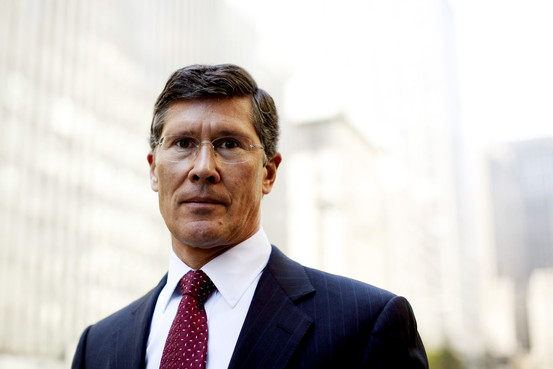
|
| John Thain |
On November 1, 2007, John Thain replaced Stanley O'Neal as CEO of our biggest brokerage firm. Thain was paid $83 million to take the job, and Stan O'Neal was paid $161 million to go away. Naturally, such large compensation packages for what looks like managing a failure received a lot of notoriety. However, a major purpose of such large salaries probably was to allow the new CEO to protest he hadn't created the problem, and reward the old CEO for allowing it to be said he had. Mixed up in this news attention somewhere is the downfall of the most prominent African-American businessman in American history, just as another African-American is running for election to the Presidency.

|
| Merrill Lynch |
Merrill Lynch purchased home mortgages from banks, repackaged them, and sold them to the public through its large distribution system. Somewhere along the line, Stan O'Neal presided over a corporate decision that, since these novel securities were paying a 30% return, Merrill Lynch should keep them in its own account rather than sell them. When credit markets froze up in August 2007, there were few public buyers available, probably adding to the inventory. In any event, Merrill was suddenly seen to be holding about $100 billion of toxic securities. With the markets in turmoil, it was hard to say what these things were worth but surely less than Merrill had paid for them. Accountants and accounting rules forced the company to "write down" the value on the company's books to a varying degree. In July 2008, however, the securities were sold, firmly and finally determining what they were really worth. The sale of around $100 billion in face value was for around $2 billion, plus splitting the difference on around $6 billion more with Lone Star, a Texas company run by John P. Grayken, which specializes in salvaging value from questionable securities. A cute sale-and-loan arrangement attracted admiration in accounting circles but is not central to the story. In the long run, Merrill is only sure to get $2 billion but might get one or two billion more. Out of $100 billion that Stan O'Neal had acquired.

|
| Ministry of Finance |
The day after the fire sale was announced, newspapers carried an illuminating story. Earlier in the year, Merrill had improved its lending limits (and diluted its stockholders capital) by selling stock to the sovereign wealth fund of the nation of Singapore. It was now revealed that this purchase contained a covenant that if the stock price fell below the Singapore price, Merrill would pay Singapore the difference. While this sort of covenant is not rare in situations where a loan is disguised as a sale for regulatory purposes, it now became clear that Merrill was under other pressures to put an end to progressive announcements of write-downs. The company would be wise to sell the toxic paper before it did more damage. That is, to put an end to bad publicity as embarrassing matters continued to come to light. After all, every investor would like to be allowed to buy stock whose price could only go up.

|
| Fannie Mae |
The other stockholders of Merrill Lynch may not agree, but it was probably the right bullet to bite. Merrill had been one of the few American firms allowed to do business in post-war Japan. They surely watched with dismay when the Japanese Government tried every imaginable expedient to avoid recognizing similar losses, including phone calls from the Ministry of Finance to forget about accounting rules. Nothing worked for Japan, so they had a deep ten-year depression which isn't entirely over. The market sniffs out the truth. You might as well confess, at least be able to re-deploy fragments of frozen capital to get out of your mess, instead of just pretending losses don't exist. John Thain's effort may not be worth $83 million a year because no one is worth that, but he is worth it if anyone is. So far.
It remains to be seen whether Lone Star will forever remain a vulture capitalist, or whether they will be seen as forging the weapons that defend securitization from banishment. Because of all the uproar, the market for securitized mortgages has disappeared. Except, that is, for Fannie Mae which already owns half the mortgage reinsurance in America. Government Sponsored Enterprises have good reason to resist public scrutiny of their books, but that is what is implicit in developing computerized measuring systems for prudent mortgage securitization. It seems elementary and obvious that computers are capable of inexpensive accurate monitoring of all the participants in this arcane process. But a reliable process of transparency for the securitization process cannot be developed except with access to real test data. It would appear that Lone Star is just about the only major entity with the necessary brains, money, and access to live data which would be required to put together an effective system. If you stop to think about it for a moment, you remember that John Thain came from running the New York Stock Exchange and before that had made a name running the computers of Goldman, Sachs. There's at least a chance that something good can emerge from this mess.
The Trigger and the Cliffhanger
Our own John Fulton recently told the Right Angle Club the market gossip about just who did what, and to whom, in the March 2008 beginning of the investment banking collapse. It begins to look as though Merrill Lynch had quite a bit to do with the mechanics of starting this impending market melt-down, although lots of other people helped.

|
| Bear Stearn |
Going back to 2005, Merrill was late to the securitized debt party and stretched to catch up. The broker reportedly sold large quantities of mortgage-backed securities (CDO) to the two hedge funds run by Bear Stearns. A buyer was able to convince himself such securities might pay as much as 20% income if leveraged up -- so attractive that Merrill independently decided to keep a lot of them for its own account. Nevertheless, the primary business of any broker is to buy and resell quickly, holding as little inventory as possible. Such sales, especially to hedge funds and institutional investors, were largely on margin. When suddenly the price of CDOs started to fall -- the rumor is that some unknown European bank started unloading them -- someone at Merrill made the decision to issue a margin call, that is, ask for cash to replace the loans. Bear Stearns reportedly asked for extra time to get the money together, but Merrill was adamant. So, Bear Stearns had to sell some of the CDOs in question to raise cash, dropping the market price. (this had not been the case seven months earlier when a bewildering market saw good stocks being dumped to cover losses in bad stocks.) But remember, in addition to the securities sold to Bear Stearns, Merrill itself had acquired huge quantities of similar CDOs; the internal coordination of Merrill has to be doubted. So the market value of what Merrill held declined, too, quickly forcing Merrill to announce an $8 billion mark-to-market write-down of its holdings, eventually followed by write-downs approaching $100 billion. In time, its own losses greatly exceeded the debt it was forcing Bear Stearns to pay. Merrill had shot itself in the foot.
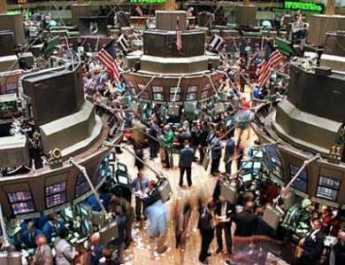
|
| New York Stock Exchange |
At that point, suddenly no one would write Merrill insurance against price declines through the Credit Derivative market, so it's stock price declined on the New York Stock Exchange, further reducing the amount it was allowed by regulators to lend. Because Bear Stearns was a major bookie in the Credit default swap market, both the insurers and the insurees were at risk; doubled-up "counterparty risk" was so enormous the Federal Reserve and U.S. Treasury felt they had to bail the situation out, even though other failing institutions of comparable size had been allowed to disappear. At a minimum, two parties were at risk, at worst, a whole daisy chain of companies insuring other overlapping companies multiplied the risks to much more than the loss that originally triggered the chain reaction. At $62 trillion, the Credit Derivative market is so much larger than other markets that anything to calm it seemed an urgent necessity. (As a matter of fact, when the swaps were sorted out they canceled each other by at least 90%) Every bettor had seemingly felt justified in betting the ranch, because some other bettor stood behind them, and then another and another; hard though it is to believe, that was nearly the case. Since Bear Stearns held thirty times as much debt as its total stockholder equity -- quite a different situation--, an average price drop of only three percent was enough to wipe them out. When margin calls went out to people who themselves had to issue more margin calls to pay the bill, the chain reaction did indeed bring markets to a precipice.
Until better gossip surfaces, this is the description now in circulation for the details of the slide which got going in March 2008. A larger view might be that things were starting to get ugly in 2005, and Merrill should never have entered this particular market at all.
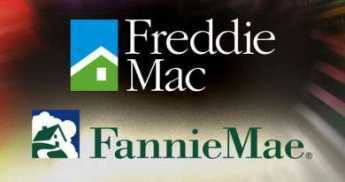
|
| Fanny Mae Freddy Mac} |
We are definitely not out of the woods. John Fulton pointed out the next crisis is that Fannie Mae and Freddy Mac are best regarded as insolvent. But since the credit crunch dried up the other half of the CDO market for mortgages, only Freddie and Fanny now remain to support housing transactions, with $5 trillion at risk in the market. That's about the size of the national debt, so when the Government assumed the risks of these two corporations, the national debt was effectively doubled. That could potentially send the dollar into a tailspin, along with U.S. Treasury bonds, while sending the price of oil skyward. So far, the Chinese have been remarkably cooperative, and Ben Bernanke and Hank Paulsen have been remarkably sure-footed.
So, what do we do if we fall into this abyss? Well, one thing debtors usually consider when threatened with insolvency is to walk away from either their debts or their creditors. In the nation's case with its debts, one major victim would be our system of entitlements. The national debt is now effectively $10 trillion. The unfunded entitlements are about $52 trillion; this is much the larger problem. Is it really true? Are we really saying these things?
John did indeed keep us awake, which is the major duty of a Right Angle speaker. .
www.Philadelphia-Reflections.com/blog/1509.htm
World Finance, Columbus Day 2008

|
| Prime Minister Gordon Brown |
WITH voters watching three weeks before the 2008 American presidential election day, finance ministers and their political masters met to decide a basic question: dare they risk disaster to save the existing system, or play it safe by sacrificing small banks to rescue big ones? That is, guess if the situation is so bad only strong rowers can be allowed in the lifeboat, or whether things are really manageable enough to try to save everybody but at the risk of worse consequences for failure. For example the credit default swap mystery; there are $60 trillion notional value insurance policies in existence to cover $20 trillion of bonds. Is that massive double-counting, or an actual disaster so severe it makes every other consideration trivial? Answer quick, please, the ship looks like it might sink. At first, it seemed strange a Labor government in England would propose saving only the strong until you realize that Prime Minister Brown is protected from his Left, while the Democrats in America want to use a fairness argument to win their election. A Republican lame-duck president must do the deciding, a man who has been shown to be both a tough politician and a fearless gambler; playing things safe is not his style. The Dow Jones average soared a thousand points in a day's trading on the prayer that things were finally under control. But take a look around.
Little Iceland and Switzerland are proud to house some enormous banks. But if those banks approach failure, their homeland treasuries are far too small to bail them out.
On the other hand, little Hungary has a negligible banking system, so Hungarians commonly borrow money from foreign banks. The national currency devalued by half in this crisis, so most Hungarian mortgages doubled in price. Reserve systems based on national governments suddenly look obsolete.
Try another approach. Little Ireland went ahead and guaranteed all deposits in its financial institutions. Money from England and the rest of Europe immediately poured in to enjoy that guarantee, forcing other grumpy nations to match the unwise Irish offer. There's a sense that nations are losing control of their affairs.
Europe consists of 27 nations, of which fifteen are in the Euro zone. There are common currency and a constrained central bank, but can this gaggle of geese possibly agree on concerted action in this crisis? America was once in this situation under the Articles of Confederation, but even after almost losing the Revolutionary War, George Washington was nearly unable to get the colonies to form a union. Even after this experience, the Southern Confederate States later adopted the same system of a central currency without a central government and really did lose their war.
Are we to infer from Prime Minister Brown's attitude toward banks that he might soon suggest ditching little nations in order to save bigger ones?
www.Philadelphia-Reflections.com/blog/1525.htm
TARP Demands But Does Not Create a New Standard of Fair Value

|
| Grandfather & Grandson |
Grandfathers tell their wide-eyed offspring that a thing, anything, is only worth what you can sell it for. Not necessarily what you paid for it, or what it cost to make, or what it may be worth in the future. That thing whatever it is worth what you and someone else agree to exchange it for, right now. Our economy depends on the idea that one person would rather have the object, the other person would rather have the money, and when they agree on the exchange of the money for the object, both parties walk away feeling better off. Multiply these little improvements millions of times, and the economy constantly grows richer, just by exchanging.
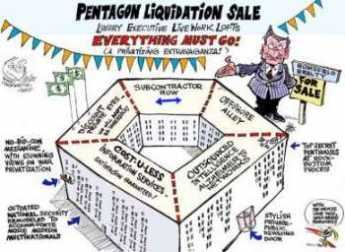
|
| Fire Sale |
Now, any seller has an option to refuse an offer, waiting for a higher price. This time option is essential to the wealth idea underlying trade; if you simply must have the money before a satisfactory offer appears, you will surely sacrifice some money on the trade. Maybe your counterparty makes a little more money but between you two, wealth is generally not created by fire sales. By definition, you sold before you got a fair offer, so wealth may even have been destroyed and at best the other person's gain just equals your loss. So, everyone is enjoined to conduct business and affairs in a way that makes it possible to wait to trade until a fair offer does appear, but even that maneuver is not as satisfactory as an immediate fair trade.
In the frozen markets of 2008, trade is coming to a halt because so many people are holding off on sales; wealth is definitely being destroyed in the process. Government intervention is proposed as a method to assign a fair price and make trades. The process is generally that the government will offer to buy these frozen securities, hoping to hit fair value precisely and hoping both sellers and buyers will accept that price. Since the government agents are spending other people's money, they will likely overpay and must lean against that tendency.
If the government pays too little, buys the securities and then resells them at a higher more nearly fair value, the government will make a profit, but the seller suffers. That's really not the intention at all. Skinning the seller is not desirable because wealth is destroyed in the process; keep it up and a recession will result. On the other hand, if the government pays too much, it will eventually lose money. The world economy will suffer from any outcome other than striking just the right price. Therefore, the government insists on receiving a warrant against the common stock of the seller who made an unearned profit, so the profit returns to the government. If there is no profit, the warrants are worthless, so they can be seen as a harmless disincentive against overpayment. In 1991, a similar credit bubble overtook Scandinavia after the fall of the Soviet Union and the unification of Germany. When it all shook out, the Swedish and Finnish governments lost 2-3% of their GDP on the interventional sales, Norway's made a profit of 0.2% of GDP. During the bubble preceding intervention, Scandinavian real estate, and the stock markets went up roughly 200% before they crashed; four years later, both real estate and stocks were up over a thousand percent.
It seems churlish to mention it, but this plan is only a stop-gap. It may get markets unfrozen, but when trading resumes they may thaw down to lower prices. In fact, prices are almost certain to fall if we face up to a realization that prices were too high, to begin with. House prices were just too high, oil prices were too high, and maybe a lot of other things were overpriced. As a nation, we borrowed too much, bought too much, forced prices too high. Leveraging, borrowing and prices all must, therefore, come down. But slowly and gradually, please. We will eventually grow our way out of this housing glut; floods, fires, and population growth will eventually use up the housing surplus.

|
| Credit Bubble |
Meanwhile, we have a short-term and long-term problem with determining fair value without ongoing transactions to verify them. In the short term, some government employee must judge the fair value of securities locked in frozen markets. When the crisis is over, that job is done. In the longer run, it will be necessary to maintain a continuing estimate of the value of the securities held by banks and corporations, so the proportion of debt can be calculated. Recent debts of investment banks were often 33 times the value of their stockholder equity. That seems to be too risky, and perhaps the regulators should insist on ratios of 10 to one, such as most commercial banks maintain. The best ratio is one problem, but a greater one is that no one can be sure what the underlying equity is worth unless an active market provides a precise comparison. There has been a tendency to turn to accountants to calculate an answer to this uncertainty.
In November 2007, FAS 157 was issued, declaring that fair value will be whatever the owner can sell a security for. In frozen markets, that sometimes proved to be nothing at all and obviously caused problems. This Financial Accounting Standard replaced Statement 125, which declared that fair value was whatever an informed buyer would be willing to pay. These two standards, in the absence of active real transactions, can differ so widely in a frozen market that statutory measurements of corporate riskiness are sometimes highly inappropriate. No amount of splitting the difference will satisfy the participants when serious issues are at stake since their resolution depends on the time available to find a willing counterparty, and during that interval whether alternative resources are available to satisfy creditors. Many traders have misperceived the signal when perfectly healthy securities had to be dumped in frozen markets. When the store of healthy securities runs out however, distressed debts must be liquidated at a loss. The qualifiers -- trading volumes, available reserves, illiquid reserves, historical volatility -- of a more accurate estimation of riskiness are evident, but it is not clear that a unified scoring could describe them.
Taking Risks Demands Its Price

|
| downturn |
Someday, books will be written about who discovered what, and sold what, to make S & P futures suddenly go up and down 300 points in ten minutes on August 17, 2007, soon followed by violent volatility in many other markets. Confusion reigned for a few days, but within a week there was general agreement about the difficulty: the "spread" of interest rates between risky loans and very safe ones had been too narrow for months, and was reverting back to normal. Risk had been mispriced; a risky loan was just as risky as it ever was, as everyone should have realized. If the risky borrower was unwilling to pay higher interest rates, why would any lender bother with him? Since this had been obvious all along, why had lenders temporarily believed otherwise, charging rates scarcely higher for dodgy loans than for well-secured ones?

|
| Alan Greenspan |
Alan Greenspan (in 1996) had called this question a conundrum, but it's getting easier to understand. The emergence of prosperity in one decade among 200 million impoverished Chinese had resulted in wealth which found its way into international markets, much like a gold rush or the discovery of oil. Sudden huge wealth often cannot be easily assimilated, hence was available to loan at cheaper rates. The globalization of world finance has vastly improved the speed of markets to absorb money gluts, but in this case, had the unfortunate effect of spreading it out into less sophisticated corners of the world economy. It particularly affected residential mortgages, which proved to be the weakest link in the chain of lending and borrowing. Ten years of low-interest rates pushed up the prices of existing homes, tempting builders to overcharge for new construction, and inexperienced buyers to pay those inflated prices with cheap mortgages. Between them, Congress and the banks had devised ways to exploit this situation, making the collapse worse when it came. The interest on home mortgages was preferentially tax deductible, so it became the favorite way to borrow. Banks made it easier to refinance at a lower rate as the spread gradually narrowed. To make it even easier, reverse mortgages converted home ownership into an ATM machine with tax deductibility. Because home prices were steadily rising, banks were willing to reduce down payments, on the assumption that home equity would soon rise to represent the amount formerly required as a down payment. As it would have, perhaps, if homeowners had not promptly drained it out the back door of reverse mortgages. Second homes became a cheaper way to have a vacation; steadily rising prices encouraged outright speculation, called flipping. Congress reinsured mortgages, eventually most of them, through FNMA, and then pressured Fannie Mae to insist on spreading the joys of home ownership to people who could not afford the no-down-payment houses they were romanced into buying. Investment banks offered to buy the mortgages from the local originating banks in order to package them into securitized bundles, which thus deprived the originating banks of any incentive to reject eager buyers, no matter how dubious their credit standing. What is more, this process provided a conduit for spreading bad credit risk into the equity markets, including the equity of the banking system itself, and creating the temptation for hedge funds to start runs on the banks in novel forms. There once was a time when customers lined up at the back door to make withdrawals in a bank run. Since investment banks obtain their deposits by borrowing wholesale, they simplified the process of starting a bank run when the speculative process reversed. Which it did on August 17, 2007, possibly not spontaneously, but certainly inevitably.
Home mortgages were once loans for thirty years; even now, they extend for many years. Homeowners stay in one house for an average of seven years. For legal reasons going back two hundred years, they are non-recourse loans, meaning the house alone is at risk to the mortgage lender, who may normally not pursue the homeowner for assets other than the foreclosure, even if the other assets are considerable. In a housing bubble, this creates a special hazard for lenders during the inevitable decline of house prices back to normal. As house prices fall, as they should and will, many homeowners will find it is cheaper to walk away from a foreclosure than to pay off the mortgage. It has been calculated that potentially as many as 50% of mortgages might eventually find themselves in this squeeze. The situation differs from a car loan, for example. Every new car is worth 20% less than the sale price, immediately after the sale. But this does not tempt car buyers to walk away from their loan, because the car loan is a recourse loan. The uncomfortable prospect is that financial reverses alone might not be the reason homeowners submit to foreclosure. If this particular antisocial behavior loses its stigma, a very large proportion of mortgages could be foreclosed on owners who are perfectly able to pay them off.
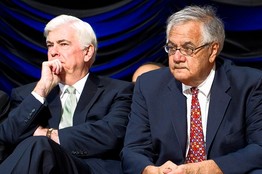
|
| Barney Frank and Chris Dodd |
For all these reasons, house prices are the main bubble in an economy overstimulated by cheap money, and mortgage financing is at the root of a banking crisis. The banking system itself is precarious because it too responded to the temptation of abundant credit at abnormally low-interest rates. The process took the form of over-leveraging in order to magnify profits in a competitive market. Greed was not the only motivation; corporate raiders in the form of Private Equity could swoop down on any company unwise enough to accumulate internal cash. The new owner would then substitute debt for cash, and the prudent company (under new management, of course) was no better off than if it had itself over-leveraged. The Federal Reserve limits commercial banks to loaning thirteen times their stockholder equity, but investment banks had the foolhardiness to borrow thirty times equity. A decline of only three percent in the value of their loans wipes them out. The Federal Reserve Bank of New York, by the way, is leveraged at over a hundred times its equity. The Fed can print money to pay its debts, of course, but the result is a falling value of the dollar in international exchange and ultimately, world inflation. No one predicts the half-way point in this decline to be sooner than two years, which means a recession lasting at least four years. The first two efforts of public officials to halt the decline, the purchase of toxic debt and direct lending to banks, have been abandoned as failures, and the Barney Frank/ Chris Dodd offer for Congress to repurchase mortgages was simply pathetic, with only two hundred responses when over two million were anticipated. If the public loses faith in the ability of the government to do anything about the matter, prices can be expected to overshoot on the downside, not just return to normal. House prices do need to decline, but slowly enough to avoid a panic. And American banks and businesses need to reduce the extent of their borrowing, but without measures which impair the ability of new businesses to make loans, or the ability of shaky businesses like the Detroit auto industry, to survive.
In closing, a word is needed to explain why the foreclosure of $100 billion of California and Florida bungalows should threaten a collapse in the trillions. Economists have fallen into the habit of equating interest rates with risk; the more risk, the higher the interest rates become. That's true, but the risk is not the only factor affecting interest rates. Since they are essentially the rent paid for the use of someone else's money, interest rates respond to the supply of money interest rates, just as supply and demand of rental housing affect rents. The flood of liquidity from developing countries into the world economy pushed interest rates down, but somehow that was taken to imply that risk had decreased. When interest rates go up again, for whatever reason, the money will effectively evaporate. The best example of this relationship is in the bond market. When interest rates go up, the principal value of existing bonds declines. With interest rates of 5% as an example, bond prices go up and down twenty times as much as the interest rate, but in the opposite direction. To repeat: when general interest rates rise, money in the economy disappears about twenty times as fast. That's a succinct description of what started to happen, when the prevailing risk premium returned to its normal higher level, on August 17, 2007.
Securities Trading Across Time Zones

Almost every day, stock market averages take a sharp jump, either up or down, a few minutes before closing time. Two explanations are usually offered. Regulations require brokers (but not banks, unfairly) to "mark to market", which is to reveal their newly calculated positions based on market prices, whether they traded or not. Those whose assets changed market value are aware of it, and may see an opportunity to speculate on the market's reaction prior to opening their own Kimonos. Mutual funds settle their accounts with customers based on end-of-day prices, but often fill their orders based on prices prevailing during the day; it's one of the advantages of exchange-traded funds (ETF) over index funds that they trade and settle at the same time. Short sales and hedges often wait to the last moment to close their positions; hedge funds and quantitative traders may lie in wait for this to happen and take advantage of it. Some quantitative traders use computers to transact tens of thousands of trades in an hour. The sums of money involved can often be considerable, and it wouldn't matter what different time was selected for a closing hour; the phenomenon would simply shift its timing to match. A second main reason for this explosive end of day activity is the New York Stock Exchange rule that members of the exchange must transact all business in listed stocks during business hours on the floor of the exchange. The self-serving motives behind that rule are evident to all; so a growing proportion of trades, possibly a majority, are transacted on other exchanges five minutes before the New York exchange opens and five minutes after it closes.
When some world-shaking event takes place after the closing bell, it is possible to watch the reaction of the world's stock exchanges moving around the world hour by hour, time zone by time zone. Announcing major financial news is often intentionally delayed until the New York markets are closed, as was the case with the forced merger of Bear Stearns into JP Morgan Chase. Other markets are open, however. The Japanese markets, in this case, responded with a 3% drop, and it was followed all night by a 3% drop every hour in each successive time zone until finally, the New York markets opened unchanged the next morning. After that big Kahoona had its say, all littler markets then scuttled back into line.
With electronic exchanges and trading becoming increasingly common, there is no technical reason why all exchanges worldwide could not remain open every day of the year, twenty-four hours a day. To make that work, however, all trading would have to be conducted by the machines without reference to human opinion. The machines can respond to sales volumes even better than floor traders can, but they would not respond to contingent orders on the specialists' books, or to the opinion of floor traders that hysteria was somehow getting out of hand. With some adjustments, even this could be handled, but the customers would resist. Customers have to get some sleep, even if machines do not; customers want to be able to change their minds in response to market action. Modern portfolio management theory suggests these customers might be better off if the whole thing were on auto-pilot. But just try to tell that to the customers; even the little old ladies would shake their umbrellas at you if you suggested it.
That doesn't mean the public is ready to go back to the Buttonwood tree, once a week. In France, the government has responded to the public clamor by shortening the work week to thirty hours, with plenty of long weekends. Where a holiday falls on Thursday, Friday is automatically a holiday as well. When it falls on Saturday or Sunday, Monday is a holiday. France isn't very religious, but is intensely respectful of scads of Saint's days. That happens often enough that there are quite a few five-day weekends.
Philadelphia's Global Interdependence Center was recently touring Paris during one of those five-day weekends, on a Friday. The Americans were the only people in a town of five million people who were wearing ties and jackets, and the natives at the sidewalk tables didn't need to hear our accents to know who we were. A visit had been arranged at the Bourse, for a nice lunch with the marketing folks and a sales pitch by an official of the stock exchange. With masterful diplomacy and graciousness, we were told interesting stories about the history of the place, ending up with a description of their deep sorrow that so few Americans list their stocks on French Exchanges, or even trade their European holdings in France. After all, Paris is only a one-time zone away from London.
"It isn't the time zone, sir", spoke up one American unaccustomed to wine with lunch. "It's the five day weekend."
www.Philadelphia-Reflections.com/blog/1483.htm
Buying Corporate America with Cheap Money

|
| The Rock of Gibralter |
In the summer of 2008 Philadelphia was astonished to read that the rock of Gibraltar, our family controlled Rohm and Haas had been sold to Dow Chemical company for $15.4 billion; corporate control will shift to Michigan. A week later, the Hercules Powder Company of Wilmington was sold, and then Budweiser Beer was sold for $56billion to a Belgian firm. The big old philanthropic families were cashing out.
While it may be true that taxes and philanthropic inclinations will lead this cash mountain to be transferred to non-profit foundations of benefit to the local communities, these sales are all a blow to the prestige and vitality of the cities which were once power centers of the world. Worse still, these prominent families with access to expert investment opinion may have reached the conclusion that it was better to have the cash than the business, or better to have the flexibility to shift the cash to more promising investment opportunities. Maybe they seek to diversify, or flee to gold, or invest in commodities, the next coming bubble. To what extent the falling value of the dollar motivated the purchase by foreigners or through foreign intermediaries is unclear, but it would surely be a consideration for foreigners to ponder. Worse still, these families may have decided they need to transfer more of their assets abroad. The glamorous investment advisors to large universities and major foundations are certainly advising their clients to invest much or even most of their funds to foreign investments.
Under the circumstances, one would wish that foreign investors would shrug off considerations of national pride and concentrate purely on the economics of their transactions. But not likely; just as we grieve to lose these brand names, they must be thrilled to show off their new possessions, and eventually to use their control to shift power. The Secretary of the Treasury makes the unhelpful declaration that a strong dollar is important since he does not need to continue that avoiding a steep recession is more important.
That's the way it is. Keynesian economics waters the currency causes a fire sale of assets and fires the flames of inflation. Now, what?
Federal Reserve Changes Its Business Model
Americans generally do not begrudge the success of neighbors; the achievement of someone else takes away nothing from me. In that spirit, we like to see developing countries rise up out of poverty. A more prosperous world is a safer one.

|
| Philadelphia Federal Reserve |
Rising international prosperity can, however, disrupt matters. When developing countries become producers, they can get inflation if they suddenly have more money than they know how to spend. Sudden wealth can come from discovering oil or gold or copper; slowly learning how to manufacture something is a safer way to prosper. Inflation and huge internal income disparities often lead to revolutions, so the wiser countries sterilize local money by exporting it. Coups and dictatorships are what happens if a developing country doesn't export its inflation; sudden wealth gives the appearance of being underserved. Conversely, our recent dot-com and Sunbelt real estate bubbles show what happens to the neighbors if developing-world inflation gets dumped on them. Eventually, of course, developing countries eventually balance their new production with new consumption, and the world settles down to a new balance. Never mind denouncing the rubbish the newly-rich decide to consume; its only problem for others lies in using up the world's resources faster. Developing countries commonly export inflation to other nations in the form of commodity inflation. The neighbors can soon have a commodity bubble on their hands; when any bubble bursts, a sharp recession can quickly follow, and after that, some other kind of bubble appears. What is new and disruptive is not oil or gold or copper; it is too much money.
With luck, these disruptions consequent to a neighbor's prosperity are soon overcome by improvements in productivity. But productivity itself can create a bubble. One huge productivity windfall for America is the astonishing thirty-year extension of longevity we have experienced; in time, we will surely devise occupations for retirees more productive than thirty-year vacations. Such balancing adjustments right now seem most likely to grow out of electronic productivity, using home sites as work sites.
So in short, America must read just like everyone else and one systematic readjustment has just surfaced at the Federal Reserve. The flood of money from China and the Persian Gulf sought an outlet in our economy, adopting the device of shifting American credit sources from banks to Wall Street ("securitization"). Cheap money once derived from bank deposits in local banks; since it now often originates abroad, it now must travel through the "carry" trade and similar innovative channels for foreign surpluses to get to Wall Street investment banks, which in turn distribute the money ("credit") to American businesses which can use it more productively than the developing countries can. Through securitization (turning loans into securities), Wall Street was able to make home mortgages directly, with only token involvement of local banks. Credit markets froze up because the new procedures had neglected to enlist local bankers in the process of checking the credit-worthiness of borrowers. So long as Wall Street can continue to find new sources of cheap money, this upheaval of finance is likely to be permanent because it is desired by both sides. Access to cheaper loans and access to safer investment harmonize the needs of the haves and the have-nots. Because in its haste this new development precipitated a banking crisis, there is some danger that Congress will overreact by prohibiting securitization rather than correcting its flaws. In every participant's eyes, it's cheaper and more efficient, but new efficiency threatens old inefficiencies. This one threatens the old deposit-based banking system, and since the Fed's control of the currency is based on its control over the depository banks, it threatens the Federal Reserve. That's the real driving force behind the Fed seeking control of non-traditional credit sources; that's now where the money is.
On March 16, 2008 things came to a head with the impending collapse of Bear Stearns, a Wall Street investment bank heavily involved in Credit Derivatives. There are rumors the rescue plan implemented over a weekend had actually been devised and held ready long before then. Many imperfections now surface with experience, but at least the plan had likely been explored as thoroughly as logic without direct experience ever allows. For example, the dispersal of manufacturing around the globe favored making pieces of a product and selling them to an assembler, rather than enveloping the whole process of making a product in one giant corporation. It's cheaper, that's why they do it. But the process of buying and selling pieces to other companies greatly expanded the need for short-term credit. Therefore, it was quite unexpected that Lehman Brothers, which specialized in such short-term loans, suddenly went bankrupt for lack of quick access to capital. In the panic, it is unfortunate that Lehman apparently concealed its situation from investors. There is a danger that Congress will draw the wrong moral and somehow block the globalization of manufacture.
The Federal Reserve Act was passed by Congress in 1913, and most observers believe the Fed's inexperience in 1932 repeatedly made matters worse in that formerly greatest of all bank panics. The new plan of 2009, therefore, had to step around some limitations imposed by Congress in the past, the political pressures generated by an impending presidential election, and the powerful resistance from private industries whose future was affected. The adroitness with which such a complex matter was handled over a weekend will surely become legendary, but maybe not soon. Probably because of existing legal roadblocks, three "lending facilities" were created, but a single device was at the heart of it. Instead of lending money, the Federal Reserve offered to swap securities with new non-bank managers of retail credit. The investment banks held massive security for loans which could not be sold in paralyzed markets but could be swapped or used as security for a loan, particularly if the government stood behind the innovative transactions. Wall Street in a word had plenty of wealth, but could not turn it into money fast enough to pay its bills. So sidestepping the legal constraints, instead of giving Investment firms money as a lender of last resort, the Federal Reserve swapped Treasury Bills for the "frozen" assets held as security for mortgage loans. The securities had been "caught in a loan" as the expression goes. There isn't much difference between Treasury bills and cash, or between exchanging bonds and selling them. But the new approach could be quickly and legally accomplished, and once done, the Federal Reserve was the master of investment banks. It became effectively their lender of last resort. A great deal of advance thought must have gone into devising this readjustment to the reality that over half of loans were not backed by bank deposits, but by the securitized debt of foreigners. Regulations will ensue, hearings will be held and laws passed, but the Fed has regained control of the money supply if it can manage to make this maneuver understandable by the public.
There was a moral hazard in this; the presence of a lifeguard tempts swimmers into deeper water. It was somewhat inflationary in the midst of an inflation threat. No doubt the Federal Reserve regards these negatives as prices worth paying, and they probably are. The decisive remaining issue is not whether the initial shape of this transformation is exactly correct; it surely isn't. Just as was true in 1932, what will ultimately matter most will be whether, with this altered stance, the Fed will adjust quickly and appropriately to future difficulties. And whether politicians will even permit it to do the right thing, assuming anybody then knows what the right thing might be.
www.Philadelphia-Reflections.com/blog/1465.htm
Premature Solutions to the Credit Crisis of 2007

One of the things being said in Academia in 2008 is that the 1929 crash was the result of many futile attempts to preserve the gold standard. That's the first time that particular formulation has surfaced in eighty years. It may not be correct at all, and even if correct it doesn't say what should have been done about it. Life is short and the Art is long, but somebody must do the best he can with the information available. Unemployment was over 30% in those days, and hundreds of Americans froze to death in the Depression because they could not afford to heat their rooms. Right or wrong, there are times when some action must be taken. But if you can possibly sit tight and figure out a sensible thing to do, it's certainly better.
So, we hear proposals from Henry Kaufman to create a separate Federal Reserve for big institutions alone, while others say banking oversight is already too fragmented between the Fed, the Controller of the Currency, the Secretary of the Treasury, the FDIC, state banks and national banks, the SEC, the Bureau of Management and Budget, and on and on. This line of argument takes the formulation that we should regulate mortgages, no matter who is involved in them, rather than banks, on non-bank institutions. On one point everyone is in agreement, that we need more information more quickly, more transparency, less asymmetry of information. At the same time, everyone is aware that it probably will eventually be possible to describe this whole mess on one sheet of paper; the truth is totally hidden by information overload. Don't talk so much; say something.
At the GIC (Global Interdependence Center) recently, a brilliant professor of the Wharton School gave a magnificent summary of the situation, now nine months old, enumerating a number of insights which had not even occurred to an audience of bankers and businessmen. They applauded enthusiastically, and then someone asked how Credit Default Swaps fit into this picture since they had not been mentioned. It immediately became embarrassingly evident that the professor knew almost nothing about that topic beyond a couple of pat sentences. But Credit Default Swaps now total trillions and trillions of dollars, more than doubling in a year. Since they are private transactions unreported to regulators, no one has measured the matter or will divulge what has been measured. But since they represent a volume several time the size of the underlying debt market, and every swapper swaps with someone else, it seems inevitable that huge imbalances exist somewhere. It would be nice to have a general idea out of whose pockets the excesses come, and into whose pockets they go. Maybe all this is irrelevant to the present crisis, but it isn't irrelevant to the distrust and fear in the markets. If someone proposes a law about this situation, he had better have divine guidance.
An example of what causes markets to freeze up because people are afraid to buy, comes from an anonymous person in an elevator. Speeding between floors, he remarked earnestly to a friend, that when he worked for Goldman Sachs his department churned out dozens of innovative debt instruments. If one of them happened to get popular, then and only then did they set about devising ways to measure them, and adjust the prices. It's impossible to stop rumors of this type because they sound so plausible. In fact, they may even be true.
In fact, some of the most incisive comments come from people with no insider information at all. Such as a businessman who listened intently to the lecture and then called out, "Where were the accountants in all this? Aren't they paid to know what is going on?" The answer was that FASB rules should be tightened up. Maybe so, but it sounds a little thin.
The political risk is considerable. Only 6% of the population is old enough to remember 1929 and its aftermath, only 25% more can remember 1973, and 25% more can remember 1991. That means that nearly fifty percent of the public can never remember a severe recession at all. A politician running for office could tell them anything, and they would have no reason to challenge it. Or put it this way: the advisors who elected a young President could tell him anything, and it isn't certain he would fire them for it.
Linking Oil Prices to the Credit Crisis

|
| Soaring Gas Prices |
When two unexpected things happen at once, it's natural to think them related, but it nevertheless has been a little hard to see how soaring gasoline prices would be caused by falling prices of California homes, or the other way around. If these explosions are indeed unrelated but only occurred at the same time, it leads to the "perfect storm" theory that neither alone could cause a market freeze-up, but perhaps two at once would overwhelm the safety buffers of international markets. Whichever way it turns out to have been, there is a political hazard. The cold northeastern part of the country is mainly concerned about the cost of home heating fuel, while the warm southwestern states naturally focus more on the housing glut and falling home prices. The political danger would be that congressional representatives of the two regions might get polarized along those lines, potentially blocking effective national action to rescue either problem.
All of this may turn out to be a pipe dream. Eight months after the financial panic began, evidence has been brought forward that a quite sizeable amount of the rise in the price of oil, as much as half of it, may be due to speculative activities by hedge funds, attempting to use oil as a hedge against the falling dollar. Since the dollar is falling because of interest rates lowered by the Federal Reserve attempting to rescue banks, as well as stimulus packages passed by Congress for the same purpose, everything may be part of the same parcel. If this theory proves out, it helps concentrate government action on the basic culprit and quiets at least some of the blame game.
It even suggests a partial solution might be to persuade Europeans to be less protective about the abnormally strong Euro and let it ease a bit. This is the third identifiable source of the weak dollar, which the American public has so far largely ignored. During a presidential election campaign, the aroused American car driver might be persuaded to raise quite a fuss about what those non-voters across the ocean are up to again.
OUR NICE HOUSING BOOM COLLAPSES
Three Basic concepts at work:
- Steep yield curves (the normal situation) are good for banks; inverted curves (a rarity) are not. The 2006 inversion was caused by the bond market accepting abnormally low long-term interest rates, so the "spread" between risky loans and safe ones displayed a diminished "risk premium".
- The Federal Reserve then lowered short-term rates by printing more currency.
This caused an inverted yield curve to return to its normal shape, but the 2006 problem was caused by too much(Chinese) money and this action added to it. The banks were rescued, but the currency was inflated. - This innovative response will probably become a standard readjustment.
But it only keeps the ship from tipping over after a sudden wave; it doesn't address the approaching storm.
 Risk premiums soared in August 2007. What seemed safe, abruptly was risky, and only available at higher prices. 
|
What happened in August?....The "risk premium" --and, consequently, mortgage interest rates-- suddenly went back to normal. About $90 billion of foreclosures seemed probable. We had built far too many houses for people who couldn't afford them. Surplus houses remain for ten years, depressing all real estate prices, making everybody feel poor. Recession, anyone?
What did the Federal Reserve do? To protect the banks, Bernanke dropped short term interest rates. (This steepens the yield curve.) As the panic spread, he dropped rates some more (This floods the country with money). Inflating the currency cheapens the dollar, which robs foreign investors. Foreigners sold stock to escape, prices fell. Seeing prices fall, everybody else sold a stock. 1929, anyone?
So what? They're only foreigners. If Bernanke raises interest rates, we get a recession. If he keeps them low for too long a time, we may get hyperinflation. So, he probably hopes to drop them for a few months, then raise them again. Jimmy Carter got "stagflation" trying this sort of thing. Green eyeshades, anyone?
Remember how naughty "redlining" was? Well, now we bash the banks for "stupid mortgages". Banks issued cheap mortgages for inflated real estate -- and immediately sold the "subprime loans" to investment bankers as "collateralized bonds". We are still uncertain who holds these things, but at least $40 billion were in the hands of Wall Street when the music stopped. Wall Street had to sell perfectly good (?) stock to pay their debts. Blue chips, anyone?
Why was the risk premium so low? The Far and the Middle East had something to do with it. But mainly, securitization led to undue emphasis on statistics. In a housing boom, foreclosure rates seem to go down but are really only being diluted by new loans. The fall of BNP Paribas was a sudden wake-up. Then, the computers of the "quants" exposed a flaw in their programs when they detected heavy selling of perfectly good stock and announced the End of the World..
Thank heaven it happened before things got serious.
WWW.Philadelphia-Reflections.com/blog/1331.htm
2008 -- A Time to Reflect
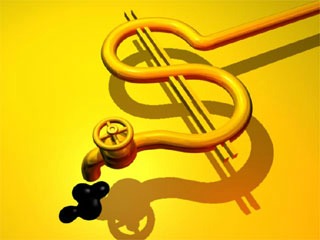
|
| Gas Prices |
The Northeast portion of America is cold; most of its public concern traces back to high prices for fuel oil. The Southwest, however, is warm and more concerned with house prices and mortgages. Air conditioning has been the main source of the South's revival. This geographic split in attention will have a powerful effect on politicians in an election year. We can only hope the ambivalence cancels out and restrains legislative action until it is at least clear what the extent of the damage is. Meanwhile, don't do something, just stand there. A central question is whether there are too many houses in California, or too few. For decades, Westward migration outpaced housing construction, so California house prices have long been too high, mortgage lending too "innovative". While it is natural for western builders to feel there are now too many houses for sale in California, a case can be made that present noises are merely squawks as house prices settle to more reasonable levels. With luck, the West may just ride it out. But after adjustment for current emigration, an excessive number of housing units per capita might just warrant paradoxical solutions for California. Empty houses usually breed slums, that's pretty simple. But please, could someone explain securitized mortgages?
Other sorts of people should be pondering where the long slow decline of banks is going to lead. It makes a difference whether regular banking and investment banking will merge -- or have a collision. Much will depend on how well the two industries manage their massive computer systems; the heavy reliance of commercial banks on software vendors (rather than doing their own programming) is not an encouraging sign. The person who can fix their problems lives in India. Something is going to have to change in the way the Federal Reserve manages the money supply if money is largely borrowed abroad. Commercial lending migrates toward non-bank sources and eventually deprives the Fed of useful tools. Commercial banks, investment banks, and the Federal Reserve all have different sorts of risk. But when a complex system is placed under stress, it is the weakest link in the chain at that moment which breaks.
Happy New Year, every one.
Stress Tests for the European Union

|
| Dr. Ronald J. Granieri |
Dr. Ronald J. Granieri of the office of Secretary of Defense recently spoke to the Right Angle Club about recent threats to the unification of Western Europe. One of his more striking points was that the 1989 collapse of the Soviet Union ending the Cold War, may have unintentionally thwarted the plans for a European Union. The Iron Curtain running from the Baltic to the Black Sea had served as an Eastern boundary for European dreams. When the curtain suddenly disappeared, the European Union was flooded with applications for membership from the recently liberated, formerly Communist-dominated, Eastern Bloc. It was understandable why these countries would wish to get away from Russia, and equally understandable that Russia would be annoyed. But bedazzling expansion was quite unexpected by the European Founding Fathers, who were having enough trouble without doubling their number with weak economies. If Napoleon or Bismarck or some other empire-builder had been in charge at that time, Europe would either have been expanded by brute force, or its borders slammed shut with brute force. But in the clutch, no one was thinking big. Acquiring twenty new nations was an undreamed-for opportunity, but a technical headache for academic theorists. It called for bold action at a time when bold actors were not in charge.
Although it hurts European pride to admit they were following the American model, most of the problems they were encountering were the same problems our own Founding Fathers encountered in 1789. There were two main differences, however, one of which had been written into our Constitution. The other went largely unnoticed. The written difference was we had a bicameral legislative branch, designed to address the issue of voting rights straddling three big states and nine little ones. Pennsylvania had already gone through a dispute over the unicameral Pennsylvania Legislature, which proved to have so much power it unbalanced the three-branch system of government. Consequently, the Philadelphia Constitutional Convention, held in that same building, was already uneasy about unicameral legislatures. It was John Dickinson the delegate from little Delaware, who went to James Madison (of Virginia, then the largest state) and told him bluntly that if Virginia persisted in demanding a unicameral Congress with representatives elected by population size, well, there just wasn't going to be any Union. The three big states refused to participate in any one-state, one-vote, system, while the nine small states wouldn't submit to large-state domination by population size. Either voting by state or voting by population would inevitably result in one side winning every hotly contested vote in a unicameral legislature. So, we had solved our problem by having two legislative houses, one of each kind, and agreeing that legislation would only proceed if both houses were in agreement. What made any legislation possible under these terms, was the informal system of "logrolling", in which informal agreements on seemingly unrelated matters would compensate the loser branch of government, and the states they represented. Since in modern Europe, any group of ten or twenty states in a union would surely have memberships of unequal size, bicameral legislatures seem to Americans to be a perfectly sensible arrangement, so get on with it. The insistence by the League of Nations and the United Nations for one-vote, one-nation arrangements, is a major reason the United States never permitted these supranational forums to have much power.
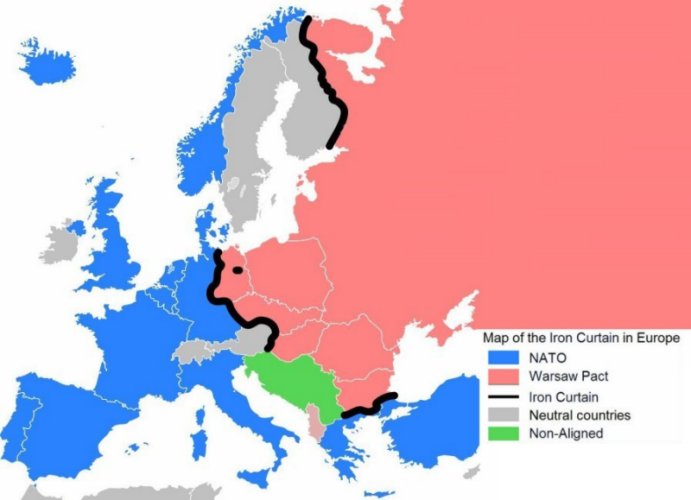
|
| Iron Curtain |
It's an unspoken truth however, that other nations do not see it our way. That's partly because the German and other parliaments going all the way back to the Roman Senate had established a unicameral tradition in Europe. The other main but unwritten cause of Constitutional differences between the two continents is that we had been surrounded by thousands of miles of ocean, and never had to consider the danger that external and internal enemies would join forces to frustrate our decisions. It is true that many attempts were made to do just this, but they were immediately recognized and easily quashed in the past. As long as the Iron Curtain was operational, Europe thought it might have such ocean-like protection as well, but events in 1989 swept that idea away. With a large addition of formerly hostile states, some members were occasionally bound to join forces with Russia or China, even though they were nominally loyal citizens of the EU. Traitorous behavior had long been an underlying cause of splinter parties and brutal suppression, but that was when Communists were thought by everyone to be agents of a hostile foreign power. With the end of the Cold War, they might become misguided local citizens exercising freedom of speech, claiming a right to argue for behavior which would have formerly been denounced as traitorous. Nations harboring few such inclinations soon became cautious about joining a government with nations who had a great many of them. Citizens of recently enslaved nations were particularly resistant to soothing arguments about unity. It must be confessed that the example of our own Civil War lends force to this feeling of what might happen.

|
| Baltic and Black Seas |
It may be claiming too much to describe the fall of the Iron Curtain, as the major reason for the decline of interest in forming a political union in Europe. That decline did occur and was replaced by the rather weak stratagem of leaving unified government to another time. In its place appeared a strategy of economic unification, hoping the benefits to everyone would become so apparent that unified nationhood would follow. A substrate emerged, narrowing it to a unified currency, the Euro. Bankers and other financial experts argued that such unification would be fairly simple and effective. And so it proved until the same difficulty appeared in a different form. The design of the Euro Currency Zone had apparently underestimated the problems of a foreign currency operating together with the Euro, and variants of Gresham's Law surfaced. Small nation members like Iceland and Cyprus found their small banking systems could not cope with huge inflows of flight money, escaping to tax havens within the Eurozone. As well, underdeveloped member nations actually romanced non-member capital to relocate to their shores. Since local currency is ultimately supported by the full faith and credit of the nation, local banks and economies cannot easily deny equal protections to foreign capital, except temporarily while exchange controls are applied. But when a sufficiently small nation is thus forced to guarantee a sufficiently large amount of foreign money, local banks and markets will be destined to crash. If, in addition, the member nations are deprived of the ability to devalue their currency as the Eurozone could, some type of informal arrangement for a two-value currency had to be devised unless more prosperous members like Germany were willing to subsidize the money flows. When two currencies of unequal value circulate together, said John Gresham to Queen Elizabeth I, the more valuable one will quickly disappear.
Barnes Foundation -- Drawing a New Moral

|
| Andrew Stewart |
Andrew Stewart, the Public Relations Director of the Barnes Foundation, and for thirteen years a member of its Board of Directors, recently addressed the Right Angle Club. He gave a new slant to the quarrelsome saga of Dr. Barnes' will, offering the point of view in favor of moving the paintings to the Parkway. It's useful to hear the legal and historical background because about all we hear are criticisms, balanced by joy at having the famous paintings where we can see them.
Essentially, the will declared a wish for the School and Museum to follow the original indenture. After the passage of time, the old board members died off, and the new board members found the Indenture to be out of date, like specifying the purchase of railroad bonds. Delivered in a charming Scottish brogue, the argument was fairly convincing. But it stimulated in me an entirely different moral from the eternal dispute between the right of a man to have respect paid to his expressed wishes for his own property, versus the self-defeating quality of the same restrictions with the passage of time.
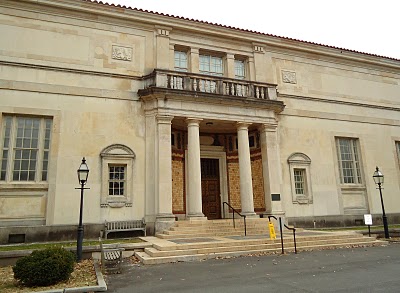
|
| Barnes Foundation |
Barnes was born in Kensington, and had a hard life as the son of a Civil War veteran who lost an arm in the war, and had a dismal time making a living as a butcher. Barnes was his fighting-spirit son, who worked his way through medical school. It was Jefferson Medical College, where I was on the faculty for decades. While it is true his patent medicine gave a permanently sickening color to the children who were treated for sinusitis, it is also true that in the form of eyedrops it prevented the transmission of syphilis to millions of newborn children. In that view, it was a real scientific contribution, although the medical profession continues to take a dim view of doctors advertising their wares. Although he was himself a failed artist, Barnes was a highly successful collector of (then) modern art and started a school with John Dewey to teach art appreciation to poor people. One by one, the local universities snubbed his wishes for an art appreciation school, and the local Philadelphia museums were pretty sniffy about his favorite artists.
In fairness to them, Barnes was probably pretty pushy in his demands. Unfavorable local reception to an exhibition which had received rave applause in Paris, convinced Barnes he was right and they were wrong. After this, Barnes developed a lasting hatred of Philadelphia and all its stuffy ways; he definitely didn't want his own impressionist art to be in Philadelphia, which would never appreciate it. While Philadelphia finally woke up to the value of Impressionist painting, Barnes never relented while he was alive. I hope I give a fair portrayal of the argument except for the politics and the legalities, that I know very little about.
But hearing the arguments, I see an entirely different moral to the saga. Ever since the inflation of the 1930s, fine art has appreciated in value, faster than the endowments to maintain the art. (That's probably a useful tip to investors, too.) It's fairly standard for a wealthy person to donate his art collection, plus a sum of money to endow the maintenance of the art. Most of the time, the size of the endowment is carefully calculated to grow at least as fast as the value of the paintings, because you have to ensure them, and pay for increased security, and increasing attendance. With the new trend toward inflation of at least 2% a year, the old premises don't work anymore, and the endowment eventually runs out. At that point, it runs into restrictions which -- to be perfectly blunt -- were created to prevent the trustees from pilfering the museum. A museum may not sell its art to pay for administrative expenses.
Consequently, The Barnes ran into a situation where it had billions of dollars worth of paintings in the basement, which it could not sell, and could not even hang in the museum because of Barnes' specifications for what went on the walls. This situation isn't going to change, because a dollar in 1913, when the Federal Reserve was created, is now scarcely worth more than a penny. And the present Fed is committed to 2% inflation, forever.
So, how about this: let the lawyers who write wills, and the Orphan's Court which administers them, insist that the art collection be divided into two parts. One would be the permanent collection, just as at present, and the other would be eligible for sale in the judgment of the Orphan's Court.
Minimum Wage Fangdoodle
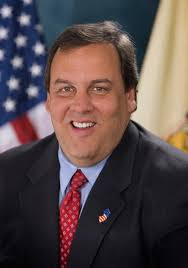
|
| Governor Chris Christie |
The November 2013 elections have been widely accepted to be a spectacular win for New Jersey Governor Chris Christie, suddenly making him a presidential front-runner for 2016. The only other significant election was a close win in the Virginia gubernatorial race for a fund-raising crony of Bill Clinton over the Attorney General who started the Supreme Court Case over Obamacare. In the view of the news media, there were only two elections in this off-year -- a landslide in New Jersey, and a dead heat in Virginia, for Governor.
Well, as a matter of fact, there was also an election in New Jersey for all of the members of the legislature, which means that I was running against the Democratic majority leader in the 6th Legislative District. I got 19,000 votes, but I needed more to win. At least in my family, it was a big event, particularly since no one else in New Jersey contributed a dime to my campaign, and while Governor Christie may have whispered a few encouraging words to me, there was no evidence of his assistance. But you can forget about that, too, because this election was really about the minimum wage.
The first inkling I got that something was up was receiving a sample ballot, three days before the election, where there was a referendum question about the minimum wage that no one had told me about, although it could scarcely have been a secret to get it on the ballot. And secondly, on election day there was scarcely any evidence of campaigning for Democrat candidates except for a few yard signs, but literally, dozens of campaign workers poured into the subway stations, handing out great volumes of campaign literature about the minimum wage. Even that went past me unnoticed, because who in the world would vote for a proposal which would increase unemployment during a severe recession? When I expressed the same sentiment to my Democratic friends, I was surprised to discover they all knew about it in advance. In retrospect, that was a fairly good indication that the Internet had selectively urged support of this proposition to the party faithful, but had not said one word in campaigning for it. It won endorsement by a heavy margin, as things soon turned out. What's worse, what had been endorsed by referendum had been to amend the constitution to this effect, automatically indexing it to the cost of living. It's going to be pretty hard to reverse that since all constitutions have been written to make it very hard to amend them.
p> In the week after the election, I notice that several other states have been considering raising the minimum wage. An article appeared on the editorial page of the New York Times arguing that research showed there was no evidence that raising the minimum wage caused unemployment, and a few days later, Paul Krugman had a learned column on the Times editorial page to the effect that smart people all knew there was no reason to expect unemployment from raising the minimum wage, and only the hopelessly ignorant rubes would imagine there was reason to think so. Having spent some time with editorial writers, it seemed pretty evident to me that there was a nationally coordinated effort to convert this into a truism, accepted so widely it would be futile to argue against it. When it is also possible to see the existence of a campaign to impose a maximum wage (and not merely in Switzerland, where it was defeated on a ballot), the trajectory of a rising minimum wage meeting a falling maximum wage easily led to conjectures that what was really afoot was a campaign to take wages out of the marketplace. Or was that really the goal?
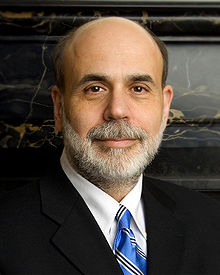
|
| Ben Bernanke |
For months, the Federal Reserve Chairman has been emphasizing that the Fed must obey two mandates: to maintain price stability and to minimize unemployment. Meanwhile, the dirty little secret among economists has been that unemployment is the main obstacle to inflation in the face of a massive enlargement of the money supply. Unemployment is currently at 7.1% and falling, while the Fed has lifted the veil of "transparency" to reveal it made a promise in double-speak to start selling some of the bonds it issued to combat the recession when unemployment reaches 6.5%. As time has gone on, Mr. Bernanke has seemed to back away from that promise. He is not so sure that unemployment is a good measure of unemployment, other measures may be a better measure of what we are driving at. He never meant to start selling bonds when unemployment reached 6.5%, he only meant that he might reduce the number he planned to buy. He never meant to make a promise, he only was being transparent about the current thinking of the Board. And anyway, Janet Yellen will take over his job in a month, so you can't very well bind your successor to do anything at all. What's this tap-dancing all about?
Well, it simply won't do, to suggest that the Federal Reserve isn't as independent of politics as it pretends to be. But everyone noticed that the stock market had a bad fainting spell when he suggested a few months ago that the Board had been discussing the matter; just imagine what it would do if he actually made a promise to act, let alone actually taking an action. By itself, such an announcement would probably send interest rates on a rise toward normal levels. The stock market mostly anticipates the future, so it would jump ahead of whatever action was taken. Since the United States is now the largest debtor on earth, a rise of interest rates would immediately add huge amounts to the current deficit and the projected national debt. The stock market would almost surely drop, possibly severely, in response to such commotion in the debt markets. And the national economy would certainly feel the deflationary effect of such activity in the financial markets, sending markets even lower. Fear of such a reaction would surely persist longer than the real need for monetary easing, making the resultant inflation even worse than it had to be.
 Is it possible the Obama Administration prefers a little extra unemployment, to risking a stock market crash before a coming election? 
|
| Minimum Wage Uproar |
In an era of desperate experimentation with the simultaneous solutions of several problems at once, perhaps the best conservative response to this paper is to seek ways to relax its inflexibility. The political process, particularly the amendment of state constitutions, is a lengthy and cumbersome impediment to agile management of the economy. It is fairly unlikely that a secret springing of a referendum trap can be repeated. The greater risk is that we will know what should be done, but become unable to do it quickly.
Meanwhile, the politicians are designing things and politicians like things simple. The Republican solution is to pass a minimum wage, but keep its benefit slightly below the entry-level wage; they get credit for passing it, but it has almost no applicability. The Democrat approach is to make a big noise about passing a meaningless bill, promising they will make it up with off the balance sheet entitlements, like health care and college tuition. Either way, usually nothing much happens after the election is over.
Replacing the Gold Standard
62 Blogs
Foreground: Parliament Irks the Colonial Merchants
 The Townshend Acts, upsetting trade and hated by Americans, bordered on economic warfare. The British tested tea, stamps and manufactures, but the most effective economic pressure points proved to be paper money and gunpowder. The Americans reacted to all this as second-class citizenship.
The Townshend Acts, upsetting trade and hated by Americans, bordered on economic warfare. The British tested tea, stamps and manufactures, but the most effective economic pressure points proved to be paper money and gunpowder. The Americans reacted to all this as second-class citizenship.
The Revolution is Over, Every Man for Himself
 Although his personal wealth in modern equivalents approached that of Bill Gates today, Robert Morris abruptly quit his business after a debate in the Legislature, just to show he had no personal bias. It ruined him, but John Hancock and George Washington did much the same thing. Ben Franklin agreed, but was shrewder about it.
Although his personal wealth in modern equivalents approached that of Bill Gates today, Robert Morris abruptly quit his business after a debate in the Legislature, just to show he had no personal bias. It ruined him, but John Hancock and George Washington did much the same thing. Ben Franklin agreed, but was shrewder about it.
Tammany: Philadelphia's Gift to New York
 All the bad things they say about Tammany Hall are somewhat true. William Penn, George Washington, and Aaron Burr can be happy that Tammany Hall is now mostly a New York tradition, its Philadelphia origins long forgotten.
All the bad things they say about Tammany Hall are somewhat true. William Penn, George Washington, and Aaron Burr can be happy that Tammany Hall is now mostly a New York tradition, its Philadelphia origins long forgotten.
Morris Defends Banks From the Bank-Haters
 To understand why lots of people today reflexly hate bankers, it's useful to review the courtroom defense of the man who invented America's first bank, facing ruin if he proved unconvincing.
To understand why lots of people today reflexly hate bankers, it's useful to review the courtroom defense of the man who invented America's first bank, facing ruin if he proved unconvincing.
Funding the National Debt
 Funded debt, otherwise known as Capitalism, was a gift to the nation from Robert Morris, Jr.
Funded debt, otherwise known as Capitalism, was a gift to the nation from Robert Morris, Jr.
Morris at the Constitutional Convention
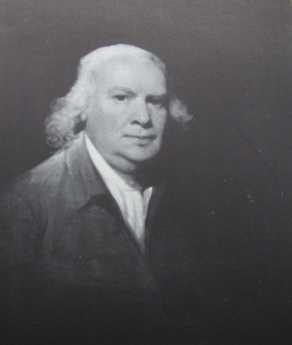 Robert Morris knew that credit is only extended to someone with a reputation for paying his bills.
Robert Morris knew that credit is only extended to someone with a reputation for paying his bills.
What Is the Purpose of a National Constitution?
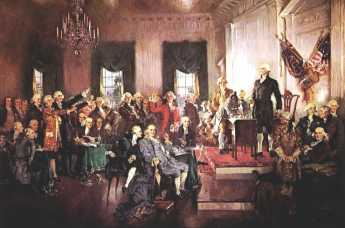 The primary purpose of any Constitution is of course survival. Usually, but not invariably, that means avoiding war with a neighbor which will surely beat you. Having stated what ought to be obvious, the framers of a Constitution need to be careful of the reasons which originally caused the new state to be formed, and also need to avoid provisions which would cause trouble by inciting some different type of governance. These features can be enumerated, but are easily forgotten.
The primary purpose of any Constitution is of course survival. Usually, but not invariably, that means avoiding war with a neighbor which will surely beat you. Having stated what ought to be obvious, the framers of a Constitution need to be careful of the reasons which originally caused the new state to be formed, and also need to avoid provisions which would cause trouble by inciting some different type of governance. These features can be enumerated, but are easily forgotten.
Constitutionality of the Monetary System
 The Constitution fails us when no one is certain what to do about an important issue.
The Constitution fails us when no one is certain what to do about an important issue.
Causes of the 2007 Crash: Political and Technological
 After 4 years, we are gradually piecing out the causes of the second great crash. It seems two main causes were government subsidies of cheap housing in one form or another, and the impaction of computers on banking.
After 4 years, we are gradually piecing out the causes of the second great crash. It seems two main causes were government subsidies of cheap housing in one form or another, and the impaction of computers on banking.
Black Swans (Financial Variety)
 How many financial crises can be understood as "Black Swans" if we regard a financial Black Swan as a case of constrained energy kinetics?
How many financial crises can be understood as "Black Swans" if we regard a financial Black Swan as a case of constrained energy kinetics?
Macroeconomics of The 2007 Collapse
 Securitization: Pass the Hot Potato
Securitization: Pass the Hot Potato
 Securitization of home mortgages is a generally good thing, but it has one major flaw. Unless we somehow fix it, it will fix us.
Securitization of home mortgages is a generally good thing, but it has one major flaw. Unless we somehow fix it, it will fix us.
HowTo Create A Subprime Derivative
It's easier than you thought
What's a Repo?
 With a dozen small variations, repurchase agreements are a new and streamlined way to make short loans in big volume. Bear Stearns dominated the repo market for hedge funds but the volume got too big to manage when interest rates shifted.
With a dozen small variations, repurchase agreements are a new and streamlined way to make short loans in big volume. Bear Stearns dominated the repo market for hedge funds but the volume got too big to manage when interest rates shifted.
Novation
 Here's an obscure legal term at the heart of a sixty trillion dollar perplexity.
Here's an obscure legal term at the heart of a sixty trillion dollar perplexity.
Steep Yield Curve: A Useful Subsidy?
The interest rate curve is a subsidy to banks, just as surely as farm price supports are subsidies to farmers.
The Cause of the Subprime Crisis
Things you suspected but kept to yourself
How Should We Reform Real Estate Finance?(1)
 Of course, first comes damage control. Soon afterward, any crisis presents a political opportunity to reform -- or, to make matters much worse.
Of course, first comes damage control. Soon afterward, any crisis presents a political opportunity to reform -- or, to make matters much worse.
How Should We Reform Real Estate Finance?(2)
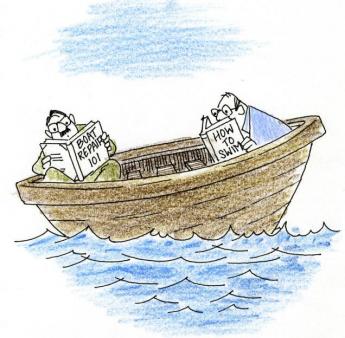 When the ship springs a leak, patch the leak. When the storm subsides, fix the hole. When you get back to port, ask why you were ever at sea.
When the ship springs a leak, patch the leak. When the storm subsides, fix the hole. When you get back to port, ask why you were ever at sea.
Securitized Debt: Fumbled, But Magnificent
 Forget about subprime lending, Alt-A, and all that other crooked nonsense. Securitized debt remains one of the great inventions of modern times.
Forget about subprime lending, Alt-A, and all that other crooked nonsense. Securitized debt remains one of the great inventions of modern times.
After a Year of Crisis, Fannie and Freddy Finally Get the Spotlight
 Fannie Fannie Mae and Wall Street's chancy new CDOs are much the same things, only with different sponsors and a few modified features. Important issues are: which model is better, whether continued competition between the two is useful, or whether both should be abolished.
Fannie Fannie Mae and Wall Street's chancy new CDOs are much the same things, only with different sponsors and a few modified features. Important issues are: which model is better, whether continued competition between the two is useful, or whether both should be abolished.
Second Mortgages Want to Be First
 Banks would not normally take sides between first and second mortgages. However, securitization took the first mortgages away from big banks, so they now have an incentive to seek political favor for second mortgages.
Banks would not normally take sides between first and second mortgages. However, securitization took the first mortgages away from big banks, so they now have an incentive to seek political favor for second mortgages.
Commercial Credit Sinks Globalization
 The financial world woke up to the housing bubble in August, 2007. As a consequence, global trade came to a sudden halt a year later. How's that, again?.
The financial world woke up to the housing bubble in August, 2007. As a consequence, global trade came to a sudden halt a year later. How's that, again?.
Bank Accounting Off the Books
 Recent waves of mergers, one-bank holding companies, and subsidiaries have tangled the assessment of losses in the credit crisis, slowed the acknowledgment of losses, had an inflationary effect, and the appearance of illegality in an environment of blame seeking.
Recent waves of mergers, one-bank holding companies, and subsidiaries have tangled the assessment of losses in the credit crisis, slowed the acknowledgment of losses, had an inflationary effect, and the appearance of illegality in an environment of blame seeking.
High Oil Prices and The Federal Reserve: Chicken or Egg?
 The price of oil has gone through the roof. Will it go higher, or crash? Either way, is that good or bad?
The price of oil has gone through the roof. Will it go higher, or crash? Either way, is that good or bad?
Fixing the Financial Mess
 Three general approaches to preventing financial disasters seem to be available. They are not exclusive; a combined approach may be required.
Three general approaches to preventing financial disasters seem to be available. They are not exclusive; a combined approach may be required.
Federal Reserve Rolls the Dice
 When Lehman Brothers collapsed, the markets froze. The Federal Reserve responded by doubling the money supply. A few months later, the money was gradually spent buying toxic assets. It may take ten years to sell that toxic paper, and whether we then have inflation or depression will depend on the price they bring. The Chinese are financing this ten-year gamble with two-year loans.
When Lehman Brothers collapsed, the markets froze. The Federal Reserve responded by doubling the money supply. A few months later, the money was gradually spent buying toxic assets. It may take ten years to sell that toxic paper, and whether we then have inflation or depression will depend on the price they bring. The Chinese are financing this ten-year gamble with two-year loans.
U.S. and E.U. Exchange Experiences (1)
 The European Union follows the American example. ...
The European Union follows the American example. ...
Compromise Outside the Borders of a Debate
 .....Break a deadlock by seemingly unrelated trade-offs.
.....Break a deadlock by seemingly unrelated trade-offs.
Lowering the Taxes on Corporations
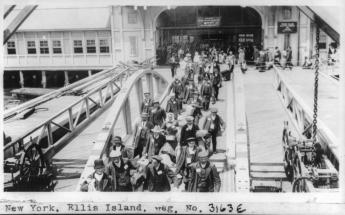 When Ireland lowered corporate taxes, inviting corporate immigration, and then precipitating an international financial crisis, it drew attention from others. Instead of warning them, it encouraged them to imitate Ireland.
When Ireland lowered corporate taxes, inviting corporate immigration, and then precipitating an international financial crisis, it drew attention from others. Instead of warning them, it encouraged them to imitate Ireland.
Breaking the Buck
 Several years after the financial crash of 2008, the question is raised whether money-markets might have played an unsuspected role. If so, what should be done about it?
Several years after the financial crash of 2008, the question is raised whether money-markets might have played an unsuspected role. If so, what should be done about it?
Bernanke's QE3: A New Titanic, or A New Bretton Woods?
 Ben Bernanke is crossing Niagara Falls on a tightrope.
Ben Bernanke is crossing Niagara Falls on a tightrope.
Why Jefferson Hated Banks and Hamilton Loved Them

Restoring the Gold Standard by Levering Judges' Salaries
 Advocates of a gold standard may just have found an effective "gotcha".
Advocates of a gold standard may just have found an effective "gotcha".
Thieves of Baghdad
 American troops recovered most of the antiquities looted from the Baghdad Museum, tracing many of them through the international black market. The museum turns out to have been secretly a private treasury.
American troops recovered most of the antiquities looted from the Baghdad Museum, tracing many of them through the international black market. The museum turns out to have been secretly a private treasury.
Cyprus Tests the Limits of Paper Money

Gold Standard Substitutes
 The monetary crisis which continues since 2007 keeps financiers searching for a better monetary system.
The monetary crisis which continues since 2007 keeps financiers searching for a better monetary system.
Rescuing International Finance?
 On November 15, 2008, the world financial managers are meeting, either to resolve the whole currency mess -- or to plunge us into unimaginable chaos.
On November 15, 2008, the world financial managers are meeting, either to resolve the whole currency mess -- or to plunge us into unimaginable chaos.
Proposal: A Second Federal Reserve
 Henry Kaufman recently made a number of wise observations about the monetary situation, followed by a radical proposal that might be rather hard to implement.
Henry Kaufman recently made a number of wise observations about the monetary situation, followed by a radical proposal that might be rather hard to implement.
Financial Institutions of the Future
 Impending financial crisis has pushed everything else off the front page. But looking backward may show where we are likely going.
Impending financial crisis has pushed everything else off the front page. But looking backward may show where we are likely going.
Banks: Fragile and Dangerous
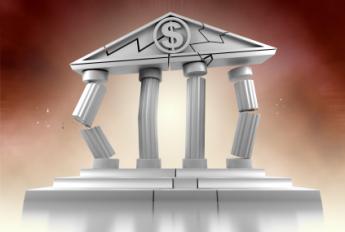 Any business can fail, but when banks fail there can be a panic. Every decade or so, America has a bank panic.
Any business can fail, but when banks fail there can be a panic. Every decade or so, America has a bank panic.
Deficits Don't Matter When Your Party Is In Power
Krugman channels Cheney
Franklin's Admirers on TV
 The author finds himself on television, and wonders whether c-span is a variant of blogging. From that, we go on to question whether Franklin really liked the French.
The author finds himself on television, and wonders whether c-span is a variant of blogging. From that, we go on to question whether Franklin really liked the French.
GIC in Paris
 The Global Interdependence Council (GIC) visited the Banque de France in May 2008.
The Global Interdependence Council (GIC) visited the Banque de France in May 2008.
Milton Friedman on Capitalism
Milton Friedman responds to Phil Donahue's question about the plight of the millions of disadvantaged people in the world.
Merrill Lynch Illuminates the Mortgage Crisis
 John Thain seems to have bitten the bullet at Merrill Lynch, illuminating one piece of the puzzle of our current crisis. But it's probably only one piece.
John Thain seems to have bitten the bullet at Merrill Lynch, illuminating one piece of the puzzle of our current crisis. But it's probably only one piece.
The Trigger and the Cliffhanger
 It was inevitable that someone would pull a trigger, and market gossip is now shaking loose who actually did. The cliffhanger to come is the insolvency of Fannie and Freddy.
It was inevitable that someone would pull a trigger, and market gossip is now shaking loose who actually did. The cliffhanger to come is the insolvency of Fannie and Freddy.
World Finance, Columbus Day 2008

TARP Demands But Does Not Create a New Standard of Fair Value
 The recovery plan, which Congress must pass after only a few days consideration, insists on a new definition of value which may be impossible to achieve.
The recovery plan, which Congress must pass after only a few days consideration, insists on a new definition of value which may be impossible to achieve.
Taking Risks Demands Its Price
 For a few days in August 2007, no one knew why financial markets were suddenly in a jumble. After a week it became clear, risk spreads had been too narrow and were reverting to normal. It would be painful.
For a few days in August 2007, no one knew why financial markets were suddenly in a jumble. After a week it became clear, risk spreads had been too narrow and were reverting to normal. It would be painful.
Securities Trading Across Time Zones
 Closing the securities markets for any reason causes disruptions. Patchwork solutions are often devised. But continuous global 24-hour trading is an idea which conflicts with the need for everybody to get some sleep.
Closing the securities markets for any reason causes disruptions. Patchwork solutions are often devised. But continuous global 24-hour trading is an idea which conflicts with the need for everybody to get some sleep.
Buying Corporate America with Cheap Money
 Threat of recession-induced America to reduce interest rates, and thus to cheapen the dollar. The rest of the world seizes the opportunity to buy huge American corporations on the cheap.
Threat of recession-induced America to reduce interest rates, and thus to cheapen the dollar. The rest of the world seizes the opportunity to buy huge American corporations on the cheap.
Federal Reserve Changes Its Business Model
 On March 16, 2008, the Federal Reserve stepped in to stop an impending bank panic. It also changed the rules of the game, rather significantly.
On March 16, 2008, the Federal Reserve stepped in to stop an impending bank panic. It also changed the rules of the game, rather significantly.
Premature Solutions to the Credit Crisis of 2007
 Proposals for reforms which would prevent another credit crunch are starting to surface. Even in a presidential election campaign, people are pretty hesitant to suggest dramatic reforms. At least, once said Hippocrates, please don't make things worse.
Proposals for reforms which would prevent another credit crunch are starting to surface. Even in a presidential election campaign, people are pretty hesitant to suggest dramatic reforms. At least, once said Hippocrates, please don't make things worse.
Linking Oil Prices to the Credit Crisis
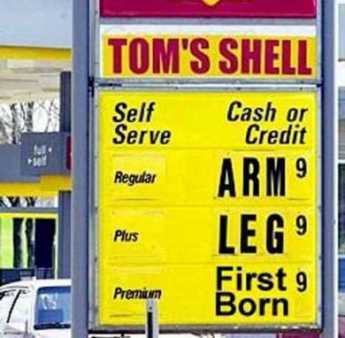 For a while it seemed we had two unrelated crises at the same time, a housing crisis, and soaring oil prices. The two may be the same thing.
For a while it seemed we had two unrelated crises at the same time, a housing crisis, and soaring oil prices. The two may be the same thing.
OUR NICE HOUSING BOOM COLLAPSES
 Politicians will assign blame for the housing boom-and-bust, but they should look at themselves. Which is worse, "red-lining" or "stupid loans"?
Politicians will assign blame for the housing boom-and-bust, but they should look at themselves. Which is worse, "red-lining" or "stupid loans"?
2008 -- A Time to Reflect
 Let's hope it's just a bump in the economic road. But worry about the price of oil and the cost of houses. And ponder the collision of banks and investment banks.
Let's hope it's just a bump in the economic road. But worry about the price of oil and the cost of houses. And ponder the collision of banks and investment banks.
Stress Tests for the European Union
 Ending the Cold War in 1989 may have generated an unexpected obstacle to European unification.
Ending the Cold War in 1989 may have generated an unexpected obstacle to European unification.
Barnes Foundation -- Drawing a New Moral
 Inflation makes for a new slant on the saga of the Barnes Foundation.
Inflation makes for a new slant on the saga of the Barnes Foundation.
Minimum Wage Fangdoodle
 While no one was looking, mandating a minimum wage turned into a contrivance to maintain low-interest rates.
While no one was looking, mandating a minimum wage turned into a contrivance to maintain low-interest rates.
Replacing the Gold Standard
If you don't like the gold standard and are uneasy about no currency backing at all -- just what would you choose as a way to back the currency?